

Average Weight Of A Travel Trailer (With 35 Examples)
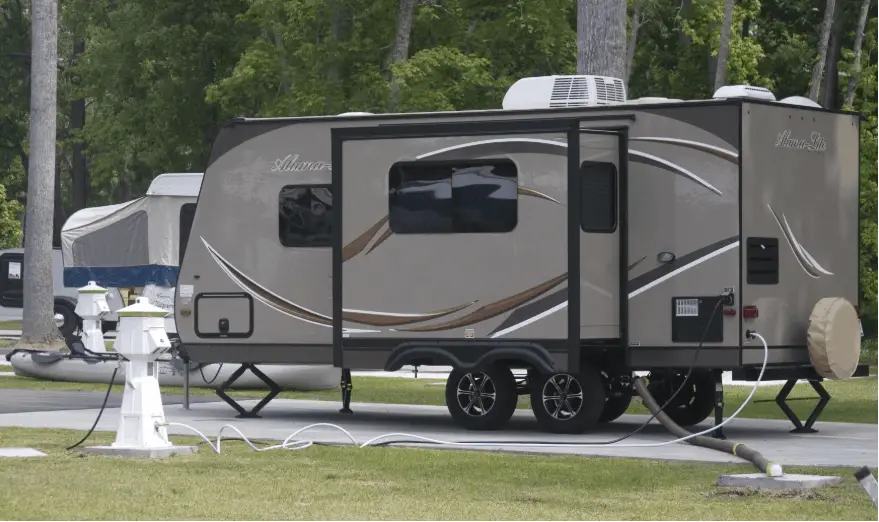
- BEGINNERS GUIDE
G. Yoganand
Travel trailer weight is a significant parameter if you are about to buy either a new or used one. So, how much do travel trailers weigh normally? This is an important thing to know if you want to know all options for your car or truck.
The weight of trailer camper is generally mentioned by the manufacturer, but they also mention many other ratings which should not be overlooked.
A trailer weight is not only the weight it carries when build, but will also include all other things you pack in.
Their weight depends on length, and many other factors. Lets see some examples and draw conclusion on the weights of travel trailers or campers.
How much do travel trailer weigh on an average
Many people buy travel trailer due to their cost and size. A travel trailer is very popular option in rv’s. One question that many people often have is how much do the travel trailers weigh.
Travel trailer weight varies widely and on an average it is between 1000 lbs to 8800 lbs.
Most of the popular travel trailer have lengths between 15 feet to 35 feet.
Comparing several travel trailers and their wights below is the average weight of travel trailer for different lengths.
The weight of travel trailer depends on the size or length. When understating the weight parameters in pounds there are multiple thing that you should understand rather then just going by the weight called out by the dealer in manual.
In this post, we will see average weight of travel trailers and various other terminologies related to travel trailer weight.
Understanding the weigh of a travel trailer is important because you are supposed to pull it using a car or suv.
A car will have certain limit and if your trailer exceeds that limit then that could be a problem. Towing a trailer initially can be tough but following the tips that i gave in my previous article can make it super easy, do check it out.
When you head out for camping, you end up packing lots of things and with a full gas tank plus a full water tank, will mean lots of weight. Thus, it becomes more important that you have fair idea of where the weight is heading. Apart from understanding the dry weight of travel trailer, get a fair idea of other weights related to it.
In case, you want to know how to find dry weight , do check linked detailed guide.
A hitch should also be good enough to handle the overall weight. Also, with a rv, you are supposed to follow certain rules related to weight. Once you cross certain weight limit even the drivers license requirement change in some states.
Read : 17 Tips to reduce RV Weight
One thing many people try to check is if they can find smaller travel trailer that have less weight. A smaller less weight travel trailer lets you pull it easily.
We will also see how travel trailer weight varies by length. Once you have that idea, it can be helpful to determine the approximate weight based on length.
Travel trailer weight variation on the basis of length
Main reason why people want to know about the weight of their travel trailer is to determine if their car or truck can tow the trailer or not. A travel trailer has length that ranges from 17 feet to 40 feet.
More the length, more is the weight of travel trailer. A 15-18 feet travel trailer will obviously weigh less than a 30 feet one. That is to say, we can almost say that weight of the travel trailer is proportional to its length. This however, may not be always be correct as with new models, construction type material the weight is varies.
New year models released and built are less heavy and thus, we can also say weight is inversely proportional to year make of the travel trailer. On an average a 16 feet length travel trailer will have a unloaded weight of around 2200 lbs to around 3400 lbs. A 30 feet travel trailer can weigh around 7000 lbs to 7800 lbs.
This may however, be not true for all makes and brands, it will always vary. But, on an average you will find the numbers to be very close. A 20 feet travel trailer can be as heavy as 2700 lbs to 2900 lbs. With advances in the way travel trailers are manufactured, you will also find a 15 feet travel trailer weighing just above 1500 lbs unloaded or even an 13 feet long travel trailer weighing below 1200 pounds.
Travel trailer are smaller rv’s, they sleep 2-3 people at times and can also be lengthy about 40 feet long. A travel trailer weight also depends on the floor plan, kind of dinner built in, position of the bath, kitchen positioning, entry exit doors, window positioning, bed style (this things require changes, adjustments then lead to weight variations).
How much do small travel trailers weigh
Lets see some examples of travel trailers along with their weight and length. This should give a fair idea of relation between length and weight of a travel trailer. These are some of the smaller travel trailer that are popular under the weight of 4000 pounds.
- Forest River Flagstaff E-Pro 12RK – 11 feet long and weighs around 1150 lbs
- ALiner Ascape camp travel trailer – 13 feet long and weighs around 1495 lbs
- Forest River Flagstaff E-Pro 14FK – 14 feet long and weighs around 2010 lbs
- ALiner Ascape plus travel trailer – 13 feet long and weighs around 1150 lbs
- KZ Sportsmen Classic 130RB travel trailer – 15 feet long and weighs around 2126 lbs
- ALiner Ascape MT travel trailer – 13 feet long and weighs around 1170 lbs
- ALiner Ascape ST travel trailer – 13 feet long and weighs around 1575 lbs
- Forest River Flagstaff E-Pro 16BH – 18 feet long and weighs around 2870 lbs
- KZ Sportsmen Classic 150BH travel trailer – 17 feet long and weighs around 2260 lbs
- Forest River Flagstaff E-Pro 17PR – 20 feet long and weighs around 3160 lbs
- KZ Sportsmen Classic 151RB travel trailer – 18 feet long and weighs around 2530 lbs
- Forest River Flagstaff E-Pro 17RK – 20 feet long and weighs around 2930 lbs
- KZ Sportsmen Classic 180BH travel trailer – 20 feet long and weighs around 2620 lbs
- Forest River Flagstaff E-Pro 19FBS – 20 feet long and weighs around 2960 lbs
- Jayco Hummingbird 16FD travel trailer – 18 feet long and weighs around 2535 lbs
- KZ Sportsmen Classic 160QB travel trailer – 22 feet long and weighs around 2740 lbs
- Jayco Hummingbird 16MRB travel trailer – 19 feet long and weighs around 2780 lbs
- Forest River Flagstaff E-Pro 19FD – 20 feet long and weighs around 2825 lbs
- Jayco Hummingbird 17BH travel trailer – 19 feet long and weighs around 3015 lbs
We can determine a fair idea of weight based on travel trailer length. But that may not be always true. A length cannot be the ultimate decider to figure out the exact weight of a travel trailer, as seen from examples a 20 feet long travel trailer (of not only different make, but even same brand) weighs differently. Thus, it also depends on the floor plan, amenities and many other things packaged in the trailer.
How much do longer travel trailers Weigh
As we already saw a longer travel trailer will weigh much more and it is almost proportional to its length. A 40 feet travel trailer will have enough weight to make you think if the car you have, is good enough to pull it or not.
Even a 25 feet or 30 feet long travel trailer is much heavier and you need to be sure about the capacity of your pulling car. Lets see some of the examples to understand better and draw some conclusion on length-weight relation for heavier travel trailers.
Examples here in are also some of the best travel trailers you could buy in the range of 28 feet and 30 feet with weights under 5000 pounds and so on. While some are quoted just to see how the best and average travel trailers weigh in different segments of lengths.
- Keystone RV Passport 175BH Express travel trailer – 22 feet long and weighs around 3250 lbs
- Keystone RV Passport 195RB Express travel trailer – 23 feet long and weighs around 3805 lbs
- Forest River RV Flagstaff Classic Super Lite 831CLBSS travel trailer – 35 feet long and weighs around 8105 lbs
- Forest River RV Flagstaff Classic Super Lite 832FLBS travel trailer – 35 feet long and weighs around 8621 lbs
- Keystone RV Passport 195RBWE Express travel trailer – 23 feet long and weighs around 3812 lbs
- Keystone RV Passport 2200RBWE Grand travel trailer – 25 feet long and weighs around 3805 lbs
- Forest River RV Flagstaff Classic Super Lite 831BHDS travel trailer – 34 feet long and weighs around 7970 lbs
- Forest River RV Flagstaff Classic Super Lite 31BHWSS travel trailer – 34 feet long and weighs around 8386 lbs
- Keystone RV Passport 234QBWE Express travel trailer – 25 feet long and weighs around 3870 lbs
- Keystone RV Passport 239ML Express travel trailer – 25 feet long and weighs around 4140 lbs
- Prime Time RV LaCrosse 2911RB travel trailer – 31 feet long and weighs around 6516 lbs
- Prime Time RV LaCrosse 318BHS travel trailer – 36 feet long and weighs around 8022 lbs
- Keystone RV Passport 2400BH Grand Touring travel trailer – 28 feet long and weighs around 4840 lbs
- Keystone RV Passport 2670BH Grand Touring travel trailer – 30 feet long and weighs around 5344 lbs
- Prime Time RV LaCrosse 324RST travel trailer – 37 feet long and weighs around 8334 lbs
- Prime Time RV LaCrosse 329BHT travel trailer – 37 feet long and weighs around 8815 lbs
From the examples we could see that a 26 feet long travel trailer on an average weighs around 3800 lbs to 4150 lbs . A 28 feet long travel trailer weighs in the range of 4300 lbs – 4900 lbs. A travel trailer between the length of 32 feet to 38 feet weighs 7200 lbs – 8500 lbs .
This should be enough to paint a fair idea of how a length of travel trailer is related to its weight. But, the weights are unloaded weights and should not be confused with the overall weight of travel trailers
Understanding the travel trailer weight terminology
A travel trailer weight or weight of any other rv need to be understood correctly. The numbers that you get from the manufacturer or dealer could be misleading and misunderstood.
The weight details of various sized travel trailers that we saw are the unloaded weights. You basically need to do the math properly to see if the travel trailer weight is within limits for your car to pull.
Weight understanding in case of travel trailer is much more important than motorhomes which drives themselves (which is not the case for travel trailer or fifth wheel or pop up campers or any other towable trailers). Its important you understand the rv weight terminology .
A rating provided by manufacturer cannot be changed. Normally weight and load are same when you talk weight of rv’s. Basically, a weight of rv puts load on rv tires, axles and hitches.
This load is used to calculate various rating like GAWR (gross axle weight Rating), GCWR (gross combination weight Rating), GVWR (gross vehicle weight Rating). Lets, try to understand what exactly these things mean and how you should interpret values for these.
Gross Axle Weight Rating (GAWR) – This rating basically is the maximum load that the axle of the trailer can support. Trailer manufacturer provides this rating and it basically depends on axle, tire, wheels and the rating is based on the weakest link.
Unloaded Vehicle Weight (UVW) – This is the weight of the RV or travel trailer when it is fully unloaded without any extra things on it. Usually the weight that you see when it is at the dealer and not yet sold.
The weights that we saw above were unloaded weights. Most times people are confused with this weight, and assume the unloaded weight as the final towing weight. But, in reality the weight increases when you actually pull the trailer with all the things packed in.
Gross Vehicle Weight Rating (GVWR) – This rating means the maximum weight that is allowed on the RV including all the things like the passengers, driver, water, fuel. The trailer and the towing vehicle will both have their own GVWR.
Gross combination Weight rating (GCWR) – Unlike GVWR, the GCWR is the combination rating for both the trailer and the towing vehicle. It gives the maximum combined limit for the tow vehicle and the travel trailer.
Cargo carrying capacity (CCCC) – This basically means the weight of the trailer without the optional accessories, equipment in the trailer.
Net carrying capacity (NCC) – This is the weight of all own or personal things included on the trailer or rv. For example, the combined weight of fuel, water, food, gas, equipment tools etc
Sleeping Capacity weight rating (SCWR) – This basically gives the maximum weight limit depending on the number of sleeping positions designated by manufacturer. Each included person is assumed to be around 154 lbs and thus, a 2 sleeping travel trailer will mean its SCWR will be 208 lbs and so on.
Importance of Weight distribution in travel trailer
In case of travel trailer, the weight distribution is significant. An un-even weight distributed can be dangerous and the towing hitch and the trailer can be impacted.
You need to make sure the overall weight is properly distributed. The idea is to make sure weight is properly distributed along all sides, front to back and from both right and left sides.
Rv’s and travel trailer are originally designed with proper weight distribution, and when you tow the travel trailer you need to follow same when putting in more weight through other things.
The weight of both the tow vehicle and travel trailer should be properly distributed. Technically speaking, you also need to make sure the Gross Vehicle weight Rating and gross combined vehicle weight rating is not crossed at any time.
To understand the proper rules of weight distribution, you can read the manufacturer provided manual for your travel trailer or camper.
In most cases, the idea is to keep 60% of the weight ahead of the center of gravity of the travel trailer. To understand the correct weights of your travel trailer, its better to weigh it after it is fully loaded with all stuff.
An uneven distributed weight is notable with naked eyes, but may not always be visible hence its better to keep the weight within limits and properly distributed.
One can also use weight distribution systems to make it properly distributed. Weight distribution systems work using spring bars which correct uneven weight distribution.
What affects Weight of travel trailer – which things put on extra weight
Lets try to understand how the weight of the travel trailer is affected. What all things put on that weight.? An unloaded weight will be less but when you head out finally, the weight of the overall travel trailer could go out of limits and that’s what we should try to limit.
Water – Camping need lots of water. And water adds weight to your travel trailer ? yes, do not underestimate the power of water weight. It weighs almost 8 lbs per gallon. A 50 gallon water in a travel trailer will mean you already have put on 400 lbs extra on travel trailer.
Generator – A generator is a necessary thing in you rv. You get portable generators that weigh less but even then, they can be best weighted at 300-400 lbs and that is much to add to the limited capacity travel trailer.
More watts will generally mean more weight for the generator. Thus, getting the right size generator can be a wise thing to do. But, it may not be a simple calculation for many of us and that’s why i wrote this detail guide on how to choose the right size generator for your RV (You AC is mostly the deciding factor, check out how!)
Construction material affects weight – A travel trailer construction material type is also responsible for its weight. A fiberglass made trailer generally weigh less as compared to aluminum ones.
This however, should not be your problem as this will be included in the unloaded weight which is not in your hands anyways. But, understanding the material type of your travel trailer can be helpful as choosing the right one will mean your travel trailers unloaded weight itself is less.
Slide outs Increase weight – A slide out for your rv increases the overall weight. Its extra space but extra weight too. A slide out normally adds upto 1000 lbs on an average. Pop up are less heavy and that can be a good option as compared to slide outs if you are looking to reduce the overall weight on your travel trailer.
Read : Weight Holding capacity of Slide Out in RV
How to reduce weight on your travel trailer – tips to stay light
Weighing your rv often is the best thing you could do (in case you are confused on how to weigh your rv, here is a article that i posted about it). Regularly checking the weight helps to plan and you will stay within the rating limits. Lets see some of the things you could follow to reduce the weight and stay in limits
1. Get rid of extra things on your rv. Extra tools, extra equipment, unused personal belongings like shoes, clothes, books etc. Unused kitchen items, bedroom, bathroom accessories you don’t use more often should be kept out. All smaller things add up to put on those pounds which add-on to become a big number.
2. Weigh the travel trailer separately with car and without car. This gives great picture of what is happening and where the weight is distributed.
3. Get good weight distribution system to make sure weight is properly distributed.
4. While heading out for camping make sure you pack things which are absolutely needed and do not pack out of limits
5. Have only number of people allowed as per manufacturer manual. A human weight of around 150 lbs can be more than enough to cause the imbalance of weight distribution
6. Make sure tires are properly inflated. Maintain correct tire pressure for both travel trailer and car at all times.
7. Use aluminum in case you want to do any repairs or modifications to your travel trailer. Aluminium is light weight and thus will not put on extra weight on your travel trailer. Many times, people do patch work like filling in holes, cracks or structural changes to the travel trailer. All these smaller things should be done with materials that are less in weight and should not add on weights.
8. Get rid of things that are not in use for months or have become old. A ladder that you hardly need, an awning that is broken or things like kayak that you occasionally need. Remove things that you don’t use often or things of past that need replacement, just go ahead and replace them. This will not only save space but also reduce the unnecessary weight.
9. Get the sliding doors replaced with curtains. Doors that aren’t used for privacy and are in place just, can be removed and replaced with curtains or any other such fabrics used instead of heavy doors.
10. Replace old heavy things with new lightweight ones. Drawers, bins, shelving that are heavy and old, could be putting in weight unnecessarily and you should try and get things that are new and less in weight. You will find lots of innovative products specially designed for RV that are compact and lightweight.
Travel trailer weight comparison with Other Rv’s (Class C RV and class A RV)
A mini motorhome or a class C rv on an average weighs around 10,000 lbs to 14,000 lbs. That is almost double than an average weight of a travel trailer.
Class C motorhome are also longer than travel trailers, they tend to be around 18 feet – 30 feet long. Class A motorhomes on the other hand are the heaviest ones, they weigh much more.
On an average class A rv’s weighs anything between 15,000 lbs to 30,000 lbs. They are really heavy, and much more than a travel trailer. With so much weight they tend to intimidate you on road. Remember, with weight also the license requirement changes.
Read : How much weight RVs roof are capable to support
There is limit on weight up-to which you can drive using normal non commercial license but if the weight goes beyond certain limit then you need special license.
The rule of weight is different for all states. Like in California, a weight more than 26,000 lbs for a non towable RV will need a class B Non commercial license. Most states have similar requirement but could be little different for some states (need to check with each states rules and regulations).
A travel trailer to be towed has a weight limitation of around 10,000 lbs in most states and beyond that you will need class B Non commercial license. Looking at these numbers of pound for travel trailer, most of the times you will be okay with the normal license unless you have that very big trailer weighing more than 10,000 lbs.
If you are ready to tow your travel trailer and start the RV adventure then do start by getting all the essentials for your trailer (this is a complete list that you will need)
A travel trailer weight measurement is of much importance since it has the power to affect many other things in the camper trailer.
Apart from getting to know just the unloaded weight of the trailer, knowing all the other ratings help in towing car-trailer system smooth. A travel trailer weighs less as compared to other bigger rv’s however it is more important to know the weight in case of travel trailers. A travel trailer weight unloaded should not be your only way of judging the capacity of your car to tow.
Understanding overall weight when fully loaded and with full water/fuel tanks is more necessary. Going through manufacturer manual, weighing your trailer often are best practices to follow.
Keeping the travel trailer as light as possible can come good for your towing car or suv. Keeping the weight distribution proper is also important and proper hitches or distribution system can come handy. One should fully understand the towing capacity of the car and then manage the weight on travel trailer. Owning a very heavy trailer also needs special license requirements and thus better to make sure the weight is within limits.
You Might Also Like

4 Easy Ways To Secure RV Surge Protector

RVing with kids – 7 things you should know

11 Things You Should Know About RV Living

18 Do’s and Don’ts of RV Camping

How Much Do Travel Trailers Weigh? (Camper Weight Chart)
If you’re planning on towing a travel trailer, you’ll want to know how much weight you can expect to be hauling. This information isn’t strictly for bragging rights—you need to be sure that your truck or SUV will be able to handle the load.
So, how much do travel trailers weigh, exactly? Don’t worry if you’ve never given the matter any thought before.
There are a few basic rules of thumb that will make it easier for you to calculate the weight of your travel trailer , whether it’s a new purchase or an older model that’s coming out of long retirement.
Table of Contents
How Much Do Average Travel Trailers Weigh?
The average weight of most recreational travel trailers is about 5,000 pound s, depending on size . What you’ll want to remember about this equation is that this number refers only to the “dry weight” of the unit.
This means that the weight is measured when the tanks are empty and the unit contains no gear or other incidentals.
If you have a background in construction, this measurement is similar to what’s commonly known as the “dead load” —an immutable base number that doesn’t include goods or inhabitants.
Once the fuel and water tanks are full and the unit is loaded with camping gear (thereby adding the “cargo weight”), you can expect the number to increase.
In general, the camper will weigh about 250 pounds per foot of trailer length, although it can vary depending on the size of the camper and the type of gear you pack. This total is known as the gross trailer weight , or GTW for short.
To make this concept easier to grasp, here’s a guide that uses some of the most popular trailer lengths as examples. Note that the measurements refer to the total box length of the camper, not counting the trailer hitch.
Basic Gear Weight
Most trailers come equipped with 48-gallon freshwater tanks. Since water weighs in at about eight pounds per gallon, a full tank will add nearly 400 pounds to the weight of your trailer.
When making your calculations, assume that the water tank will be full at all times (even though it obviously won’t be). This will help you to err on the safe side and avoid putting too much stress on the vehicle.
Larger camper trailers can obviously accommodate more gear, but that’s no reason to go overboard. You can expect to add at least 500 pounds of gear to the GTW ( gross trailer weight ) even if you stick to the basics.
Don’t be tempted to overload the trailer just because you have more space. When it comes to camping, it’s always best to err on the lighter side.
Understanding Dry Hitch Weight
You might also come across the term “dry hitch” weight, and be surprised at how low the number is compared to the total weight of the travel trailer.
That’s because it refers to the amount of weight that’s put on the trailer ball itself—usually about 10 percent of the trailer’s dry weight.
For example, if you’re towing a 26-foot trailer, you can expect the dry hitch weight to be between 500 and 550 pounds.
Towing Capacity Breakdown
How to tell if your vehicle can handle the weight.
Since we’ve already discussed the importance of finding the (GTW) gross trailer weight versus the dry weight , you’re off to a good start.
The next step is to find your vehicle’s towing capacity or gross vehicle weight rating. Some larger trucks and SUVs might have this information listed on the VIN sticker (usually found just inside the front driver’s side door).
Here is a great tool you can use to find the specifics on your vehicle.
Note: You don’t necessarily need a truck or SUV in order to haul a trailer. Some cars and crossover models are equipped with tow hitches as well.
Tip: Just follow the directions listed above to make sure the vehicle can handle the weight of your camper before you head out.
Here is a video for further help with finding the vehicle’s weight ratings.
Other Considerations
Here are a few other things to keep in mind when it comes to towing a travel trailer:
- You should keep in mind that you should never exceed whatever is the lowest-rated component of your towing setup. This will be the weakest link and can cause issues.
- If possible, invest in a truck with a diesel engine if you’re planning on towing a heavy camper often. Since these engines are built for towing, you’ll get much better mileage, but this only makes sense depending on travel trailer weight.
- Learn to spot the difference between wooden and aluminum frames. Wooden ones are distinguished by thick stripes on the exterior of the camper and add a significant amount of weight. Campers with aluminum frames will feature a smooth exterior and sleek design.
- If you can’t locate any information about your camper’s dry weight, take it to a roadside scale to get a reading. It’s imperative to keep the total weight below the vehicle’s maximum towing capacity or gross vehicle weight rating; otherwise, you could risk damaging the transmission.
Best of luck, and happy camping!
Checkout our article on: Ultra Lightweight Travel Trailers Under 2000 Pounds
Please keep in mind that we may receive commissions when you click our links and make purchases. However, this does not impact our reviews and comparisons. We try our best to keep things fair and balanced, in order to help you make the best choice for you.
As an Amazon Associate, I earn from qualifying purchases.

No products in the cart.

The Best Length for a Travel Trailer (Size Chart Included)
NOTE*** The content on this page may contain affiliate links, we may make a commission. And, as an Amazon Associate, we earn from qualifying purchases. More information: disclosure page .
Just in the last decade, I have owned, rented, and sold a number of travel trailers. I have my own share of experience with the different lengths and sizes of RVs. In this article, we get into the different travel trailer sizes and include a travel trailer size chart for you.
What size travel trailer should you buy?
Generally speaking, the ideal travel trailer length for a family of 4 is 25-30 feet long. With a 27-foot travel trailer, you can likely park in your driveway, camp at 93% of national parks, and still have room to sleep 4-6 people comfortably.
Generally, for convenience, longer travel trailers are the best choices for a family with at least 4 members or more. However, there are roads and campsites that have limits on the lengths that they can accommodate.
I have personally experienced the benefits and drawbacks of traveling in different lengths of trailers. So I made this article in the hopes of helping you determine which is the best length for a travel trailer for you. It can also serve as a guide so you can rule out the other sizes that you know won’t work for you.
No matter how long your trailer is you need to see behind you. Campsites can be tight and have obstacles (like kids). A wireless backup camera makes life so much easier .. and safer. This wireless camera on Amazon is easy to install, budget-friendly, and best for shorter trailers ( check price here )
Longer trailers and especially with metal siding will need a wired backup camera. This takes a little longer to install but you can still do it yourself. We suggest this wired backup camera on Amazon .
Best Size Travel Trailer by Length
Some will say that anything above 30 feet is too long for a travel trailer. But the truth is that the answer to whether a travel trailer is too long lies on your tow vehicle.
As a rule of thumb, the longest trailer that your tow vehicle can pull is the one that does not exceed 75% of the maximum loaded weight of your vehicle.
Travel Trailer Size Chart
I put together this travel trailer size chart to help you see the length, weight, and accommodations for travel trailers. This is based on reviewing hundreds of RVs and my own experience.
A big consideration is the number of people in your family. How long does it have to be for you and your family to live in it comfortably?
Travel Trailer Length Based on Camping Preference
Some people report that a travel trailer that is more than 35 feet is a problem when they are looking for a campground to set up base on. Many of the available campgrounds, especially national parks, only have limited and small space.
However, if you own a bigger rig, finding the right campground is possible if you are willing to stay in the vicinity of the sites.
The question will lie in your preferences. Do you plan to camp in National Forests or dispersed campgrounds? If so, then having a long rig will seldom be a problem for you as these campgrounds usually can accommodate longer rigs.
If you prefer to camp in National Parks or small private campgrounds then this might prove to be a slight problem as these campgrounds usually have limits on how long of a rig they can serve.
Read More: 11 Questions You Must Ask to Reserve the Perfect RV Campsite
Pro Tip: Make sure to look into the campgrounds that you plan to stay at. When you are thinking about tight spaces or bumpy roads take into account eh turning radius and hinge point of the trailer.
RV Rental Information
- Motorhome Rental Near Me
- Rent a Travel Trailer
- Pet-Friendly RV rental
- Rent on RVShare
RV Destinations You Will Love
- Places to Camp in Fall
- RV Destinations in October
- Incredible RV Destinations in November
- Places to Camp for Thanksgiving
- Places to Ring in the New Year
- Magical Places to Camp this Christmas
- RV Destinations for December
- Places to Camp in February
- Places to Camp this Spring
- RV Destinations for Spring Break
How to Measure the Length of the Travel Trailer

The length of the travel trailer that your manufacturer specified is the box of the trailer and considered your trailer length. State-run campgrounds and some private ones usually base their site length upon the length of the travel unit itself.
Most often than not, there will be a separate parking space for your tow vehicle.
I own a 35-feet travel trailer. It is specified by the manufacturer as 35-feet. When I call to reserve a campsite, I ask for 35 feet or longer.
However, when going through roads that have length restrictions, you have to make sure to measure the whole length with your tow vehicle.
For example, in Independence Pass near Aspen, Colorado, RVs more than 35 feet in length are prohibited to pass. We have a 35 feet trailer but our total length from the bumper from the front of the truck to the bumper at the back of the trailer is 59 feet. (We know this because we were measured when we took the ferry from Seattle. )
Does Travel Trailer Length Include the Tongue and Hitch?

The trailer length and the manufacture description do not include the tongue and the hitch. The length is only the inside box of the trailer.
If you want to know exactly how long your trailer will be you need to include The rear bumper, any accessories like a bike rack, and the front tongue and hitch. The rear bumper generally adds 6 to 12 inches. The front tongue and hitch add 2 to 3 feet to the length.
So for example my 35-foot travel trailer is 38 feet bumper to hitch. It’s even longer when the bike rack is on the back . When towing it with a truck it is 59 feet bumper-to-bumper.
How Does Length of the Trailer Affect Towing
A longer trailer will move differently behind the truck than a shorter trailer. Both the length and weight of the trailer affect the amount of weight on the tongue and swaying the backend. Most experts agree that a longer trailer is actually easier to tow because it will have a slower delay.
Weight distribution and sway bar will help you tow a trailer. This is the set that I use which is easily installed and works great. Check the price on Amazon.
However, the total radius with a longer trailer will be longer. Therefore your turns will be much wider. In addition, you only to watch the inside corner very carefully for obstacles.
What Are the Disadvantages of a Longer Trailer?
The longer your trailer is, the more difficult it is to look for camps to stay in. Generally, state parks commonly have a length restriction of 35 to 45 feet. However, when your rig is 41 feet or above, you have to expect that you will only be accommodated by less than 10% of the campsites. On the other hand, 98% of campsites can accommodate trailers that are 19 feet and less.
Another disadvantage of a longer travel trailer is the total weight. Once you get up to 30 or more feet and 7 to 8,000 pounds you will need a 3/4 ton or 1-ton truck to tow it.
Pro Tip: Keep in mind that you’re towing capacity will be reduced by up to 20% at altitude and over the mountain passes
A longer trailer has more tail drag in the back end. You will need to be driving on relatively flat roads. So you will be limited to maintained roads and campgrounds. You will not be able to off-road or boondock much.
What are the Advantages of a Longer Travel Trailer
A bigger, longer-length travel trailer has many advantages. A longer camper has more room inside giving you more space to move around. You will also have more privacy. My trailer with 35 feet length actually has 2 separate bedrooms with doors.
Another advantage is the convenience of the space. A smaller camper will need to be spending time changing the inside back-and-forth between living quarters and sleeping quarters. Our first Trailer was a 20-foot long vintage camper with no slide-outs. Every night and every morning we had to transform it back into a table put the bunks away and make the bed back into a couch just to have breakfast.
A longer travel trailer can carry more weight. Once you have a camper you will want to load it up with all your favorite camping gear. You would be surprised how much your toys end up weighing.
In addition, if you are Boondocking he will be also be carrying a full tank of water to your campsite.
A larger trailer also responds to movement when towing more slowly than a short trailer. Some people even say driving a longer trailer is easier than a shorter one. The hinge point at the back of the tow vehicle and the distance to the back end of the trailer is longer. The physics determines how quickly the very back of the trailer responds to small adjustments in the front.
Overall, I never recommend buying an RV before trying out if you like it. You can see all my thoughts here: 17 Undeniable Reasons Why You Should NOT Buy an RV
I advise renting a travel trailer similar to what you are thinking of buying: How Much Does it Cost to Rent a Travel Trailer? (Prices 2022)

Summing up the Ideal Length of a Travel Trailer
The best length for your travel trailer will depend on the needs of your family. If you are traveling long-term and want more space and amenities similar to an apartment, you will require a bigger camper. If you are planning on shorter trips to national parks and sightseeing, a shorter travel trailer will likely work for you.
Before buying a camper I always suggest that you try renting at least one similar to what you’re thinking of buying. Travel trailers are difficult to rent from national companies. However, you can rent from a private owner on Outdoorsy or RVezy .
To rent a camper similar to the one you’re thinking of buying simply go to the Outdoorsy or RVezy website. Once you’re on the website choose the destinations that you would like to pick up the travel trailer. Then from the options choose the number of people that should sleep and your ideal length.
For more resources in renting an RV, read some of our blogs under our RV series:
- 17 Tips to Know for Your First RV trip with Kids
- Questions to Ask Before Renting an RV
- Where the Best Deal on an RV Rental
- How to Reserve the Perfect Campsite Every Time
Similar Posts

7 Expert Tricks to Keep Mice Out of Your RV or Travel Trailer in Winter
Imagine opening up your RV just to de-winterize it, but what you see are mice! Yuck!! That’s me, I learned the hard way. So in this guide, I will give you tips on how to keep mice out of your travel trailer

Earn Money Renting Out an RV on Your Property (Read This First!)
In general, you can rent out your RV on your property if your local laws and neighborhood allow it. Read this article to learn more about renting your RV on your own property.

Do RV Outlets Work On Battery?
RV electrical systems can be somewhat of a mystery. All you want to know is if the outlets will work on battery. We have the answer and a good electrical tutorial here.

Disney Resorts and Theme Parks Around the World
Did you know that Disney has 6 Disney resorts and 12 theme parks around the world? The Disney resorts are Disneyland Resort, Walt Disney World, Disneyland Paris, Tokyo Disney Resort, Hong Kong Disneyland, and Shanghai Disney.

Atlantic vs Pacific Ocean: Which Ocean is Better?
The Pacific Ocean is overall calmer and warmer than the Atlantic, though this is not always the case. Whether you’re heading to the beach with young children or looking for the next wave to catch, your decision could be influenced by several factors.

Can RV Surge Protectors Get Wet? (Caution When Outdoors!)
Damage to your RV electrical systems can be totally disabling. I strongly recommend using a surge protector to protect your RV. You might wonder, are RV surge protectors worth it? What happens if they get wet? I’ll answer all of your questions here.
Leave a Reply Cancel reply
Your email address will not be published. Required fields are marked *
This site uses Akismet to reduce spam. Learn how your comment data is processed .

This post may contain affiliate links or mention our own products, please check out our disclosure policy .
How Much Do Travel Trailers Weigh? [20 Campers Compared]
Published on April 22nd, 2019 by Ray & Tammy Roman This post was updated on October 5th, 2023
Based on our sampling of 20 popular models we estimate the typical travel trailer weight to be 4,384 pounds dry weight and 6,109 pound GVWR (Gross Vehicle Weight Rating). Dry weight means how much the travel trailer weighs without cargo, and all tanks (water, propane, etc.) completely empty. GVWR is the weight you should not exceed once you fill your tanks and add anything else you want to transport inside your camper.
Below is our travel trailer weight comparison table showing 20 of the most popular campers.
Keep in mind that many factors will influence the weight specifications. The longer the camper the heavier it will be. The type of construction will have a significant effect on weight as well as the type of features and appliances inside. Whether or not you have slide outs will affect weight as well.
DON’T MISS OUT ON RV LIVING UPDATES
Sign up for the newsletter today.
Please enter a valid email address.
An error occurred. Please try again later.

Thank you for subscribing to the RV Living newsletter, keep your eye on your inbox for updates.
As stated by Jim over at Camper Report , you can expect on average a camper to weight 250 lbs per foot with tanks filled and your gear. The length does not include hitch length.
Match Your Vehicle Towing Capacity To Your RV Weight
To tow your camper you need to have a vehicle with the right towing capacity. For example, a Toyota Tacoma with a V6 engine and towing package can easily tow a maximum of 6,400 pounds, A Ford F150 can tow up to 8,000 pounds with a towing package.
Most large SUVs can also tow a small travel trailer. The Chevy Tahoe, Ford Expedition and Jeep Grand Cherokee are just three of the ones that can tow a camper pretty well.
In some instances, even a car can tow a travel trailer. However, the travel trailer has to be pretty light. The Happier Campe r is one such camper that can be towed by a car.
Travel Trailer Weight Definitions
When comparing travel trailer weigh you are going to come across several terms that I have defined below.
Dry Weight aka UVW (Unloaded Vehicle Weight) – This weight refers to the weight of the camper as it is shipped from the factory. The UVW does not include any dealer-installed options, cargo, fresh water or LP gas.
Cargo Carrying Capacity aka CCC – To arrive at the Cargo Carrying Capacity you need to subtract UVW, the weight of potable water, including any in the hot water heater, full LP tank weight, and sleep capacity weight rating (154 lbs x number of sleeping positions) from the GVWR. Don’t forget to also subtract any dealer-added options.
Gross Vehicle Weight Rating (GVWR) – This is the maximum weight you should not exceed with cargo, full tanks, UVW, and sleeping capacity weight rating combined. Exceeding this weight limit can potentially void your warranty.
Tongue Weight aka Vertical Load Rating – This is the maximum vertical load that your hitch can carry. Before you start to tow make sure you measure your tongue weight. If it exceeds the weight limit consider moving content toward the rear of the trailer. The opposite is also true. If the tongue load is less than the limit move content forward.
Sleeping Capacity Weight Rating (SCWR ) – This one is new to me as I have never seen it before. To calculate SCWR multiply the number of manufacturers designated sleep positions times 143 pounds.
How Much Do Travel Trailers Weigh? – Related Questions
How much does a pop up camper weigh?
Pop up campers can vary significantly in weight depending on features. For example, a pop-up camper with a kitchen and fridge can weigh as much as 2,000 pounds, whereas a pop up with minimal features can weight around 500-600 pounds empty. Overall you can expect anywhere from 700 pounds to 3,800 pounds depending on box length and features.
How much does a Jayco Pop up camper weigh?
Jayco has one model of pop up campers called the Jay Sport. It weighs from 1,570 pounds dry to 1,895 pounds dry depending on the floor plan. The GVWR for the Jay Sport ranges from 2,250 pounds to 2,750 pounds.
How much do vintage travel trailers weigh?
An example of a vintage travel trailer weight is the 19645 Safeway. IT weights partially loaded 2,320 pounds. This is a 13-foot cabin travel trailer. You can expect a range of 150-200 pounds per foot length of the cabin only.
How much does a 16 foot travel trailer weight?
On average a 16-foot camper may weight 2,000 to 3,500 pounds. Why such a huge range? The weight of the camper is going to vary widely by brand, floor plan, type of construction, slide outs, interior appliances, and construction and dealer-added options.
As you can see by the examples above the weight of a camper can vary significantly. There isn’t one answer that fits all. The same length travel trailer will have different weights depending on how each manufacturer constructs their unit. Materials used (aluminum, fiberglass) will have a huge impact on weight. Interior furniture, appliances, and interior layout will also affect weight.
The most accurate way to determine the Gross Vehicle Weight of your camper is to fill all tanks, add your gear and supplies and take it to a truck scale. There you will quickly learn how much your travel trailer weighs.
Here is a list of 10 campers that we consider some of the best travel trailers that weigh less than 4,000 pounds . If you’re looking for camper trailers under $10,000 check out the 13 Cheapest Camper Trailer .
If you enjoyed this post Please Share:
Related posts:.

The Best Trailer Tow Vehicle (That’s Not a Truck)

What is the Life Expectancy of a Travel Trailer?
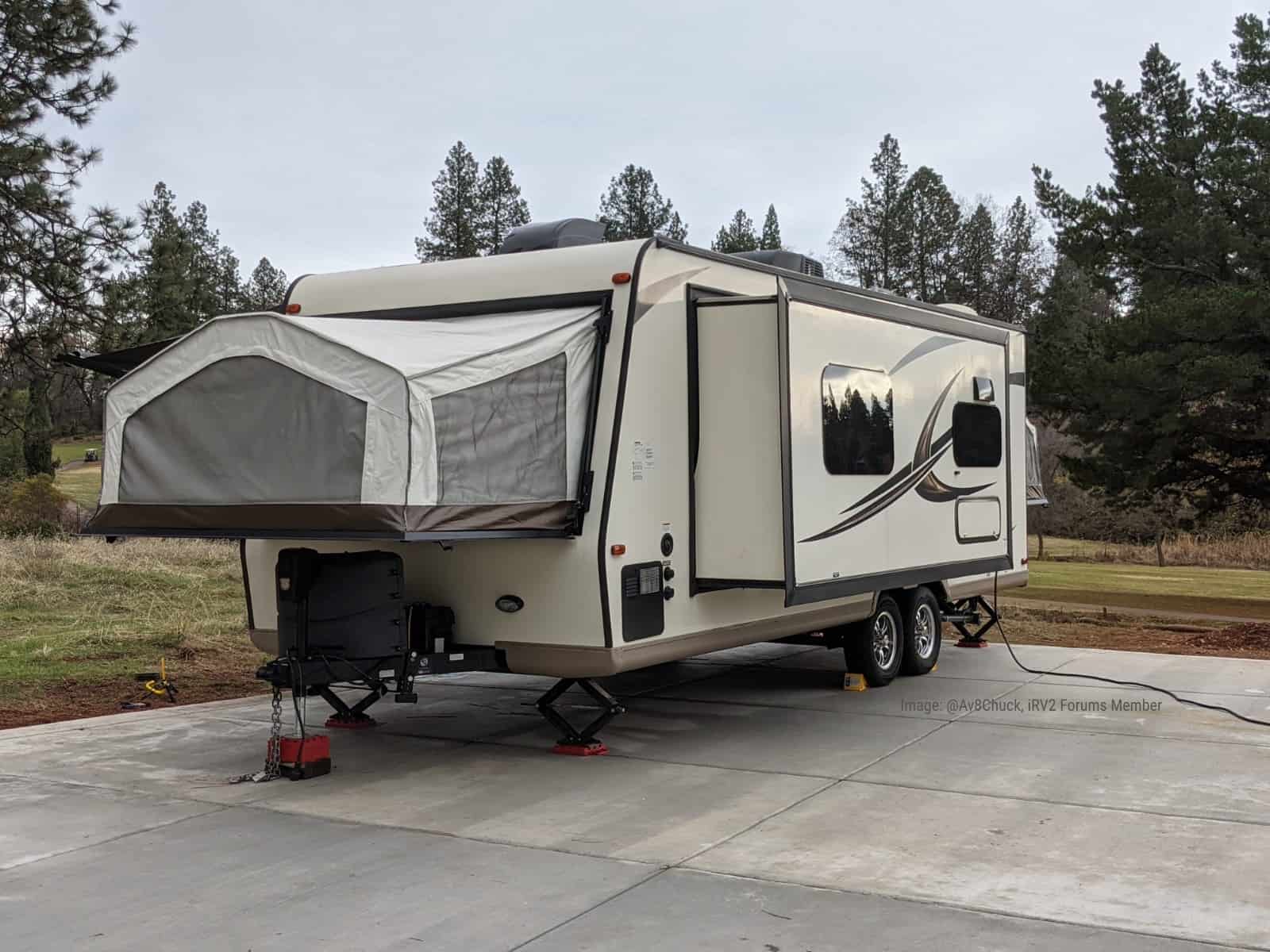
Expandable Travel Trailers: Why Hybrid Travel Trailers a Great Choice
About the author:.


This post may contain affiliate links or mention our own products, please check out our disclosure policy .
Average Trailer Weights Examples
Published on July 1st, 2016 by Camper Report This post was updated on February 15th, 2024

If you’re looking for average trailer weights, you’ve come to the right place. These numbers will help if you are trying figure out how big of a trailer you can buy and successfully tow with your existing or future truck.
Why Does Trailer Weight Matter?
There is a camper trailer for almost every type of vehicle. Even a car can tow a little one-man teardrop trailer. However, if you want a massive 26′ trailer, don’t stress your mini-SUV by pushing the limits of your tow capacity.
In general, a truck or other vehicle that advertises it can tow 7,200 pounds (3,250 kilos) is adequate for towing most trailers under 24 feet.
DON’T MISS OUT ON CAMPER REPORT UPDATES
Sign up for the newsletter today.
Please enter a valid email address.
An error occurred. Please try again later.

Thank you for subscribing to the Camper Report newsletter, keep your eye on your inbox for updates.
Be wary as you shop for trailers to make sure that you don’t get taken by the marketing. Almost every trailer today, no matter how bloated and heavy, is marketed as “lightweight, superlight, featherlite, etc.” Check the numbers.
Average Trailer Weights of Popular Camper Models
In short, average trailer weights are around 5,200 pounds (2,350 kilos) dry weight.
This means the weight of the trailer when its tanks are not filled and it has no gear in it. You can expect to add 1,500 pounds (680 kilos) of gear and water to that number to get a “real world” example.
Obviously, this depends dramatically on the length of your camper trailer and the construction type of your camper. As a general rule, you can expect your trailer, filled with water and gear, to weigh about 250 pounds per foot of trailer (the box length, not the total length including the hitch).
- 3,715 pounds without gear and water – 2015 Jayco Jayflight 19RD (19 feet box length)
- 3,786 pounds without gear and water – 2017 R-Pod RP-176 (17 feet long)
- 3,974 pounds without gear and water – 2017 Coleman CTS192RDWE (23 feet box length)
- 4,800 pounds without gear and water – 2017 Rockwood Mini-Light 2504s (25 foot long box length, 29 foot total length)
- 5,118 pounds without gear and water – 2017 Salem Hemisphere 24BH (24 foot long box length)
- 5,605 pounds without gear and water – 2015 Jayco Jay Flight 26RKS (26 foot long box length)
- 6,030 pounds without gear and water – 2015 Jayco Jay Flight 27RLS (27 foot long box length)
- 7,690 pounds without gear and water – 2016 Jayco Jay Flight 38BHDS (38 foot long box)
- 7,705 pounds without gear and water – 2017 Cherokee West 274DBH (32 foot long box)
How to Read Trailer Weight Numbers
It can be confusing to see all of the different numbers listed for the trailers. When I was out on the lot, I was totally confused when some salespeople would give me the gross weight, and others would give me the dry weight.
I learned that the best policy was to take the unloaded vehicle weight and add 1,500 pounds to it for gear and water.
- Unloaded vehicle weight – This is the weight of the camper itself with no water or gear. Just the trailer.
- Gross vehicle weight – The total weight of the trailer, full tanks, and an average load of gear. This is the maximum amount that the trailer could possibly weigh. But there’s a lot more to Gross Vehicle Weight (GVWR) so we wrote a complete guide on what exactly is GVWR .
- Dry hitch weight – The dry hitch weight is the amount of weight put on the trailer ball of your towing vehicle when the trailer is unloaded of water and gear. This number is usually quite low–about 10% of the total weight of the trailer. For my 25′ trailer, the dry hitch weight is under 500 pounds.
- Cargo carrying capacity – The maximum amount of gear and stuff that the trailer should be filled with.
Trailer and Truck Considerations When You’re RV Shopping
Open the door to your tow vehicle and look at the sticker on the inside of the driver door. It will tell you the amount it can tow. It’s important that you go by that number and NOT the number you see when you google your vehicle and the tow weight.
The amount of weight your tow vehicle can pull will depend dramatically on what options and packages were purchased with the vehicle when it was new. The only way to know for sure what your specific model can use, is to check the sticker.
This number is the absolute maximum amount of weight that the trailer can bear when it is empty OR fully loaded. Loaded includes all cargo, fluids, and passengers, plus the original weight of the trailer. Since you will likely trravel with a loaded trailer, this weight rating should not be exceeded.
Here’s how gear and even trailer manufacturing can affect average trailer weights.
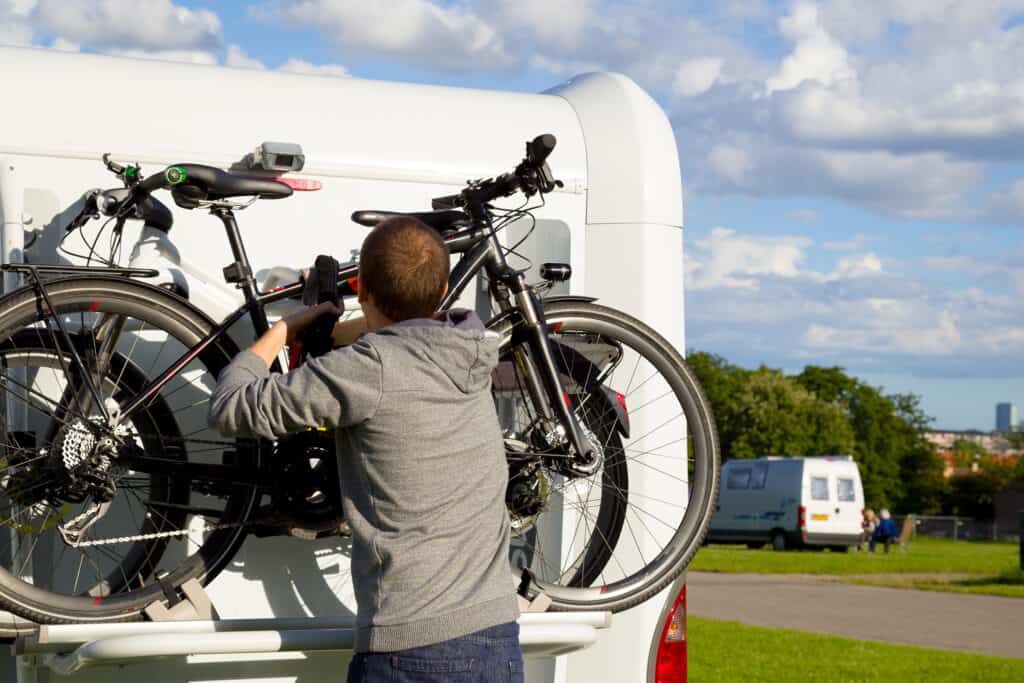
Water and Gear Weight
Water weighs eight pounds per gallon, and an average trailer has a 48 gallon fresh water tank. Just your fresh water tank will add nearly 400 pounds to the weight of your trailer.
Then, we add in gear to the camper. A generator capable of powering a travel trailer air conditioner weighs about 90 pounds. As a side note, I wrote an article about the best generator out there for travel trailers which you can find here . You’re also likely to add another 400 pounds of camping gear, food, and kitchen supplies–even if you aren’t going crazy.
My tow vehicle is a 2012 Dodge Durango with the tow package. It tows 7,100 pounds. My trailer weighs 4,800 pounds dry weight (6,300 pounds total weight when full of gear and water). Even though that’s nearly 1,000 pounds under what my tow vehicle can tow safely, I still can only go about 55 miles per hour when going up a steep hill.
Slides and Trailer Weight
Camper slide-outs increase the weight of the trailer. A single slide-out often adds 800 pounds to RV weight.
If your camper has “pop outs” instead, which are the canvas tent material that pops out, it won’t really add any significant amount of weight. This is only the motorized slide outs that I’m discussing here.
Fiberglass Trailers Versus Aluminum Trailers
There are basically two ways to build a camper trailer. The first way is with fiberglass construction. This is the type where your camper has smooth exterior side walls. This type of camper has aluminum metal structuring which is significantly lighter weight than traditional “stick built” trailers with wooden 2×4’s.
Stick built trailers are the type with aluminum corrugated siding on the outside. They have the bumps along the entire exterior of the trailer. Since you’re adding the weight of a large load of lumber, these trailers are usually about 900 pounds heavier if all else is equal.
Airstream trailers are a whole other animal. We wrote about airstream weights , including a towing guide, that you should check out if you’re considering an airstream.
Conclusion: Don’t Max Out Your Towing Vehicle
It may surprise you that the “maximum towing capacity” for your vehicle could be more than the weight of your camper, but you still shouldn’t tow it. Definitely check out our guide here on how to figure out how much your vehicle can safely tow.
My recommendation is that you take the dry weight of the camper you are wanting to buy and add 1,500 pounds. Take that number and make sure that it isn’t more than 80% of the total weight your towing vehicle says it can tow.
There are lots of good reasons not to buy as much trailer as your vehicle can possibly tow.
- You’re likely to burn out your transmission over the long term.
- It’s likely won’t be able to drive anywhere near the speed limit when going up hill.
- You want to leave a little margin of error. Just in case either the trailer company or your towing vehicle are giving “overly hopeful” numbers to you in the advertising materials.
Sometimes, if you want the big fat RV, you gotta get a big fat truck to match. I towed my trailer with a V8 Dodge Durango for a while, but eventually gave in and bought an F-150.
Share this post:
Related posts:.
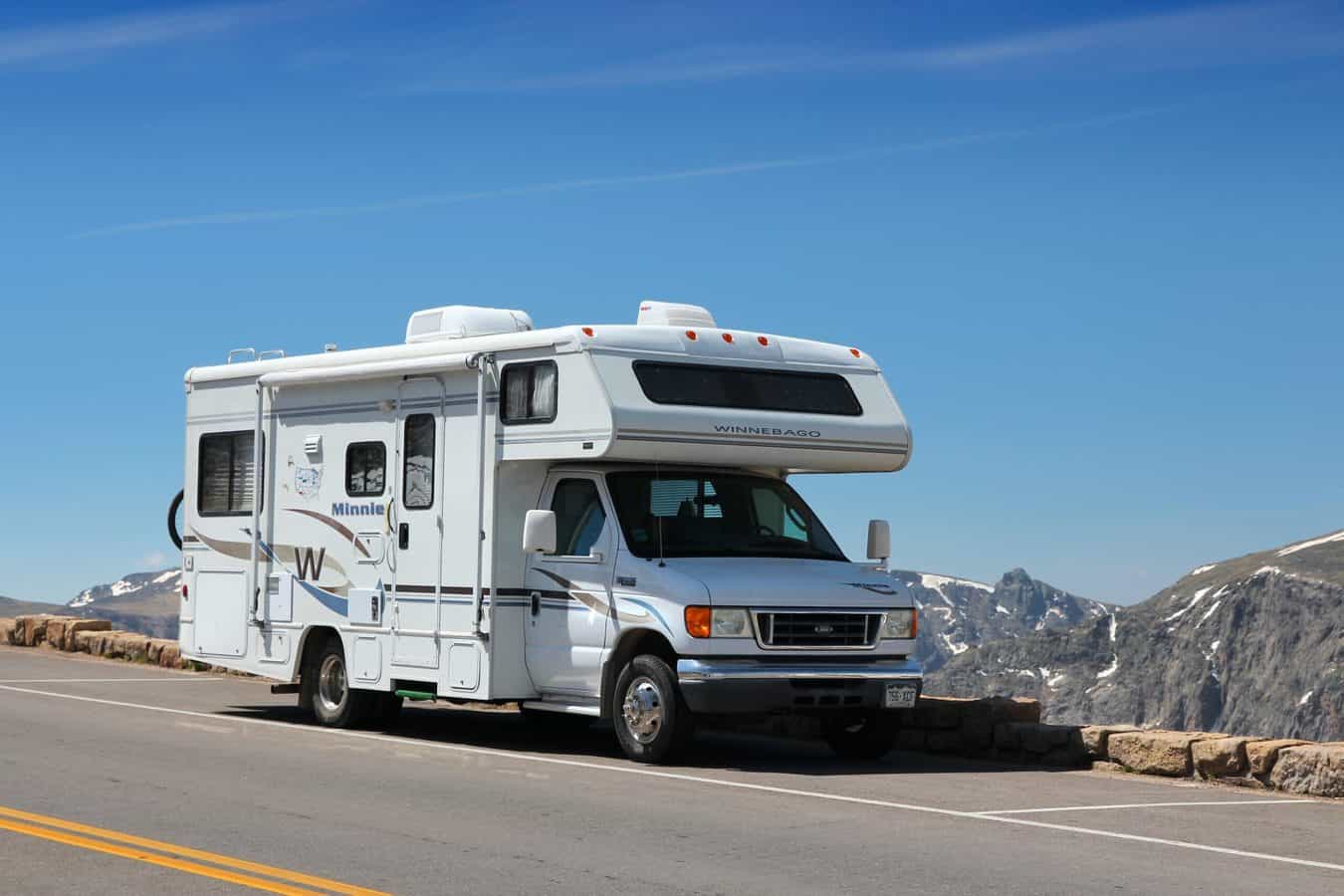
What Is The Best Roadside Assistance For RV Campers?
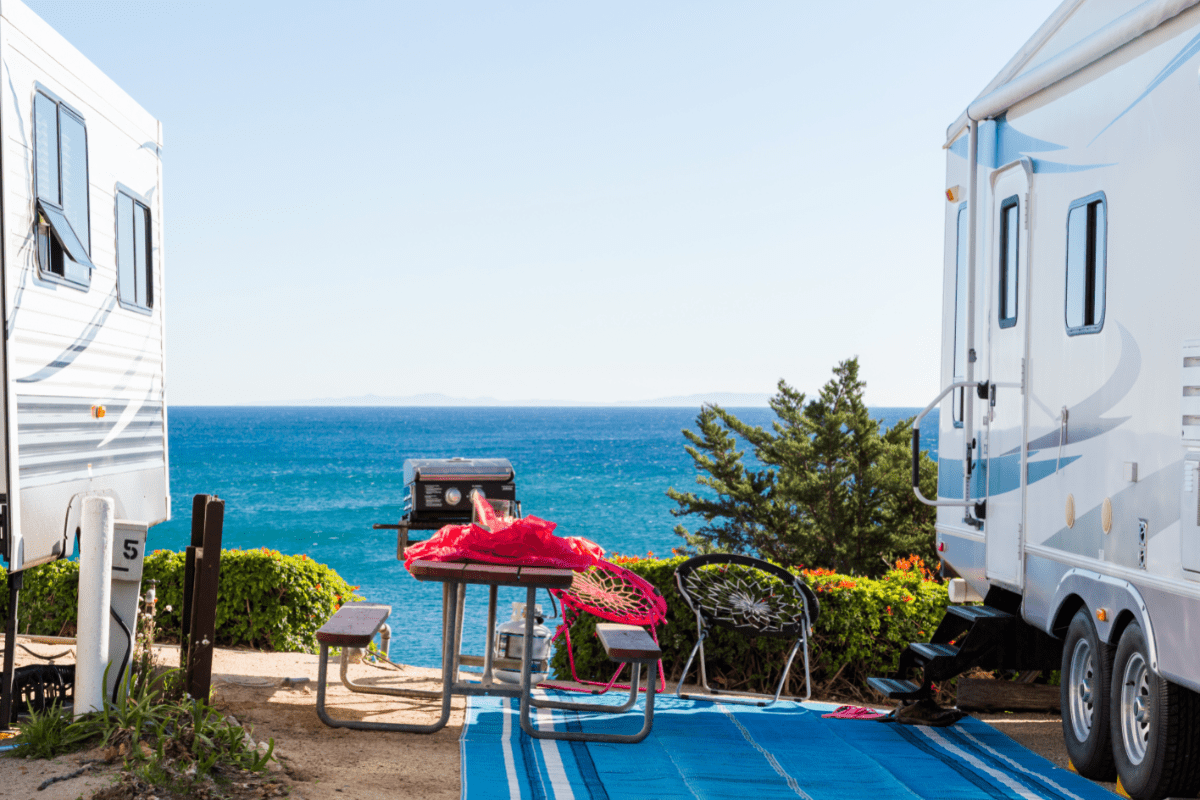
The Best Seasonal Campsites For RV Snowbirds
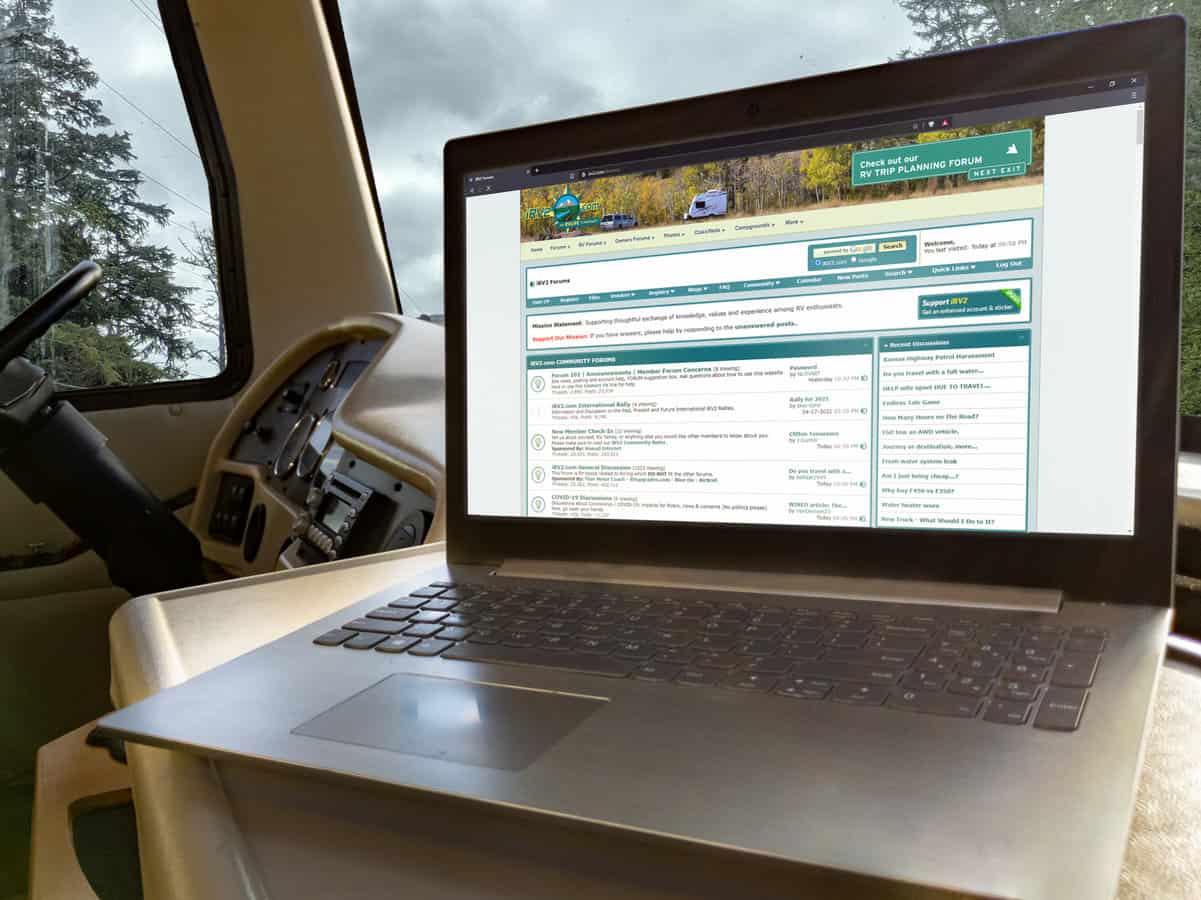
RV Hotspot Plans To Keep You Connected
64 thoughts on “average trailer weights examples”.
Thanks for this detailed report. We want to get a 2506S Mini Lite Rockwood. Tow vehicle is a 2016 Sequioa 7000Lbs towing capacity. Is this a good set up? Or do we have to look for another trailer? Thanks.
I’m trying to determine not how much each axel can hold but how much each axel weighs
Hi, I have a Tacoma TRD Sport V6 Truck Double Cab what is the most I can tow with that. I am looking to get an RV between 22-26 feet. Is this Truck able to tow it properly?
Quick question I have a 1970 thunderbird travel trailer 12 ft 2 wheel wondering if you had a idea what the gvwr was
Hello, we’re new to the trailer world, so new we haven’t purchased one yet. We have a large family and are looking at what’s the best large 10-12 passenger vehicle that can pull the most weight? We currently have a Ford transit 12 passenger and realized it’s not going to pull the amount we will need. So we’re looking at getting a Chevy express. We will need a trailer that sleeps at least 10. Any ideas of combinations that will work for us? A truck would likely be best option but won’t fit all of us and we don’t want to take two cars. Thank you in advance.
Not sure if this has been answered or not. We got a 15 passenger Chevy Express 3500 to pull our 30 ft camper and so far it’s worked great. Brake controller is a must. Fastest we’ve driven or plan to drive is 65 mph. Big hills are nerve racking but ok.
Overall, travel trailers are lighter on the wallet or purse as well. This is an important reason why they’re so popular, especially since half of the 430,000 RVs sold in 2016 were to buyers under the age of 45 (stat from 2017 CNN Money article ).
WE JUST BOUGHT A 17 FOOT SKYLINER ON THE THE FOLLOWING IS CCC 5000 UVH -300 FOR FRESH WATER WIEIGHT -48 FOR LPGAS 10 GALLON WHICH LEAVES US AT 1377 FOR CCW AND 295 FOR HITCH THIS INFO COMES OF STICKER THAT CAM WITH TRAILER IN CUPBOARD THIS HAS THE DESCRIPTION OF WHAT ALL COME WITH RV FRIDGE STOVE ETC IT ALSO HAS AN AWNING IT NO LONGER HAS THE AWNING HOW WOULD I FIND OUR THE WEIGHT OF AWNING AND WOULD IT BE SAFE TO USE THAT WEIGHT OR PART OF IT IN CCW WEIGHT IF SO HOW WOULD I FIND THAT WEIGHT
The internet post title leading to this comment was “what does a small pull behind camper weigh”. I submit that a 17 ft to 24 ft adequately equipped trailer weighs 2500-3500 pounds. I’ve owned both in ’72 and ’80. After my wife passed away, I’ve also owned and camped in a 5’x8’x46″H teardrop weighing 900 lb, plus 100 lb gear. That was too small for me at 78, so I upgraded to a 13 ft layout-2 Scamp trailer, which weighed 1660 lb dry. Both these last two were pulled by small autos weighing about 4000-4500 lb: 1997 Avalon, 2007 Ford Edge. A heavy-duty pickup was never needed in the Rocky Mountains or on the Plains, and the autos never strained at towing (without electric brakes), but I only travel 60-65 mph. Being single and wanting elbow-space, I changed out the layout-2 Scamp for layout-1 weighing 150 lb less, and I plan to use a 2015 Mazda 3 and add good-ideas transmission cooler and electric brake controller. I suspect the first motivation to buy a small travel trailer is to get away from the “luxuries of home” into the quiet “wilderness”. After all, you’re vacationing and wanting to enjoy the world of scenic nature: sites and hikes and campfire story-telling with other campers. You and I don’t need large anything, and I don’t tear up the road. That’s my experience, and it’s been great. (PS: Take a year of camping to “learn the ropes” before making any other +/- trailering decision.) –Happy Camping
I am so confused. I have a jeep cherokee latitude plus and it says it can tow 4500 lbs. What size camper can I buy? What weight should I be looking for? We just want something to use on the weekend and vacations for Hubby and me. We will only have clothes and food. We don’t have any sports stuff to carry.
I am thinking about buying an Oliver Legacy Elite 2. It lists the dry weight as 4,600 and the GVWR as 7,000. The length is 23′ 6″. My current car is a 2007 Kia with 307,000 miles. My question is what what towing vehicles should I be looking for? To complicate things, I would love to have a low to the ground car because of my two very old dogs that do not jump In the back of a SUV very well. Please help. Thank you so much.
There are dog ramps that can be purchased. I don’t believe you would want to down grade vehicle.
Hey guys! I’m an RV newby. Just bought a 2002 Winnie Vista, 21′. Not pulling any vehicles but I want to replace my couch. Temporarily with a 269 lb massage chair. Do you think that weight is going to cause a problem?
I have a ’16 4Runner with a 4 liter V6 and a tow capacity of 5000 lbs. I am looking at a 21′ trailer with a “as sits” weight of 3900 lbs. The 4Runner has a 500 lbs tongue weight rating but I understand can handle more with a weight distributing hitch. I am worried that this may be too much trailer. Any thoughts would be appreciated.
I have a 2018 highlander meant to tow 5000. My camper has dry weight of 3885. Does the factory couch, ect count as cargo weight? If I pack super light and dont travel with water, does it weigh too much? I’m super confused. The camper has breaks and I’ve added sway bars for safety. But I’m still concerned.
I have a 25’ Trailer Fleetwood 1987 what is it’s weight if you could tell me please.. thanks so much
Very informative blog post. I love traveling and I hope in some moment in the future I will buy it camper vehicle.
HI WE HAVE AN OLDER 15.5 FOOT TRAVEL TRAILER FOR SALE AND WE’VE BEEN ASKED THE DRY WEIGHT.. HOW WOULD WE FIGURE THIS OUT?READ THAT AVERAGE TRAVEL TRAILER WEIGHS ABOUT 100 LBS PER FOOT.WOULD THIS GIVE US A BASE FIGURE
If it’s older, you probably no longer have the MSO (Manufacturer’s Statement of Origin) where this is listed. If you have that document, you’ll know the exact dry weight. The dry weight is the weight of the camper with no cargo or water in it, so you could also go have it weighed. The other option is to look for similar, but newer, models and see what their listed dry weight is. You could do that online.
For example, the 2017 R-Pod RP-176 is 17 feet long and has a dry weight of 3,786 lbs (quite a bit more than 100 lbs per foot). It’s going to depend on if your camper has slide-outs, what materials the frame and body are made from, etc. So maybe 100 lbs per ft is a good starting point, but that’s probably only if you have a fairly light camper with no slide-outs or other heavy add-ons.
Now in June 2019, you may have found your answer. If not, call around to find a vehicle scales, such as a cattle feed vendor who weighs delivery trucks. Some will do a non-certified weigh free.
I purchased an Arctic Fox 32A this month and am towing with a GMC Denali 2500 HD with the Duramax diesel. The dry tongue weight is 825, and I just weighed it with a Sherline scale, and came in at 1375 lbs. That is with all tanks empty, and a small amount of food and supplies. It’s very misleading by the manufacturers to even suggest that this is a number that means anything. When you add the propane with tanks, batteries, and options like a power jack, there is no more room for carrying anything. Dealers should be required to have scales, and weigh the axels on vehicle and trailer before letting it off the lot. That still leaves the consumer responsible for the loading of gear, but they would be aware of the dangers of over loading. My next stop with the trailer will be at a local truck stop with accurate scales to check all axel weights.
Can a 2007 ford escape pull a 18ft travel trailer with a single slide out. What kind of hitch do we need if it can.
Hi I just recently came across a 99 Franklin imperial I was told it’s a 38 footer with two pop outs and it’s a bumper pull triaxel I pulled it with my 91 dodge d350 but it damn near took everything it had I’m wondering how much it might possibly weigh because I would like to get a weight distributing hitch with the sway control and I am currious if I may need a bigger truck
A 38-footer like that probably weighs close to 8,000 lbs but it depends on a few things. For example, if they’re really pop-outs and not slide-outs, that could make the difference of 1,000 to 1,600 lbs. And of course that’s the dry weight. You’ll want to factor in water and gear. But if your Dodge can handle 12,000 lbs I’d say you’re fine. If it can only handle 8,000 or so, I’d get the trailer weighed to make sure it’s well under 8,000.
I bought an 04′ F 150 in 04′ that had a few thousand miles on it, maybe 19K. (4×2) 4.6 L Automatic The only thing I have pulled with my trk is my boat….20′ I do not know if it has a towing pkg and I don’t know how to find out if does have one. Never paid attention to a T-Pkg really. I’m about to be the owner of a 23.4 ‘ Rockwall Ultra-Lite RV/ bumper pull camper trl. One of my X – relatives is selling it to me. It’s clean and I must admit I have never seen but I know it is in great condition. It’s in La. near Alexandria. My SIL said he would pull it here….I live by Galveston,Tx. When it gets down here, I hope to pull it somewhere and I gotta know if my trk will pull it ok. Wish i could tell ya how much that RV weighed empty.. If anyone could can relate to this scenerio……….please chime in
I’m not one to spend years researching something out. I feel the length of time spent “thinking about it” has little bearing on the accuracy of the decision. Rather the information that’s at your fingertips at the TIME of the decision makes for a smart decision. All that to say, if you want a really good quality travel trailer and you’re the type of person who understands quality, all you need to do is do like I did: Spend a few hundred bucks on a trip to the Oliver factory for their 2 hour tour. If you’re serious about getting a trailer, you will have nothing left to think about except what color stripes to have them put on your new trailer. Seriously, long before my tour was over, i was convinced that these Oliver’s are worth every penny and I’m grateful that they spent the years it must have taken to come up with such a high quality travel trailer. Oliver Travel Trailers
Hi Andy, very clear article, thanks! I?m struggling to understand the importance of the tow vehicles max tongue weight. For example, you are pulling 6300 pounds, so if 15% is tongue weight, that is 945 pounds. The 2012 Dodge Durango with tow package has a max tongue weight of 750 pounds, so you are over on that measure, but below the towing capacity limit of 7100 pounds.
What are the implications of max hitch weight on the vehicle? Can I go over? I ask because I am considering a Durango for a family hauler / summer tow vehicle.
Many thanks! Blake
I have a 2001 BMW 4.4L. Can my vehicle pull a single axel 15? travel trailer?
I like sports cars but my current one may not have enough power to pull a 21′ trailer, which would weigh about 5,250 lbs. Can a modern Corvette pull such a trailer? May we assume that its V-8 has enough power to do so? Can its frame accommodate a trailer hitch w/o a problem? How will the hitch affect the Corvette’s performance when it’s NOT towing a trailer? How much would it cost to have that hitch installed?
Please advise. Thank you!
Wow your reading my mind.
I have a 1979 Fleetwood 15′ Prowler tandem axles bumper pull trailer. The tags are off the side, so I don’t know it’s gross weight or axle weight ratings. Can you give me some information on it ? Thanks.
Drive through one of those roadside scales for truckers. Other places with scales would be dumps and industrial recycling centres.
I too am having the same issue with Jeep and trying to figure out their towing capacities. There is a lot of ambiguity in the the towing ability , weight, etc. have searched numerous sites and still no real concrete answers
Distance traveling does make a big difference. While you should always be within manufacture specs. If traveling alot you should get a bigger vehicle. Traveling at max GVWR is not enjoyable and requires 100% focus and perfect weight distribution.
Great information but I would like to add that you need to also remember what the stopping capability of your vehicle is in relation to the weight you are pulling. I’ve seen many a people be told their truck can “pull” a large trailer (horse trailers too), the question is – if you are going down a grade or steep hill – is your vehicle heavy enough to slow or stop the vehicle. I’ve seen people with Toyotas pull four horse trailers with four large horses in the back but when it comes time to stop it isn’t a pretty sight. Just an FYI. And don’t trust the dealer to tell you the truth – it’s their job to sell the truck – that’s it.
I have a 20foot layton travel trailerskyline can a brand new toyota four runner tow it please tell how much trailer weights empty from factory
Plus you need to add the weight of all the occupants and gear that is inside the tow vehicle (the Dodge Durango in this case)
I have a 1995 304 bh jayco dry weight 5250 and gross 7800 with 2 30 gal tanks. I have a 16 f150 crew v8 stating 7000 tow capacity. I’m concerned that I may have bought to big of a trailer for my truck. I would say my family of 5 and dogs are 600lbs worth in the truck. Thoughts?
Hope you got a good answer. I’m not an expert but I have an f150 tow capacity 7800 Travel trailer is dry weight of 6440. We dont carry water in tank. Just hubby and I add 400-500 lbs to over estimate. That leaves a little less than 1000 lbs of extra weight. That’s hoping I’m using correct term of dry weight but that’s the number we were told to use when deciding a proper weight for our vehicle to pull.
What can I tow if I drive a Jeep Rengrade tow on hitch is 1,500 lbs
Hey Andy I was wondering where you were able to find the GCWR for your Durango. I own a 2014 grand Cherokee with hemi and tow package and like you I am rated to tow 7200lbs. I started looking into my specs and was puzzled to find a stamp on my door which says my vehicles GVWR is 6800lbs while the curb weight is just over 5000lbs. So going by the numbers I can load 1800lbs into or onto my jeep right….wrong. There is another sticker inside the door jam saying cargo & passengers should not exceed 1150lbs? Confused by the 650lbs discrepancy I called Chrysler who could not explain the difference nor could they provide me with a GCWR for my jeep. Try as I might to find the info online or from other sources I have been unable.
Thanks all.
Your weights are off pretty substantially. They are closer to GVWR weights than they are to unloaded vehicle weights. The R-Pod RP 1756 for example weighs no where near 3786 lbs. unloaded.
Well said, Randy. Dry weights of trailers should be ignored. Focus on the GVWR. Your trailer will be very near that figure when you’re towing it.
What I’d like to find out is the difference in miles per hour when towing a 5th wheel versus a travel trailer. We are buying our “retirement” camper next year. I’ve got my eye on a 5th wheel that is 8,400 dry weight. We will not carry fresh water in the tanks so figured another 500 lbs. tops for carrying clothing, food, etc. Other option is a travel trailer that weighs about 5,900 lbs. dry weight and add in the 500 lbs for extras. We will most likely purchase a Diesel pick up – 250 or 2500 series. Does the weight of the RV make “that” much of a difference when using a diesel. What kind of mpg can we expect when pulling? If anyone know, please let me know. My work email is: [email protected] Thanks!!
Just remember that dry weights usually don’t include ANY options and all trailers have lots of options … even some mandatory option packages (which seems to defy the definition of what an option is). So, things like A/C units, furnaces, upgraded refrigerators, larger propane tanks, dual propane tanks, awnings, and other stuff do NOT get included in the dry weight. You’ll probably add 500 lbs of beddiing, food, pots/pans, batteries, and other gear (at least), but there’s another 1,000+ lbs of options that you forgot about. So, it’s always better to start with the GVWR and work backward from there, rather than starting with the dry weight and working forward.
With that said, I can’t really help you with MPG. I’m guessing that a 3/4 ton diesel will get in the 10-15 MPG range, but a web search should help.
One thing that I don’t see discussed is “tongue weight”. This is what got us in trouble. I had a 2007 Tundra, with a 5.7l engine, capable of towing 10,000 pounds. The folks at the RV store insisted that my truck was fully capable of towing the trailer we had our eye on. Said trailer had a dry weight of 8000 pounds, and a dry tongue weight of about 1100 pounds. Add 80 pounds of propane on the tongue, plus a 100+ pound Centerline hitch, and we were at about 1300 pounds. I never found out what the rating of the receiver was, but I’ll tell you, even with the Centerline weight distributing hitch, we were dragging our tail all the way home…as in the steering wheel was super light, and barely providing appropriate steering control. On top of that, I figured out that at 1300 pounds of tongue weight, 240 pounds of me, and 120 pounds of my wife, and 40 pounds of dog, we had 1700 pounds of payload, on a truck with a 1590 pound max payload capacity. Needless to say, I was furious with the dealership for insisting my truck could handle that trailer, and told them as much, even though it was partially my fault for not understanding all the parameters necessary for towing before even going to the dealership. Ethically, if not legally, they shouldn’t have let me off the lot with that load. I ended up buying an F-350 thinking I might upgrade to a 5th wheel within a few years, if we enjoyed RVing. We eventually did upgrade, to a class A diesel pusher, but I’ve become much more educated about what I can tow, tongue weights, payload weights, etc…and I’ve lost some weight as well, since retiring.
I have a 27 ft Dutchmen and looking to buy a truck to pull it. Not sure the weight. Any suggestions on what type of truck to buy. This is my first RV and I have been looking on line to educate myself more about RVING. Please help. Not really taking it out far just local
What is the GVWR of the Dutchmen trailer? The dry weight of the trailer doesn’t matter, you won’t be anywhere near that. You’ll be near the GVWR after all options and gear you add. You can save by not taking any water with you. How big is your fresh water tank? Multiply by 8.4 to get the weight savings. For example, assume that you have a 35 gallon water tank and you have dual 20-lb propane tanks. You save weight by not bringing any water with you and only taking 1 tank of propane. That’s (35 * 8.4) 294 lbs of water and 38 lbs of the propane tank you saved. If your GVWR of your trailer is 7,000 lbs, then figure you’re carrying around 6,650 lbs with those weight savings.
BTW, trailers usually use 3,500 lb axles. So, the GVWR is usually just the number of axles * 3,500. Some also assume some percentage of tongue weight. Weight on the TV hitch isn’t consuming the axle capacity. So, if you assume 12.5% weight on the hitch, you get a 2-axle trailer with a GVWR of 8,000 lbs., e.g.
Next, figure out who goes in the TV and how much they weigh, fully clothed. The weight of your vehicle will be on your door jamb sticker or you can look up the average weight of a given truck (usually around 5,000 lbs for a 4WD half ton). Then do the math I mentioned above. GCWR – TV gross weight – weight of cargo including people = amount of towing capacity you have remaining. Use the lower of that calculation and the maximum towing capacity of the truck you’re looking at. In this example, if both numbers are larger than 6,650, then you’re fine.
The distance you’re going doesn’t matter. The data are the data and safety is safety. The only exception is inside the CG — filling up your water tanks at the CG’s dump station might put you over the limits, but you’re only driving 10 MPH for a few hundred yards to your site.
Thanks Andy, that was a great explanation!
It’s not as linear as some of these comments, and even the article, make it appear. You really need a few ratings and weights. The first is the GVWR (gross vehicle weight rating). This is the number that tells you how much weight you can put in the actual vehicle, including the weight of the vehicle itself. You can’t just decide to give a ride to the entire offensive line of the Dallas Cowboys. Your vehicle can only carry so much weight. The Dodge Durango has a GVWR of 6,500 and a weight of 5,100.
The next is the towing rating. This is the maximum your vehicle is rated to tow ****under the most optimum conditions****. The Dodge can tow 7,200, as noted by the author.
The next rating is the GCWR (gross combined weight rating). This is the amount that I can both carry on the vehicle and tow. What this means is that I can’t max everything out. I can’t put 1,400 lbs of human, gear, equipment in my Durango *and* then tow 7,200 lbs. The Dodge has a GCWR of 13,100.
In the real world, you’ll end up adding between 500 -700 lbs of human being in your car for a family of 5, assuming that Dad, mom, and kids weigh (200, 140, 150, 130, and 100 lbs, respectively). This is fully clothed. Add the 75 lb family dog. You’ll easily toss in a few hundred lbs of other gear, trailer hitch, any options you added to the vehicle. So, your 5,100 lb Durango is going to be around 6,100 lbs … if I went camping with my family of 6, we’d be around 6,200 mark. But, for illustration, let’s assume we have 6,100 lbs of weight on the Durango.
Can I still tow 7,200 lbs? NO! 13,100 – 6,100 = 7,000 lbs. I can now only safely tow 7,000 lbs. If I use the author’s 80% rule, I can only tow 5,600 lbs.
Lesson: you have to do the math. It’s not just about the tow rating of your vehicle. It’s about the GCWR!
Andy, I am new at figuring out this stuff and have learned a lot about towing and weights. I came to this article to learn about the average weights of trailers of various lengths and the average amount of weight a person might add to the empty trailer weight. It would appear that getting the actual weight of a trailer could be done by just putting it on a scale. I do not have a truck yet as I am just doing the research and really know nothing at this point. But when I get to your comment you seem to say that I cannot determine the weight of a trailer without knowing the weights and information of the Tow vehicle. With the little that I have learned so far, that would make sense if the article was about towing. I am having difficulty understanding your issue with how the author determine average trailer weights. If I weight my trailer and find that it is 5000 pounds, then how will the GCWR of the tow vehicle cause the trailer to increase or decrease in weight? It would seem from my little knowledge that it would only help to determine if a given tow vehicle can pull 5000 pounds, not if the trailer really weighs 5000 pounds. Thanks
David, I think you may be misunderstanding my comments above. I’ll try to clarify.
First of all, lots of people use truck scales. I have never done this myself, but others do it. When they do, they generally try to make at least 4 measurements with a fully loaded TV and trailer: (1) everything on the scale, (2) the trailer only (unhitched from the TV), (3) the TV without trailer, and (4) the trailer unhitched from the TV with only the tongue jack on the scale (rest of the trailer off the pad). This gives you (1) complete combined weight that you can compare to your TV’s GCWR, (2) the loaded trailer weight that you can compare to your trailer’s GVWR, (3) the loaded weight of your TV to compare to your TV’s GVWR, and (4) the tongue weight that you can compare to the hitch class rating and also get an idea of how well you’ve distributed your weight.
Secondly, obviously the weight of something is what it is. Knowledge of facts, ratings, or other abstract information won’t change the reality and mass of the trailer and payload. The physical laws of our world still apply. 🙂
My comments above were only regarding how to interpret ratings. A TV might allow 2,000 lbs of payload and have a tow rating of 8,000 lbs. That doesn’t mean that you can add 2,000 lbs to the TV **and** tow an 8,000 lb trailer. People often overlook the concept of a GCWR. In fact, the GCWR is often difficult to find. If you have a 1 ton diesel, then you probably can max everything out because it was expressly designed for that purpose. But, if you have a normal passenger type vehicle, then almost always the GCWR < GVWR + Tow. That means you are in some sort of balancing act that requires some additional math. This is a big problem with two classes: V6 owners buying pop-up trailers and V8 owners buying travel trailers. Too often, buyers will purchase trailers that fit within the tow rating. This is too simplistic and leads to overloading of the TV.
The original author actually has a problem in his own interpretation. He states two things: he has a rule to only carry 80% of the vehicle's capacity and his trailer weighs around 6,300 lbs. Those are mutually exclusive. 6,300 lbs is actually 87.5% of his vehicle's maximum 7,200 lbs towing capacity. But, even worse is that fact that he doesn't actually have 7,200 lbs of towing capacity (unless he's leaving some of his family behind). He only has around 7,000 lbs. Good news is that he's not violating any of his weight ratings. The combination is fine in the eyes of Dodge's engineers, it just doesn't meet the 80% rule he cited.
So, just be aware of the ratings: vehicle, tow, and combined. Then don't exceed any of them. Either estimate or, even better, use actual scales to figure things out. Oh, and as mentioned by the author, ignore dry weights of trailers. They're meaningless numbers. After you add all the options on the trailer (which are not included in the dry weight) and then your gear (pots, pans, clothes, food, etc.), you'll be much closer to the trailer's GVWR. It's a good assumption to assume that's what you're pulling. So, can you load up your car and still pull the trailer's GVWR behind without exceeding the TV's GCWR? If so, you're fine. If not, time to compromise … such as not carrying any water on board the trailer, only bringing one tank of propane, etc.
Hoped this helped to clarify.
Andy, you seem to have a great deal of knowledge when it comes to towing. I have read a lot of info, but I’m still confused about what I can safely tow with my vehicle. I think I’m really hung up on payload. Doesn’t the tongue weight of the trailer add to the tow vehicles payload? If my vehicle has a payload of 1400lbs and there are 4 250lbs adults I only have 400lbs of payload left for the trailers tongue weight. I’m not finding any travel trailers with only 400lbs of tongue weight.
Mary, look on the trailer hitch area near the frame. If the serial number or VIN number is not there look on the inside of the cabinets inside the camper … Also, didn’t you need to give your insurer the VIN number when you bought your original insurance. Have them read it back to you. Are you towing it 0.15 miles – a block or two – or 15 miles? NADA Guides on line lists a 38′ Layton with two slides as 8,300 lbs axle weight without all your gear, water, etc. Judging from this article you’re north of 9,000 lbs. Good luck.
I am still confused and need your advice. All of the above is so informative. I am trying to get my camper towed from one campground to another . 15 miles. My camper is a 1998 Layton/Skyline 37 Foot with two sliders. Furniture inside. Household Fridge and two light weight futon beds. My insurer wants a weight. The tow company wants a weight. I do not have a manual . I bought it with a bill of sale. Parts of The VIN # is unreadable. Any ideas? Mary ( [email protected]
An older suit full furnished, figure 250 lbs/ft max. You’re about 9000 lbs. to be on the safe side. Probably close if as you described. Hope you got it accomplished safely.
Thank you for your common sense, clearly written article. I am very concerned about safe towing with my 2006 v8 Explorer with a 7300 lb tow capacity. I’ll probably buy a Passport GT weighing 4900 lbs shipping weight but plan not to tow with water whenever possible.
I’ll be using a Hensley Cub hitch due to my vehicle’s short wheelbase and my concerns about directional stability.
Fred, I had a 2006 Explorer with the 4.6L V8 + towing package (which I think was standard on the V8).
That Explorer has the following ratings (mine had the aux A/C in the rear): GVWR: 5995 GCWR: 11,500 ( https://www.fleet.ford.com/resources/ford/general/pdf/towingguides/2006RVguideApr08.pdf ) Dry Weight: 4500
So, straight away, my max towing is 11,500 – 4,500 = 7,000 lbs. That’s before I so much as put a CD in the radio. I added 700 lbs of fully-clothed people in the car. I then added another 200 lbs of hitch, food, clothes, dog, and other stuff for 900 lbs. So, the Explorer weighed around 5,400 lbs, which is well within the GVWR rating. So, I’m OK there.
But, my maximum allowable tow capacity is now 11,500 – 5,400 = 6,100 lbs. So, I’d need to ensure that the GVWR of the trailer I towed was less than 6,100 lbs. I used it for a 3,500 GVWR pop-up trailer.
Don’t worry about the dry weight. Worry about the GVWR, as you’ll approach that number. That 4,900 lb trailer will need to accommodate A/C, furnace, and other options from the factory which aren’t included in that 4,900 number. Then your bedding, cookware, the 100-lb battery you add, propane tanks, food, clothes, etc. You’ll be at 6,500+ very quickly.
Then, do the math.
how do I check the weight of the trl after I load it to make sure I don’t add to much? I am moving and have a lot of things to bring with me. My trl is 6000lbs gvwr and my suv dodge Durango v8 is 6000 lbs towing capacity.
Take it to a grain elevator or fertilizer supply. They have scales you drive over. Go when theres nothing going on and hit the guy running the scales with a friendly tip. And by friendly tip I mean cash.
If you have a cargo van that pull a max of 10,000 lb tow capacity would it safely be able to tow a camper trailer with no problems?
There are a lot of trailers that would be safe to tow, but there are some travel trailers that when weighed down with gear an water would be too heavy. You’ll have to see what the trailer you’re looking at actually weighs.
Leave a Comment Cancel reply
Welcome please follow these guidelines:.
- Be kind and respectful.
- Keep comments relevant to the article.
- Avoid insults, threats, profanity, and offensive remarks.
- Refrain from discussing gun rights, politics, or religion.
- Do not post misleading information, personal details, or spam.
We may hide or remove comments at our discretion.
I have read and accepted the Comment Guidelines and Privacy Policy *
Follow Camper Report:
- Follow Us On Facebook
- Follow Us On Twitter
This post may contain affiliate links
JavaScript seems to be disabled in your browser. For the best experience on our site, be sure to turn on Javascript in your browser.
- My Purchase Orders
- Compare Products

- Trailer Weights
Trailer Weights by Trailer Type
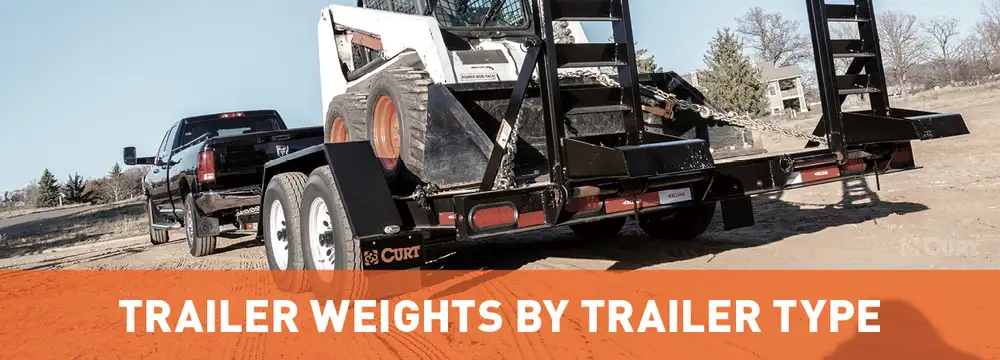
How Much Does a Trailer Weigh?
Each type of trailer has a specific purpose, and because of this, the weight of each trailer is different. Trailers also vary greatly in their capacities, lengths and construction.
This trailer weight chart and guide provides the average weight of each type of trailer, as well as the weight range, the gross vehicle weight rating (GVWR) and the average load capacity.
Warning! The trailer weights listed below are intended to be a general guideline only. The actual weight and ratings of your specific trailer will vary.
Trailer Weight Chart
Tap each trailer type to read more
Brief explanation of terms
- Empty Weight – The weight of the trailer without any cargo or fluids; also called Dry Weight or Unloaded Weight
- GVWR – The maximum weight a trailer is rated to weigh, including cargo, fluids, etc.
- Load Capacity – The total weight of the cargo a trailer is rated to carry
For further explanation of these terms, visit our Towing Capacity Guide .
Tow your trailer with the right hitch! Find a custom hitch made for your exact vehicle.

Camper Weight Chart
There are several different types of campers, from small teardrop trailers to deluxe 5th wheel RVs. This chart provides a focused look at average weights and capacities for most camper types.

Trailer Weights Explained
Canoe / Kayak Trailer Weight
Canoe and kayak trailers are small trailers used for hauling personal watercraft such as canoes, kayaks and even paddleboards.
They typically weigh between 100 and 400 pounds when unloaded. The average weight of a canoe or kayak trailer is 200 pounds.
Depending on the number of watercraft the trailer is designed to carry -- one, two, four or more – the maximum trailer weight can be anywhere from 200 to 800 pounds.
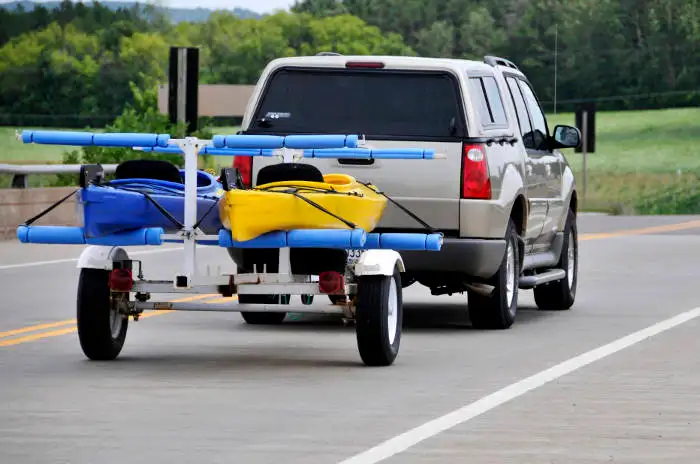
Jet Ski Trailer Weight
Similar to a small boat trailer, jet ski trailers have an average empty weight of 300 pounds. Smaller jet ski trailers weigh as little as 100 pounds and larger ones are closer to 500 pounds.
When loaded, the weight of a jet ski trailer can fluctuate from 800 to 3,000 pounds with an average load capacity of 1,500 pounds.
Weight ratings will differ based on the number of jet skis the trailer is configured to haul.
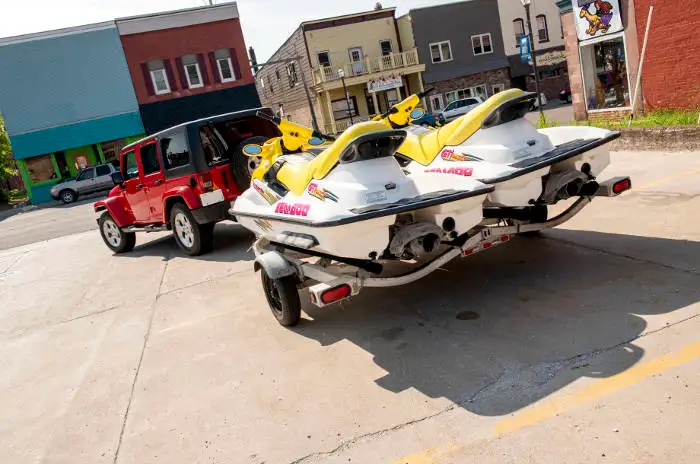
Motorcycle Trailer Weight
A motorcycle trailer is designed for transporting a motorcycle, allowing it to be towed by another vehicle. This is different from a trailer towed by a motorcycle, also known as a motorcycle trailer.
Unloaded, a motorcycle trailer may weigh 300 to 800 pounds with an average weight of 500 pounds. They are commonly rated for a maximum trailer weight of 1,300 to 3,500 pounds, making their average load capacity just under 2,000 pounds.
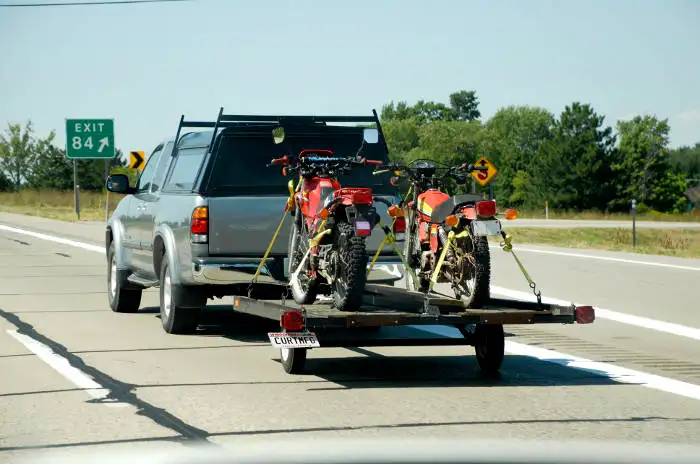
Fishing Boat Trailer Weight
A fishing boat trailer usually weighs 200 to 1,100 pounds on its own, without a boat loaded. The average for a boat trailer is about 600 pounds.
Combined boat and trailer weight ratings ranges from 900 to 6,000 pounds, depending on the length of the trailer and the boat itself.
The average weight capacity for a fishing boat trailer is about 2,700 pounds.
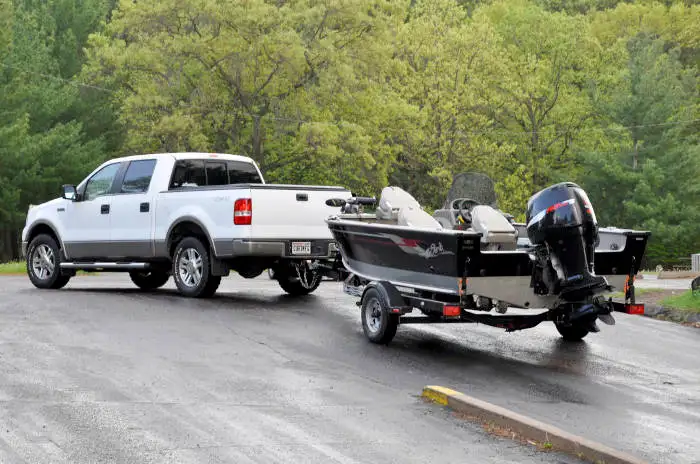
Tow Dolly Weight
A tow dolly for dinghy towing a vehicle usually weighs about 600 pounds without a vehicle hooked up. Some tow dollies weigh as a little as 400 pounds and others as much as 800 pounds, depending on the style and construction.
Tow dolly weight capacity ranges from 3,000 to 5,000 pounds. The capacity refers specifically to the total weight of the dinghy vehicle. However, the average capacity for most tow dollies is closer to 3,400 pounds.
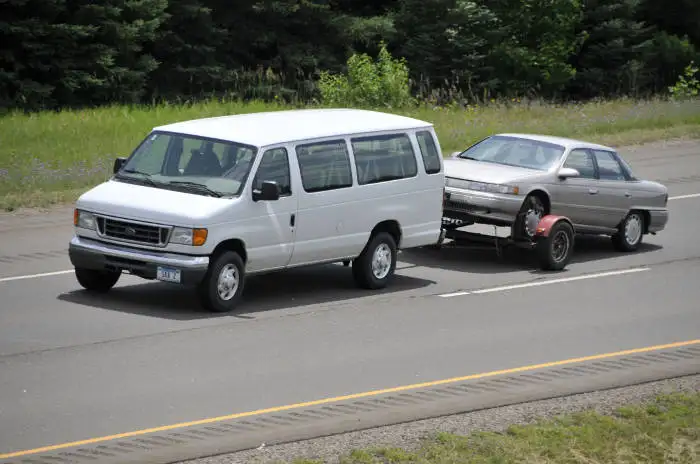
Small Open Utility Trailer Weight
Utility trailers typically weigh about 700 pounds unloaded, but they can vary greatly – from 300 to 1,100 pounds – depending on the construction, width, features, number of axles and more. The type of trailer referred to here is an open utility trailer less than 10 feet long.
The weight capacity of a small utility trailer can also range significantly. A short, aluminum utility trailer may only have a GVWR of 1,000 pounds, while a wide, double-axle, steel utility trailer may be rated for 3,000 pounds.
The average cargo load for small utility trailers is 1,800 pounds.
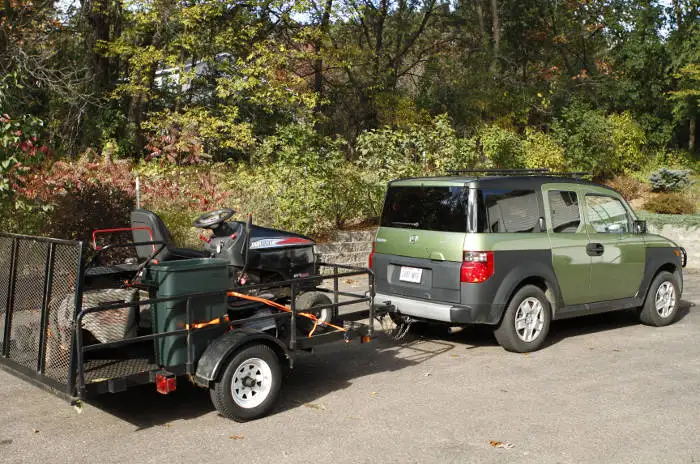
Small Enclosed Trailer Weight
Empty weight for small enclosed trailers spans from 400 to 1,800 pounds. The average for this type of trailer is 1,000 pounds, but this is determined largely by the materials used to construct the trailer and the number of axles.
When fully loaded, a small enclosed utility trailer can be rated for a maximum of up to 7,000 pounds (GVWR). However, for trailers 12 feet long or less, the average cargo load capacity is typically around 2,200 pounds.
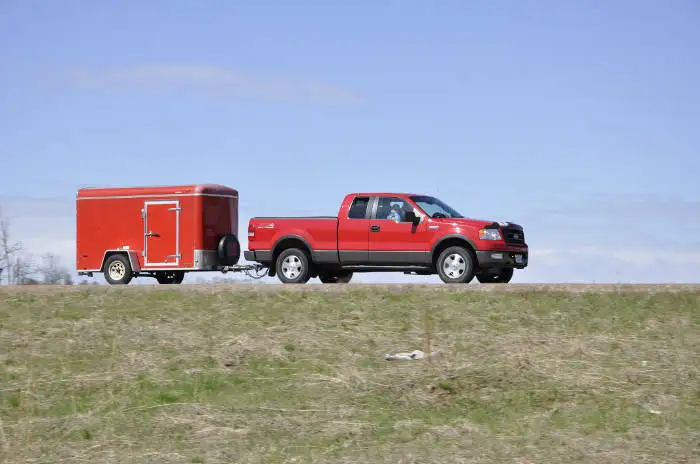
Teardrop Trailer Weight
Teardrop camper trailers weigh between 500 and 3,200 pounds, but the average is about 1,700 pounds. It all depends on the features included. Some teardrop trailers have a fully integrated kitchen and awning system. Others are more basic.
Maximum teardrop camper weight can be as much as 4,000 pounds (GVWR). Some are only rated for 2,000 pounds.
Most teardrop campers aren’t designed to tow a lot of weight, and the average cargo capacity is only about 700 pounds.
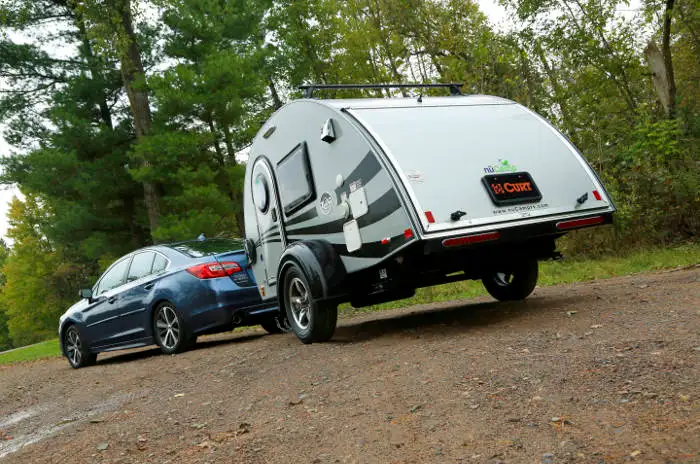
A-Frame Camper Weight
An A-frame camper is a specific type of pop up camper trailer. This type of camper usually weighs between 1,200 and 2,300 pounds unloaded. The average weight is 1,700 pounds.
A-frame campers provide a substantial amount of cargo capacity with an overall average of 1,200 pounds. Gross vehicle weight ratings for this type of trailer range from 2,500 up to 3,600 pounds.
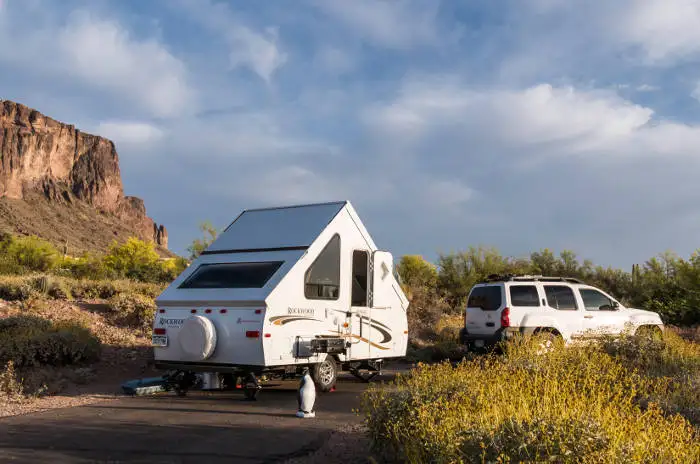
Car Trailer Weight
A car trailer can weigh anywhere from 1,500 to 2,800 pounds by itself. The average is 1,900 pounds. With one or more cars loaded, that weight increases to as much as 15,000 pounds.
The weight of a car trailer largely depends on its construction, length and style. A bumper pull car hauler with length enough for one car may have a GVWR of 6,000 pounds, while a double-car gooseneck trailer could max out at 15,000 pounds. Additionally, aluminum car trailer weight and capacity will vary greatly from steel.
On average, the load capacity for car trailers is 7,100 pounds.

Large Boat Trailer Weight
Larger boat trailers are used for hauling yachts, pontoon boats and other heavy watercraft. For this type of trailer, the empty weight ranges from 1,100 to 4,400 pounds, and the average is about 2,200 pounds.
When loaded with a large boat, the trailer weight increases greatly. The capacity depends on the build of the trailer and its configuration. GVWR can be as low as 5,400 pounds or as high as 34,400 pounds.
Average load capacity for large boat trailers is around 11,400 pounds.
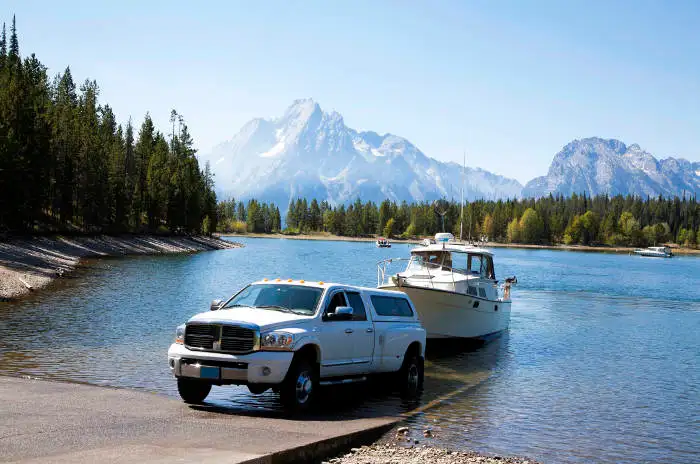
Pop Up Camper Weight
The average weight of a pop up camper is about 2,300 pounds unloaded. Some are as little as 1,400, and others weigh as much as 3,000 pounds if they are equipped with certain features.
When fully loaded (GVWR), pop up trailer weight can range from 2,700 up to 4,000 pounds, giving this type of camper an average load capacity of 1,100 pounds. This provides plenty of room for a propane tank, water tank, grille, bedding, luggage and other necessary cargo for a successful campout.
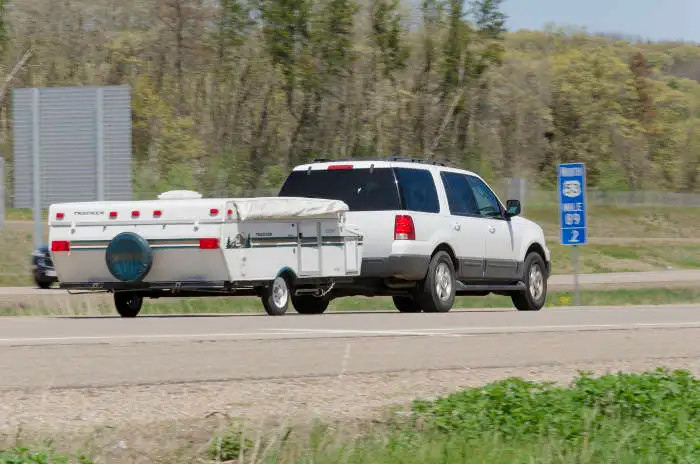
Large Enclosed Trailer Weight
Large enclosed trailers, namely those 12 feet or longer with a bumper pull coupler, typically weigh about 2,700 pounds when empty. Some are little as 900 pounds. Heavy-duty models weigh up to 5,200 pounds.
The capacity of a large enclosed utility trailer can vary based on how many axles it has, the construction of the frame and other factors.
In general, the average cargo capacity is 4,400 pounds. However, some 12-foot enclosed trailers only have a gross vehicle weight rating of 3,000 pounds. Longer units are rated as high as 10,000 pounds.
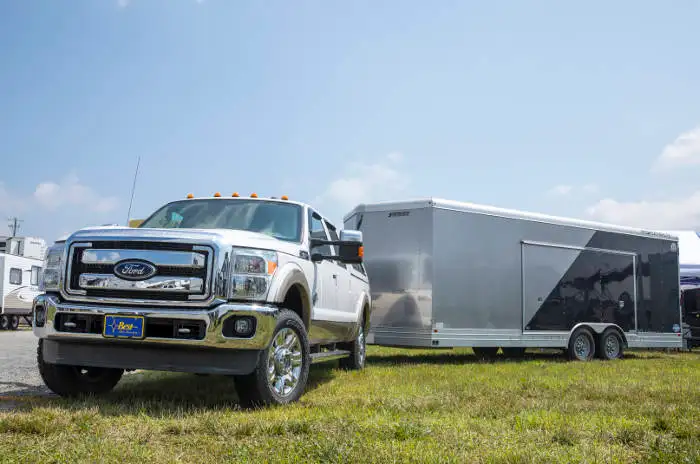
Small Travel Trailer Weight
A smaller travel trailer – about 22 feet long or less – has an average weight of about 2,800 pounds. The unloaded weight range is typically between 1,200 and 3,900 pounds.
The gross vehicle weight rating of small travel trailers varies from 1,900 pounds up to 4,500 pounds.
Generally, small travel trailers don’t have a lot of extra cargo capacity. The average is only about 800 pounds. However, some are rated to carry as much as 1,400 pounds. The cargo capacity may increase with certain design features and additional axles.
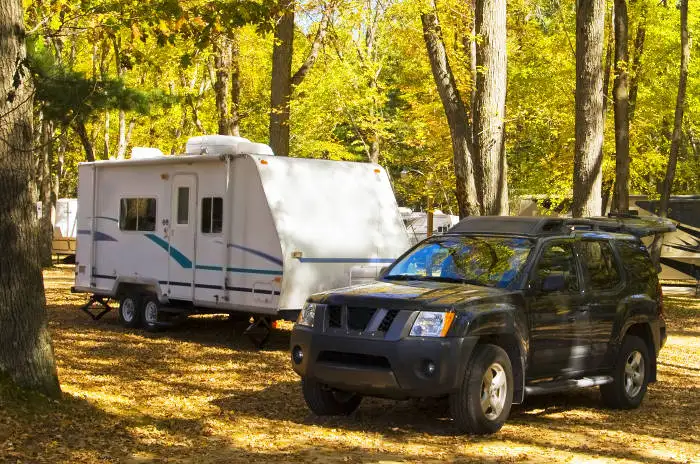
Small Horse Trailer Weight
A horse trailer designed to transport one or two horses typically weighs between 2,300 and 3,900 pounds. With horses and cargo loaded, this number increases. The average empty weight of a horse trailer is about 2,900 pounds.
When loaded up, small horse trailers max out at 7,000 or 8,000 pounds (GVWR). This allows for a cargo capacity of about 4,300 pounds.
Load capacities vary by trailer style and construction. A simple, one-horse trailer made from aluminum will weigh far less than a deluxe, two-horse trailer with a steel frame.
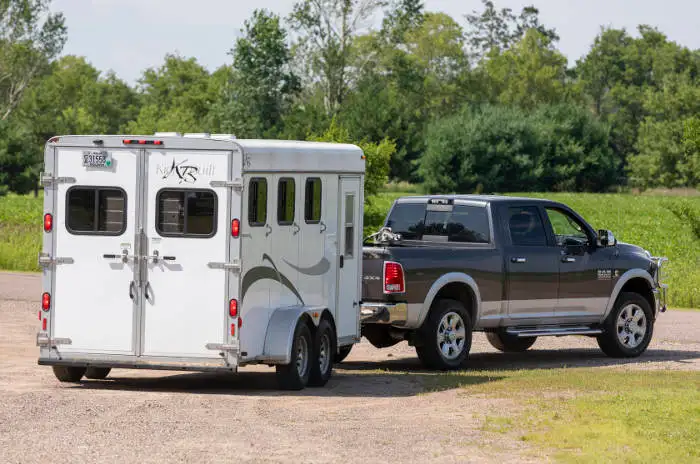
Large Flatbed Trailer Weight
Large flatbed trailers, such as car haulers, equipment trailers and utility flatbeds, can weigh anywhere from 500 to 7,700 pounds, even when empty.
However, because they are designed for transporting large amounts of cargo, most large flatbed trailers – that is, bumper pull flatbed trailers – have a higher cargo capacity. The average is about 7,400 pounds.
For gross trailer weight ratings on flatbed trailers, the low end is around 2,900, but some are rated as high as 26,000 pounds, even with a bumper pull configuration. Gooseneck models are rated even higher.
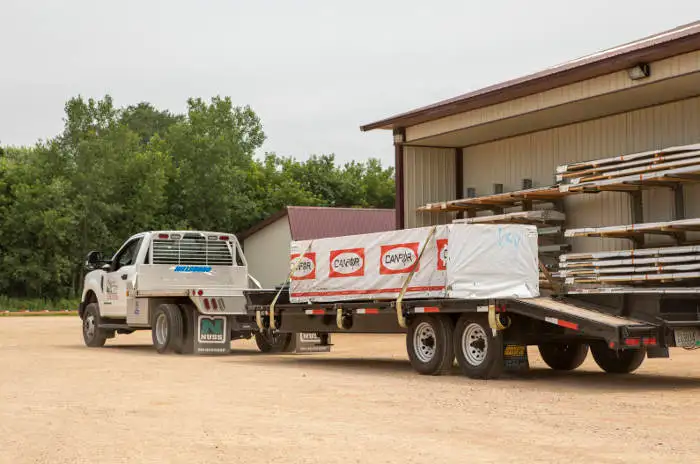
Dump Trailer Weight
When empty, a dump trailer can weigh anywhere from 1,100 to just over 10,000 pounds. The average weight for dump trailers is 4,500 pounds unloaded.
This type of trailer is extremely useful for transporting large amounts of fine or loose materials – everything from gravel to demolition waste. The hydraulic or powered dump receptacle makes unloading fast and easy.
The smallest dump trailers have a gross vehicle weight rating of 3,000 pounds. The largest models can weigh as much as 30,000 pounds. The average GVWR for dump trailers is around 12,400 pounds.

Large Travel Trailer Weight
A large travel trailer – anything around 20 feet or longer – has an average weight of about 6,700 pounds. Specifically, this refers to the travel trailer dry weight. This weight is largely dependent on the types of features and how many axles the trailer has.
Some larger travel trailers only weigh about 4,500 pounds, but the largest are around 9,000 pounds. 5th wheel camper trailers weigh even more.
When fully loaded with cargo, supplies and fluids, the gross vehicle weight rating of a travel trailer can vary from 6,300 to 10,500 pounds. The average cargo capacity of a bumper pull travel trailer is 1,600 pounds.
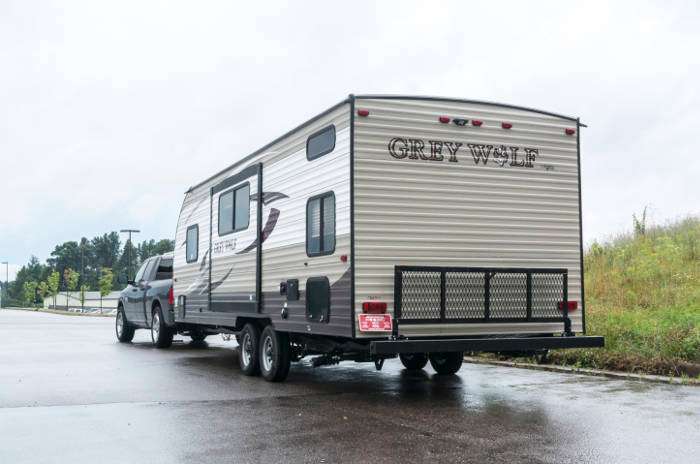
Gooseneck Flatbed Trailer Weight
Gooseneck flatbed trailers and utility trailers generally have higher weight ratings than their bumper pull cousins. A typical gooseneck flatbed trailer weighs about 7,000 pounds without cargo.
Smaller gooseneck flatbeds can weigh as little as 4,700 pounds, but the largest are upwards of 10,000 pounds.
For gross vehicle weight ratings, gooseneck flatbed trailers are built for heavy-duty hauling, whether it’s construction materials, farm equipment or automotive toys. Some are only rated for a maximum weight just under 16,000 pounds. Heavier-duty options are rated up to 36,000 pounds.
The average load capacity for gooseneck flatbed trailers is 16,000 pounds.
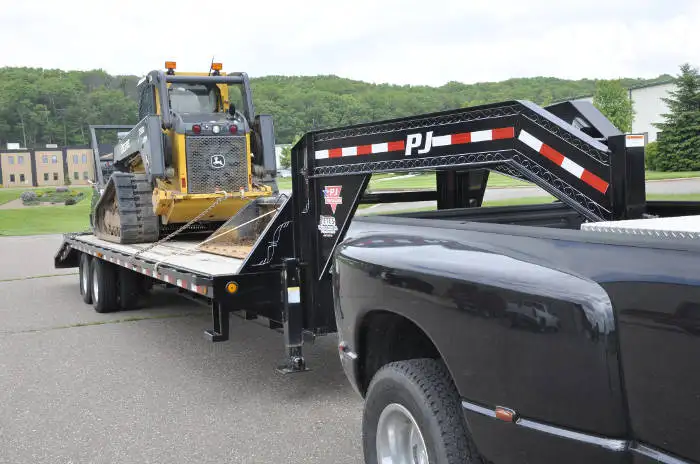
Large Livestock Trailer Weight
Larger livestock trailers range in weight from 4,200 to nearly 11,000 pounds when unloaded. With animals and cargo on board, that range increases up to 24,000 pounds (GVWR).
Livestock trailers are fairly diverse in their design and size. For example, a 20-foot aluminum bumper pull livestock trailer will be much lighter than a 40-foot steel gooseneck horse trailer. Some livestock trailers are also equipped with wash stalls, a living space and other features, adding to the overall weight.
The average empty weight for large livestock trailers is about 7,300 pounds. For load capacity, the average is around 11,400 pounds.
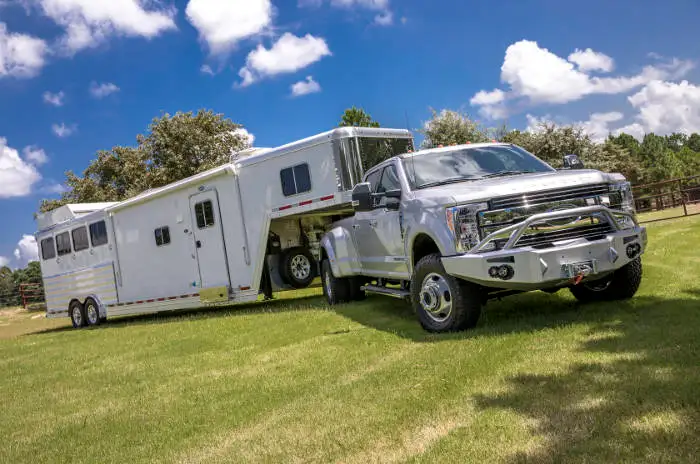
Toy Hauler Weight
A toy hauler is a bumper pull, 5th wheel or gooseneck trailer with a living space and a large compartment for transporting ATVs, UTVs, dirt bikes and other recreational motorsport vehicles.
Toy haulers, when unloaded, range in weight from 3,600 to 11,400 pounds, with an average of about 7,600 pounds.
Because they’re built for transporting smaller vehicles, toy haulers generally have a higher cargo capacity. The average is about 10,000 pounds.
Gross vehicle weight ratings for toy hauler trailer can vary from just under 15,000 to over 22,000 pounds.
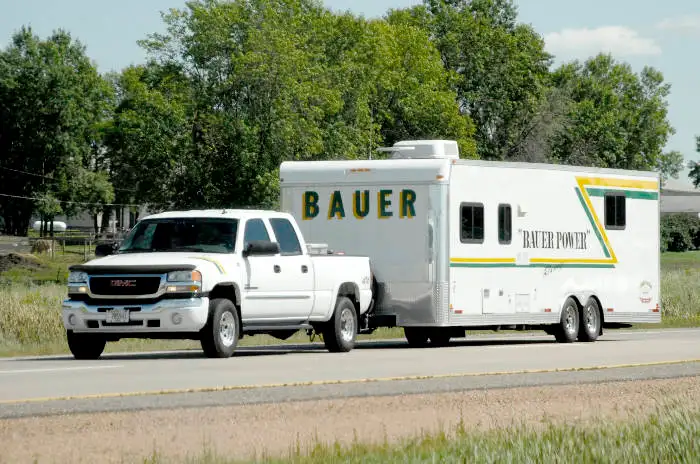
5th Wheel Camper Weight
5th wheel campers have an average weight of 12,700 pounds, empty and unloaded. Smaller models weigh as little as 5,000 pounds, while the largest 5th wheel camper trailers weigh up to 16,000 pounds.
To allow plenty of space for camping gear, equipment, cargo and fluids, the average load capacity is 6,000 pounds.
When fully loaded and ready for towing, most 5th wheel campers have a gross vehicle weight rating between 17,000 and 20,000 pounds.
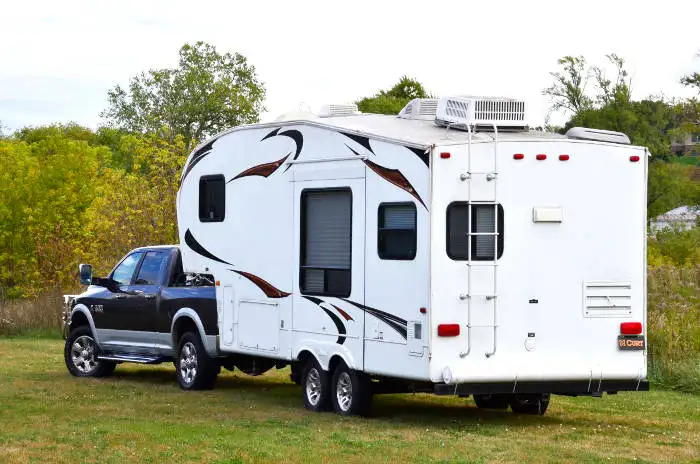
1. How much does a camper weigh?
A camper can weigh anywhere from 500 to 20,000 pounds. It all depends on the style of the camper. For example, a teardrop camper usually weighs about 1,500 pounds unloaded, while a 36-foot 5th wheel camper can weigh as much as 15,000 pounds, even when empty.
2. How much does a teardrop trailer weigh?
A teardrop trailer is one of the smallest camper types and one of the lightest. They typically weigh between 500 and 3,000 pounds, but the average is closer to 1,500. Some teardrop camper trailers have a gross vehicle weight rating as high as 4,000 pounds.
3. How much do pop up campers weigh?
Pop up campers weigh between 1,400 and 4,000 pounds. When empty and unloaded the average weight for pop up campers is about 2,300 pounds. However, they can also carry an average cargo load of 1,100 pounds. For maximum vehicle weight, a pop up camper can range from 2,700 to 4,000 pounds (GVWR).
4. How much does a small camper weigh?
A small camper can weigh anywhere from 500 pounds to 4,500 pounds, depending on the style. Teardrop campers, pop up campers and shorter travel trailers can all be classified as small campers. The average weight of a teardrop camper is about 2,000 pounds with cargo, and the average for small travel trailers is about 3,000 pounds.
5. How much does a travel trailer weigh?
Travel trailers vary in weight from 1,200 to almost 9,000 pounds. They come in various lengths, styles and builds, allowing for a diverse weight range. Smaller travel trailers have an average maximum weight of about 3,500 pounds (GVWR). Some larger travel trailers can max out at over 10,000 pounds when fully loaded up.
6. How much does a 5th wheel weigh?
5th wheel trailers are one of the heaviest types of trailer, with an average empty weight of about 13,000 pounds. The average gross vehicle weight rating for 5th wheel trailers is around 18,000 pounds, but some are as much as 20,000. Additionally, gooseneck trailers with a 5th wheel conversion can be even heavier.
7. How much does a boat trailer weigh?
Boat trailers by themselves can weigh as little as 100 pounds or as much as 4,400 pounds. The weight is determined by the length of the trailer and the type of boat or boats it is designed to carry. For example, jet ski trailers are about 300 pounds on average. Standard fishing boat trailers usually don’t weigh more than 1,000 pounds. Large yacht trailers, even without a boat loaded on, can easily be over 4,000 pounds.
8. How much does a boat and trailer weigh?
A boat and trailer together can weigh anywhere between 900 and 35,000 pounds. For small fishing boats and jon boats, the total weight for the boat and trailer ranges from 900 to 6,000 pounds. On the other hand, a heavy-duty yacht trailer and its craft together can easily weigh beyond 30,000 pounds.
9. How much does a horse trailer weigh?
Horse trailers vary in length, construction and features. A basic, aluminum single-horse trailer usually weighs less than 3,000 pounds. On the other hand, 12-horse trailers or horse trailers with a living space, elaborate wash stalls and other equipment can weigh upwards of 20,000 pounds.
10. How much does a 2-horse trailer weigh?
2-horse trailers weigh between 2,000 and 8,000 pounds. Some are more simple and constructed from lightweight materials. Others are more elaborate and longer, even though the horse capacity remains at 2 maximum. The average load capacity for a 2-horse trailer is about 4,000 pounds.
11. How much does an enclosed trailer weigh?
The weight of an enclosed trailer can fluctuate from 400 pounds to more than 20,000 pounds, depending on the style of the trailer and whether it is loaded with cargo or not. For example, a small, basic, enclosed utility trailer, empty of all cargo, may only weigh 500 pounds. Conversely, a toy hauler loaded up with a few ATVs might weigh in at 22,000 pounds.
12. How much does a car trailer weigh?
An unloaded car trailer usually weighs between 1,500 and 3,000 pounds. Gooseneck-style car trailers can weigh over 10,000 pounds. The construction, length and number cars the trailer is built to transport can make a huge difference. When loaded, the weight of some car trailers can increase to as much as 36,000 pounds.
Warning! The trailer weights listed on this page are intended to be a general guideline only. The actual weight and ratings of your specific trailer will vary.

The Savvy Campers

What does the Average Travel Trailer Weigh (With 15 Examples)
We researched 15 popular travel trailers from different manufacturers, looked into different lengths, and different styles and found some good answers to the average weight of a travel trailer. Travel trailers vary on weight per foot, this could be a sign of quality, or a sign of using heavier materials. We dive down into average weights below.
What does the average travel trailer weigh?
From our research of 15 examples of popular travel trailers, the average travel trailer weighs 5,215 pounds or about 191.43 pounds per foot of length. These numbers are dry weight from the manufacturer with no supplies, water, gear, foot, or any other items installed.
When searching for a travel trailer, there are several types, sizes, and they all have different weights. We have seen a 19’ travel trailer weigh 3,500 pounds and a 19’ travel trailer weigh 5,600 pounds. This difference in weight can be caused by several factors, how well it is built, how much insulation it has, does it have hardwood cabinets, is it wood frame or aluminum, and many other factors.
Average Camper Weight
We have searched the top 15 examples of popular travel trailers and found that on average, travel trailers weigh 5,215 pounds and weigh 191.43 pounds per foot of length. Different factors can cause these varying weights, but most trailers quality on this list are similar.
*Weights listed as dry weight are empty from the trailer manufacturer
What is Dry Weight?
Dry weight is a weight that is listed on the side of a travel trailer from the manufacturer. Dry weight that is listed from the manufacturer can be very misleading. Some manufacturers include two filled propane tanks and batteries in their dry weight calculations, and some manufacturers don’t even include the installed awning as it is listed as an option, which is in most cases mandatory.
To find your exact dry weight on your trailer, unload all of your gear, it is also best to leave on propane tanks and batteries, and go to your local weigh station. Once you have weighed with the trailer, unhitch your trailer from your vehicle and weigh just your vehicle. Subtract these two numbers, and you will have your travel trailer dry weight.
Gear and Fully Loaded Weight
To figure out how much weight you are loading into your RV to make sure you are within your loaded specs, you can complete this in two methods, the scale method and the weigh method .
Utilizing the scale method, you need to know your dry weight by weighing at your local weigh station or dump. First you will bring a scale down to the entrance of your RV. Next you will load your RV with all of your gear and supplies, but before you set your items down, take a weight of yourself holding the gear and subtract from your weight without gear. This will require a notepad to document the weight you have added. This method will take some time, but is simple to do at your house.
The second method to find your exact loaded weight would be to take a dry weight from your local scale. Now load up your trailer with all of your gear and go to the weigh station again. This will give your typical loaded weight. Every time you load up you may have different amounts of gear or food, but you will know if you are at risk of being overloaded or not.
When taking these weights, you will want to make sure you are staying within your cargo carrying capacity (CCC) of your trailer. This will be your dry weight subtracted from your gross weight. Typically your CCC is listed on your trailers sticker on the side, or in your door. You will also want to make sure to include the amount of water you will be loading into your trailer into your calculations. A gallon of water weighs 8.34 pounds. If you have 20 gallons of water, you would add another 166.8 pounds to your weight.
Slides have a high weight ratio for their size. Usually, if you have a travel trailer with a slide, this feature adds about 800 pounds for the special mechanical gear, frame, and motors. In most cases, a slide is always worth having the extra space, but if you have a specific weight limit you need to meet, you may want to forgo the slide addition. In addition to slides being on the heavy side, they can cause more maintenance and repair and could be a bad idea if you are looking for a smooth turn key trailer.
When determining if you need a slide, read our article on what to look for when buying a travel trailer .
Full Water Tank Weights
Full water, grey, and black tanks can weigh a lot on a travel trailer. For example, our RV has 31 gallons of fresh water capacity plus 6 gallons for the hot water tank. Both the black and grey tanks are 25 gallons each. In total, we can add 87 gallons of liquid in addition to our items in our travel trailer or another 725.58 pounds. Our travel trailer has a high CCC, but some others we have seen only give you about 800 pounds, so with full water tanks, you could not add any gear safely.
We usually fill our water tank about 50% before we travel so we have some water if we need to make a pit stop. Also, we have found some extra weight lower to the ground makes our trailer handle a bit better on the drive. We do travel sometimes at 100% full, but only if we are going off grid.
Theoretically, you would never have the fresh, black, and grey tanks full due to the fact that if you use water to wash, you are moving it from the fresh water to the grey water. The same goes for black tank usage. After a trip, we may drive back with 25% capacity in the fresh, 25% full in the black, and 50% or more in the grey. Read about how long fresh , grey , and black water tanks last.
Keep Towing Vehicle at 80% Capacity
When you are towing your trailer, you want some leeway in your towing capacity. Typically trailer guides recommend 20% extra capacity so you do not overwork your vehicle. This means, if you have a towing capacity of 10,000 pounds, you should only tow 8,000 pounds of trailer, gear, and water. Extensive gear in the back of a pickup could reduce this number as well.
In our case, our truck can tow 8,300 pounds. Our travel trailer dry weight is 3,700 pounds, add 258 pounds for a full tank of water, 500 pounds of accessories (batteries, awnings, propane, etc) 500 pounds of gear (bbq, chairs, generator, gas, power cable, etc.) and another 250 pounds for food and clothing. To estimate on the high side, this could make our trailer weigh 5,208 pounds or about 63% of our towing capacity. We make long trips through high mountains so we wanted some more leeway than 20% extra. We may be overestimating our wet trailer weight, but you can see how if you only had 800 pounds of cargo carrying capacity, you could get in trouble very fast by exceeding your weight.
½ ton Towable Travel Trailers
Many manufacturers are trying to trick consumers by producing marketing for ½ ton towable travel trailers . This may be acceptable in some cases, but we have seen one manufacturer with a 7,306 pound dry weight trailer they are trying to pass along as half ton towable. Technically it could be, but it may not be the best idea and certainly couldn’t be towed with older rigs.
Read our articles about our favorite travel trailers under 5,000 pounds and 3,000 pounds .
Towing Capacity
When checking your towing capacity, always look for the capacity of your specific vehicle. Some general guides may not differentiate your vehicle with a certain gear ratio and motor with another. You can search by your specific VIN to find the options on your vehicle if you do not have an original window sticker to make reference to. For a 1500 Dodge in 2006, one model tows 3,300 pounds and another 1500 with different options tows 8,900 pounds. Different items that could change your towing capacity could be engine size, wheel size, gear ratio, transmission, and bed size if the towing vehicle is a pickup.
To achieve the stated towing capacities, you may need a weight distribution hitch. Read about our favorite model here.
Related Questions
How much does a 16′ travel trailer weigh?
Using the 15 models we pulled weights from and an average weight of 191 pounds per foot, a 16′ travel trailer should weigh about 3,056 pounds.
How much weight do you add to a travel trailer?
On average, you may add 166 pounds of water to fill your 20 gallon tank, another 250 pounds of accessories such as propane and batteries, as well as your gear and food which could be about 300-400 pounds. You can easily add 700-800 pounds to your travel trailer.
Be the first to be notified about FREE tips, hints, coupon codes, and email-exclusive information. All for FREE!
Related Posts:

Similar Posts

10 Steps to Fix Camper Delamination
Keeping a travel trailer in good condition requires a lot of upkeep and responsibility that sometimes owners have not always thought about. One of the issues a travel trailer can have that will need to be fixed as soon as possible is being able to fix the fiberglass or outer exterior coating when it begins…
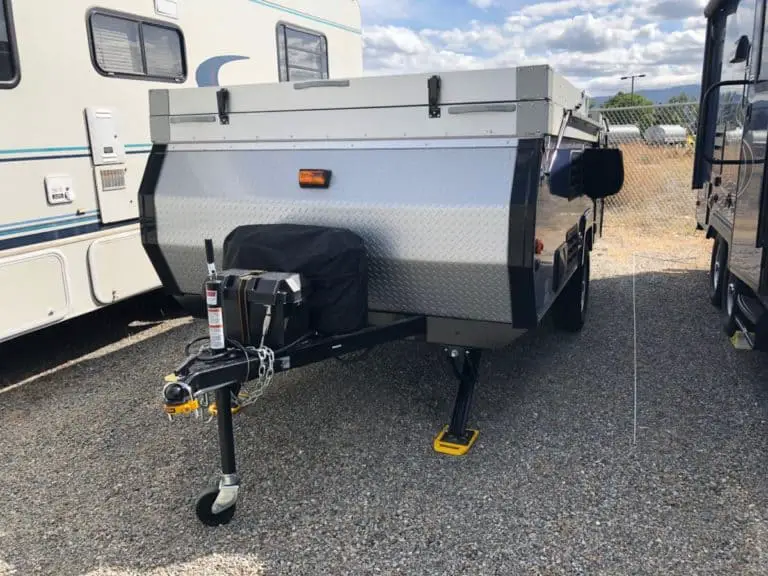
The Best Way to Clean and Waterproof Your Popup Camper’s Canvas
Popup campers are great for the low-maintenance traveler, but cleaning the canvas popouts is necessary for keeping dirt and mildew at bay. Regularly cleaning and treating the canvas can help it last longer, and keep harmful elements like mold and mildew out of your camper. Knowing how to clean the canvas properly will keep your…
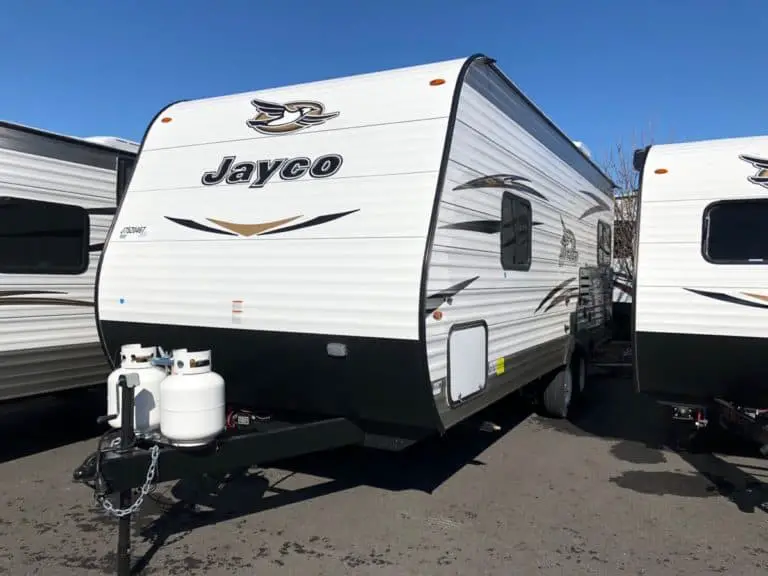
Can you put vinyl siding on a travel trailer?
No matter if you are buying a renovated older trailer that needs some extra help or you have an older trailer that you have had for years and needs some extra love, knowing what to put in place of your old siding is important. Many people look for different options to replace their siding based…

Expert Tips for Cleaning Your RV Cover: A Step-by-Step Guide
RVs are a great way to enjoy the outdoors and explore new places with your family. But, for it to last, you must ensure that your RV cover is clean and well-maintained. Regularly cleaning your RV cover will help protect it from the elements and prevent future dirt buildup. You can clean an RV cover…

What To Look For In A Used Travel Trailer And How To Get The Best Deal
You are in the market for a used travel trailer; however, due to the large number of online platforms available for selling previously owned items, it can be difficult to know if you are getting a good deal or not. With so many things to consider, you may be wondering what you should look for…
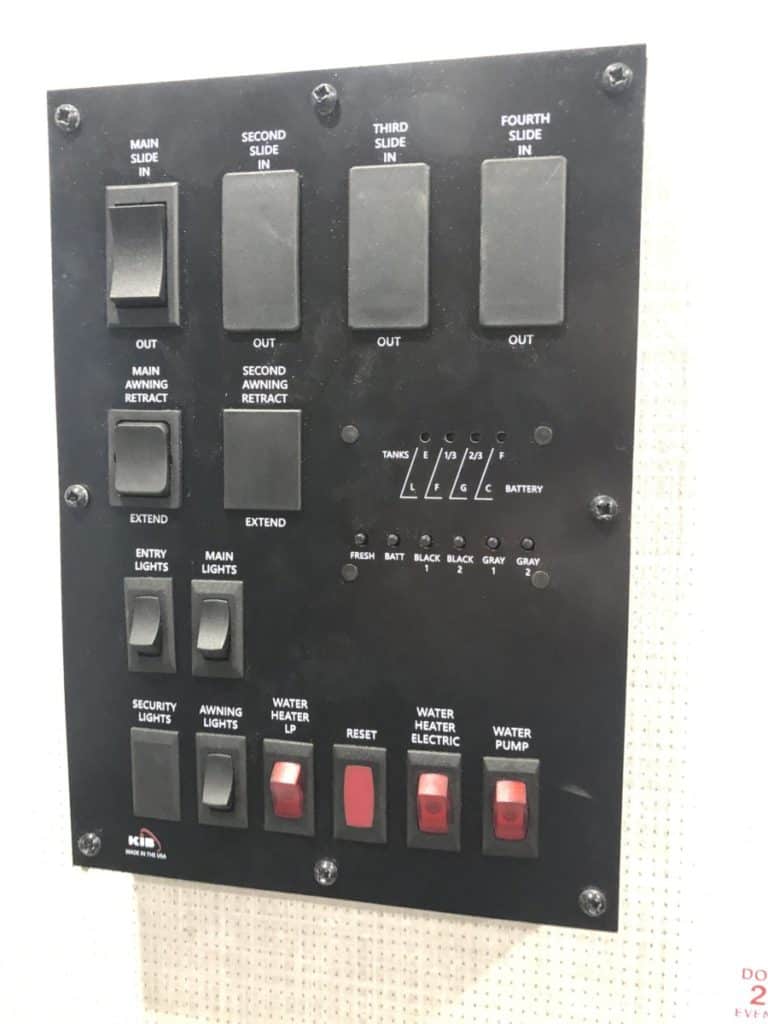
What to Do If My RV Circuit Breaker Keeps Tripping and How to Fix It?
Whether it is the beginning of the season or the end of it, the circuit breaker in your RV could trip. It’s the last thing you want, especially if you are in the middle of a trip. It is even worse when your RV circuit breaker keeps tripping. Understanding why it is tripping is key…
Join our Newsletter to stay up to date on the latest RV topics and receive our FREE RV Inspection Cheat Sheet Today. Use this tool to inspect new or used campers you are looking at purchasing.
No thanks, I’m not interested!

The Average Weight of Travel Trailers (Including Tips for Tow Weight)
An American institution since the 1920s, travel trailers are for those outdoor enthusiasts who need a lot of sleeping and living space and would rather drive a tow vehicle than get behind the wheel of a massive RV. Given that travel trailers are comparable in size to some RV classes, exactly how much do these trailers weigh?
The average weight of a travel trailer is between 1,200 to 8,700 pounds and up. You’ll need a heavy-duty pickup truck like a Ford F-150 or a Nissan Titan XD to haul that much weight. An SUV is also a suitable towing vehicle.
In today’s article, we’ll tell you everything you need to know about travel trailer weight. We’ll even present a list of current travel trailer models and their accompanying weights. You won’t want to miss it!
What Is a Travel Trailer?
First, to be clear, let’s talk about what a travel trailer is.
Travel trailers go by many names, everything from caravans to campers to towed trailers. They originated between Canada and the United States sometime in the 1920s. The bold lovers of the open road that drove travel trailers at the time were known as tin can tourists.
Then, in the decades to follow, everyone realized how cool travel trailers were. People even started living in them, earning the trailers another name: the house trailer.
Today, travel trailers are very much livable, especially compared to other types of campers that don’t afford nearly as much space. Spending time in a travel trailer is like living in a ranch-style home. Everything is on the same floor and spread horizontally across the length of the trailer.
Travel trailers will feature at least one bedroom. You’ll have a kitchen nook and perhaps a dedicated living space as well. The standard size of a travel trailer is between 13 and 40 feet. The bigger trailers can accommodate 10 people comfortably, while smaller to mid-sized ones might halve that capacity.
If you feel like your travel trailer is somehow too small and cramped, you can always look for a model with slide-outs. Some travel trailers feature fabric pop-up walls like a pop-up camper while others have slide-out walls built from the same hard material as the camper walls, ceiling, and floors.
This Is How Much the Average Travel Trailer Weighs
Like other types of trailers, travel trailers are available in many sizes and configurations. That, as we’ll talk about a little later, can influence their weight. That’s why on the lighter side of the scale, a travel trailer can weigh 1,200 pounds to about 4,000 pounds.
A trailer of this size will be smaller, so it will lack the spaciousness that bigger models are known for. You might have fewer designated rooms or spaces, and you certainly won’t be able to accommodate 10 passengers on a travel trailer of this size. Maybe you’ll be able to fit five people, but it could be even less, like three or four.
Larger travel trailers can weigh 5,000 to 8,700 pounds, sometimes even closer to 9,000 pounds or into 10,000-pound territory. In this weight class are the largest, longest, and most inclusive travel trailers that money can buy. You’ll have access to more space, a greater number of amenities, and features that make your travel trailer your new home away from home.
18 Real Examples of Travel Trailer Weights
If you’re looking to buy your first travel trailer, you don’t want weight generalizations. You need to see specific numbers associated with certain models. We’re here to deliver. In this section, we’ll look at current travel trailer models from all your favorite manufacturers, including Jayco, Keystone RV, Forest River RV, and more.
- 2021 Keystone RV Springdale 1740RK: 4,039 pounds
- 2021 Keystone RV Hideout 19RBWE: 4,308 pounds
- 2021 Keystone RV Bullet Crossfire 2200BH: 4,328 pounds
- 2021 Keystone RV Passport SL 282QBWE: 6,050 pounds
- 2021 Forest River RV Cherokee 294GEBG: 10,985 pounds
- 2021 Forest River RV XLR Hyperlite 3016: 8,853 pounds
- 2021 Forest River RV Wildcat 262RSX: 6,918 pounds
- 2021 Forest River RV Ibex 23RLDS: 7,660 pounds
- 2022 Jayco Jay Feather: up to 6,370 pounds
- 2022 Jayco Jay Feather Micro: up to 3,975 pounds
- 2022 Jayco White Hawk: up to 7,025 pounds
- 2022 Jayco Eagle HT: up to 9,500 pounds
- 2021 Airstream Flying Cloud: 6,000 pounds
- 2021 Airstream Pottery Barn: 7,600 pounds
- 2021 Airstream International: 6,000 pounds
- 2021 Lance Camper 1575: 3,700 pounds
- 2021 Lance Camper 2375: 7,400 pounds
- 2021 Lance Camper 2465: 7,800 pounds
Check out the following lightweight travel trailers.
Travel Trailers Under 2,000 lbs.
Travel Trailers Under 3,500 lbs.
Travel Trailers Under 2,500 lbs.
Travel Trailers Under 4,000 lbs.
What Influences the Weight of a Travel Trailer?
After reviewing the above selection of travel trailer weights, you can’t help but wonder why some are around 4,000 pounds and others topple 9,000 pounds or even clock in at five-figure weights. Is it size alone or are other factors at play?
Indeed, they are! Let’s explore in this section why some travel trailers are heavier than others.
The obvious determining factor is the size of the travel trailer. A smaller travel trailer will never weigh as much as a larger one because there’s less to it.
The travel trailer weights we provided in the last section accounted for the vehicle when full since everything that goes on a travel trailer makes it weigh more. That includes any gear you bring onboard as well as things you might not really think about such as fluids.
From water to coolant, engine fluid, and brake fluid, these liquids have weight. A gallon of fluid is approximately 8.345 pounds.
The tanks that are included with your travel trailer can also contribute to its weight.
At the very least, you’ll have a blackwater tank for waste and a freshwater tank to get a supply of water to your sink and even your shower and toilet depending on how luxe the trailer is. Some trailers have graywater tanks too, which hold sink waste.
The size of the tanks is commensurate with your travel trailer size. For smaller trailers, the tank capacity might be 28 gallons, while for larger trailers, the tank capacity can be as high as 78 gallons.
Knowing that fluid weighs about 8 pounds per gallon means that a full 28-gallon tank would weigh 224 pounds. A full 78-gallon tank weighs 624 pounds!
Then you have to consider your own weight as well as that of your other passengers. The average adult weighs 136 pounds. If you had 10 friends or family members enjoying life on your travel trailer, the overall weight of people alone would be 1,360 pounds.
Hybrid Status
Hybrid travel trailers are rising in popularity. One such model is the Forest River Rockwood Roo , an expandable travel trailer. Many hybrid trailers are a combination of pop-up campers and travel trailers like we talked about earlier.
The softer expandable walls of these trailers can reduce the overall weight.
Slide-Outs
Speaking of expandable walls, many travel trailer manufacturers include hard slide-outs with the trailer that are made of the same material as the rest of the vehicle (more on that in just a moment).
Slide-outs do more than make a significant difference in the spaciousness of your travel trailer; they add significant weight too. The average slide-out is 800 pounds. If your travel trailer has four slide-outs, then your travel trailer already weighs 3,200 pounds extra.
The travel trailer material is the last factor that influences its weight. Some trailers are stick-built with corrugated aluminum siding for the exterior shell. This means of building trailers can add 900 pounds to the weight of the trailer.
Fiberglass trailers feature an aluminum skeleton with a fiberglass shell. These trailers weigh less.
Tips for Towing a Travel Trailer
If you have prior towing experiences with smaller types of trailers, towing a travel trailer is a whole different ballgame. This section is full of tips that will gear you up for towing your travel trailer to and fro.
Know How to Calculate Your Travel Trailer Towing Capacity
Every travel trailer has a rated towing capacity, which refers to the max amount of towable weight for your towing vehicle. To determine the towing capacity of your travel trailer, you need to know its GCVWR and its curb weight.
GCVWR is short for the gross combined vehicle weight rating. The GCVWR is the total weight of your travel trailer and towing vehicle when both are fully loaded. If you calculate the gross vehicle weight rating or GVWR of your trailer, the GCVWR will typically be higher.
A travel trailer’s curb weight is how much the trailer weighs with all the standard equipment loaded in but no cargo, gear, or passengers.
By subtracting the GCVWR by the curb weight, you get the max towing capacity. This weight limit is not a suggestion, but rather, a rule you must abide by. Hauling more than your towing vehicle can handle can cause instability to your rig.
Your travel trailer can become detached, or it can tip your whole rig over. You’d be a risk not only to yourself, but to other motorists who are sharing the road with you.
It’s perfectly fine if your towing capacity is under the limit, but it should never go over.
Choose the Right Towing Vehicle
Some types of trailers are so light that you can get away with towing them using a car or even a motorcycle. That’s far from the case with a travel trailer, even a small one. You’ll need at least an SUV but likely a heavy-duty truck.
If your towing capacity is between 7,000 and 8,000 pounds, then a full-sized SUV should have the capacity for towing.
Here is a list of the SUVs with the greatest towing capacities:
- Land Rover Discovery – 8,200 pounds
- Land Rover Defender – 8,201 pounds
- Cadillac Escalade ESV – 8,200 pounds
- GMC Yukon – 8,400 pounds
- Infiniti QX80 – 8,500 pounds
- Nissan Armada – 8,500 pounds
- Lincoln Navigator – 8,700 pounds
- Dodge Durango – 8,700 pounds
- Ford Expedition – 9,300 pounds
As for which heavy-duty pick-up trucks are the best for towing a travel trailer, here’s what we recommend.
- Ram 1500 EcoDiesel – up to 9,290 pounds
- Toyota Land Cruiser – 8,100 pounds
- Nissan Titan XD – up to 12,500 pounds
- Chevrolet Tahoe – 8,600 pounds
- Chevrolet Colorado – 7,700 pounds
- Mercedes-Benz Sprinter – up to 7,500 pounds
- Dodge Durango – up to 7,200 pounds
- Ford F-150 – up to 12,200 pounds
- Ford Super Duty – 26,500 pounds
Select an Appropriate Hitch
To connect your towing vehicle to your travel trailer, you need a hitch. With so many hitch types out there, how do you choose one?
We recommend a receiver hitch, which has several classes that allow the hitch to handle huge amounts of weight.
Class 1 is for crossovers and cars and Class 2 adds minivans; neither are applicable when towing a travel trailer. Instead, you want at least a Class 3 receiver hitch, which is for trucks, SUVs, vans, and crossovers.
A Class 3 hitch has a two-inch receiver. Its gross trailer weight or GTW is 8,000 pounds.
Class 4 hitches for SUVs and trucks are also two inches. Their GTW is 10,000 pounds. The fifth receiver hitch class is known as Xtra Duty is and is a heavier-duty SUV and truck class. This receiver can tow between 16,000 and 17,000 pounds.
The Class 5 Commercial Duty receiver hitches are intended more for chassis cab trucks than recreational vehicles, so they unsurprisingly have huge amounts of towing capacity. We’re talking up to 20,000 pounds.
If your receiver hitch is a Class 3 to a Class 5 Xtra Duty, you should be able to tow even a heavier travel trailer.
Related Reading: Choosing the proper weight distribution hitch for your travel trailer.
RV Weight Terms to Know
All these these terms and weight limits can be found in the vehicle’s owner’s manual.
What is Gross Vehicle Weight Rating, GVWR?
GVWR stands for Gross Vehicle Weight Rating and refers to how much weight allowed of both your RV and cargo. Cargo needs to include the weight of your belonging, camping gear, passengers, and anything in your tanks (fresh water tank, grey tank, black tank). I always recommend traveling with near empty, if not empty, tanks. The GVWR is determined by the manufacturer.
What is Unloaded Vehicle Weight, or UVW?
Dry weight is also referred to as UVW, which refers to the weight of the trailer or RV alone. This does not include cargo, propane tanks, or another upgraded accessories.
What it Cargo Carrying Capacity? (CCC)
Cargo Carrying Capacity refers to the most weight that you can pack into your RV. This includes all your personal items and any water in your tanks. The CCC is determined by subtracting the UVW from the GVWR.
What is Tongue Weight? (TW)
Tongue weight or TW is the amount of weight an RV puts on the towing vehicles’s trailer ball. It is calculated by subtracting the weight of the towing vehicle from the weight of your vehicle and the trailer combined.
Related Reading: Choosing the Proper Weight Distribution Hitch for Your RV
What is GAWR?
GAWR stands for Gross axle weight rating. It is determined by the manufacturer as the load-carrying capacity of a single axle system.
Final Thoughts
The average weight of a travel trailer is as little as 2,000 pounds to 10,000 pounds and up. The size of the trailer, its materials, whether it features slide-outs, and the amount of gear packed inside all determine whether your trailer is lightweight or heavier-duty.
With all this handy info, you should feel confident choosing a tow vehicle for your travel trailer, hitching the trailer, and exploring more of the open road!
Geoff Southworth
I am a California native and I enjoy all the outdoors has to offer. My latest adventures have been taking the family camping, hiking and surfing.
Recent Posts
Best Heated Apparel for the Outdoors
Staying warm outdoors in freezing temperatures can be quite a challenge. I used to wear layer upon layer, but that only provided warmth for so long until I was cold to my core. Then I would be forced...
How to Choose an Ideal Rifle Scope for Hunting? 5 Experts Tips
Are you thinking of going hunting? Or wondering how to choose an ideal rifle scope for yourself? Read on to know what to remember before making the purchase. If you've recently stepped into the...

- Types Of RVs
- Tow Vehicles
- Maintenance & Repairs
- RV Power & Electrical Supplies
- RV Appliances
- Living In An RV
- Travel & Destinations
- RV Gear Buyer’s Guides
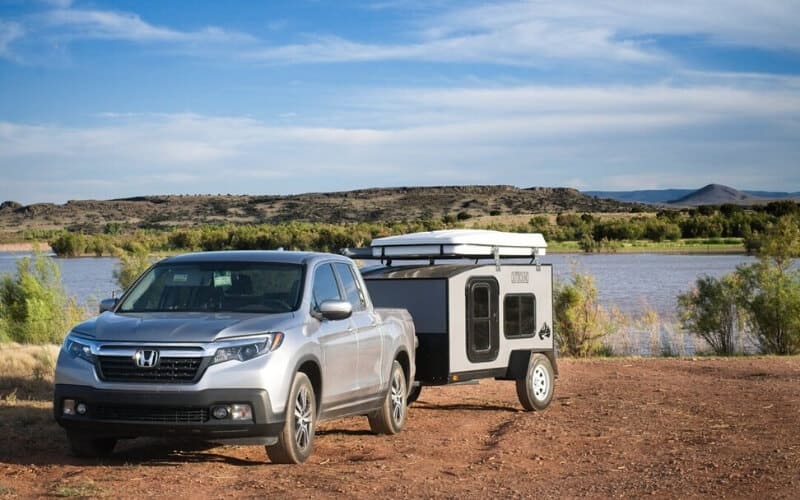
Average Travel Trailer Weight: How Much Does A Camper Weigh?
- Last Updated: May 24, 2024
- 10 minutes read
The weight of your travel trailer is an important consideration, since it determines which SUVs and trucks can safely haul the camper, how the trailer maneuvers on the road, gas mileage, and more.
There are lots of different types of travel trailers, ranging in style and size.
On average, how much does a camper weigh before you’ve packed it with your gear and belongings?
Depending on size, campers may vary greatly with regard to weight. Your camper could weigh as little as 500 pounds or more than 20,000 pounds. On the smaller end, teardrop trailers have a dry weight of about 1,500 pounds, and on the larger end, fifth wheel trailers have an average dry weight of around 15,000 pounds.
In this post, I’ve researched a lot of campers to help you get an idea for the different types of camper weights, understand why weight matters, how to manage weight in your camper, and more.
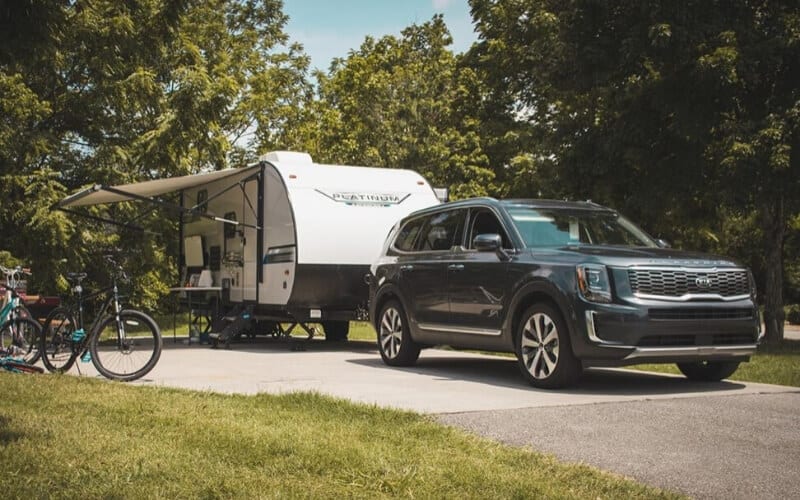
IN THIS ARTICLE
Different Kinds of Camper Weight Specifications
Travel trailers don’t just have a single weight. Keep in mind, your gear, supplies, water and fuel all add to the weight of the vehicle.
When looking at the weight specifications for your camper, there are three different areas to look at:
- Dry Weight (also known as ‘Empty Weight’ or ‘Unloaded Weight’) is the weight of the camper before you’ve loaded in your cooking gas, fresh water, or belongings.
- Cargo Carrying Capacity (CCC) is the total weight capacity for cargo, on top of the dry weight. For safety on the road, don’t load more than the rated CCC.
- Gross Vehicle Weight Rating (GVWR) is the total overall maximum weight that your camper can handle, including fluids and cargo. When considering your tow vehicle’s towing weight capacity, the GVWR is something you’ll want to pay particular attention to.
How Much Does A Travel Trailer Weigh?
The average weight of your travel trailer will vary depending on the type of trailer you have and how long it is.
Larger and longer campers tend to be heavier, while teardrop and pop-up campers are on the lighter end of the scale.
Most campers have an average dry (unloaded) weight of 2,550 to 6,600 pounds, and an average GVWR of 3,200 to 8,400 pounds.
Here are a few examples of popular types of campers and how much they weigh:
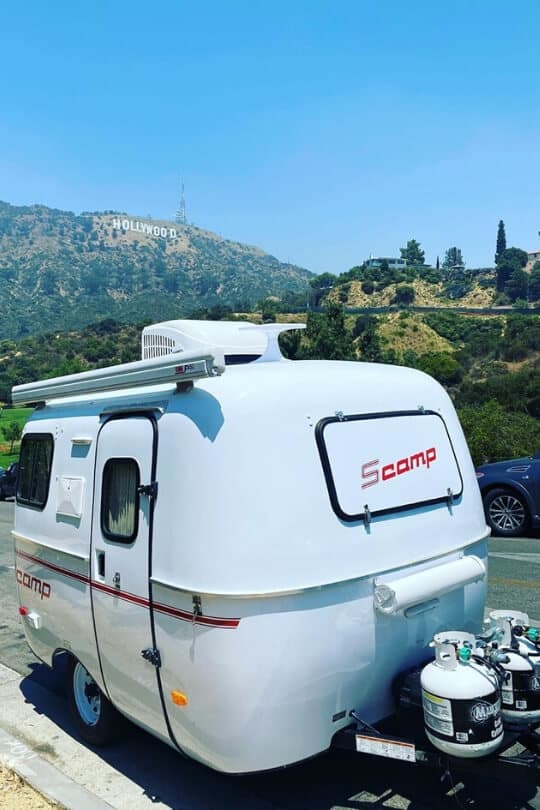
Why Does Weight Matter in a Camper?
The lighter your trailer, the better. The overall weight of your travel trailer matters for a few different reasons, including:
Your towing vehicle only has a certain capacity for towing a camper safely. You can’t just hook up any SUV to the trailer tow hitch and expect to hit the road.
Before you buy a camper, you should find out the towing capacity of your vehicle to make sure you can safely pull the trailer.
A heavier camper is also harder to tow the closer it gets to your towing vehicle’s towing capacity. You don’t want your camper to sway too much as it moves down the road or worse, to tip over as you go around a curve or make a turn.
Cargo Weight
If you’re hitting the road with your dune buggy and other heavy adventure cargo, your trailer’s cargo weight limits must be considered.
You might want to consider a toy hauler, since these trailers have a higher CCC to accommodate sports vehicles.
Just remember that your towing vehicle needs to be stronger in order to handle the extra weight of the camper itself as well as your adventure vehicles.
Fuel Efficiency
The heavier your camper and cargo, the lower your fuel efficiency and gas mileage will be.
A heavier travel trailer that’s loaded with gear will make for a more expensive road trip than a small, lightweight camper , so you’ll need to take this into account as you budget for your trip.
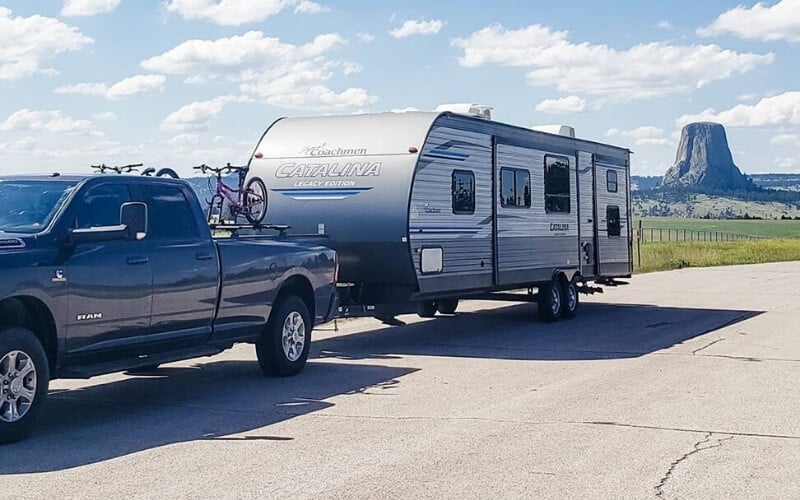
Top Things That Add Weight to Your Camper
As you can see, there’s a lot that goes into the weight of your travel trailer, beyond just the camper, itself.
Unless you’re traveling in a toy hauler and bringing along your adventure vehicle(s), your belongings and supplies probably won’t weigh more than a few hundred pounds, but there are some things that do add significant weight to your camper.
It’s important to keep these things in mind, so that you can keep your traveling weight below the specified GVWR and travel more safely.
Some of the heavier items that add weight to your travel trailer include:
Construction Materials
RV and camper manufacturers tend to build with lighter weight materials, especially in newer vehicles.
However, there are some modern trailers (such as Airstream travel trailers) that weigh more because they are built with heavier construction materials as part of their design and brand.
While Airstream trailers have an aluminum exterior, most travel trailers are built with fiberglass to make them more lightweight.
Interior fixtures and furniture also contribute to the vehicle’s weight, and more luxurious, residential-style construction may weigh more.
Construction materials and the interior furniture and fixtures are all included in your camper’s dry weight, but it’s a good thing to keep in mind before you buy a camper.
If you have a smaller SUV or towing vehicle with less capacity for hauling, you’ll need a lighter trailer, and therefore, one built with more lightweight materials.
Another heavy feature that’s included in dry weight but still needs to be considered is slide-outs, if your camper has them.
Although slide-outs have the benefit of creating more interior space when you’re parked, the heavy duty construction they require for stability will increase the overall weight of your trailer.
A single slide-out can add around 1,000 pounds to your camper’s dry weight.
Alternatively, if you need more interior space but still need a more lightweight trailer, you might consider models with a pop-up top.
Pop-ups can create a second level sleeping area or increase the headroom in your camper when you are parked, and don’t weigh nearly as much as a slide-out.
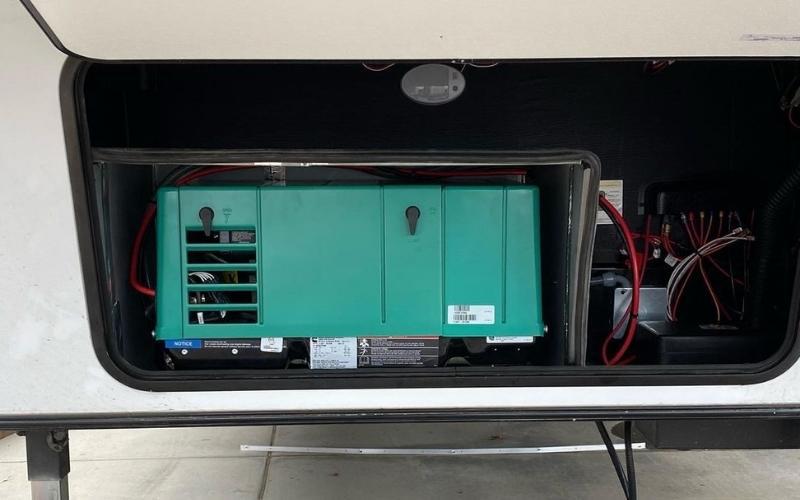
Generators & A/C Units
Many modern campers come equipped with generators and air conditioning units, but not all of them do.
If your trailer came with a generator and A/C unit(s), the weight of these systems and their fluids is included in the camper’s dry weight.
However, if you or a previous owner added the system, it’s not included and will need to be deducted from your available cargo carrying capacity.
In general, a portable generator weighs around 300 to 400 pounds, and each A/C unit weighs around 100 pounds. The higher the wattage, the more the system will weigh.
Water & Fuel
A heavy item that doesn’t count in your camper’s dry or unloaded weight specification is water.
Fuel and water are pretty heavy, and water is especially so, weighing nearly 8 pounds per gallon.
If your camper has a tank that accommodates 100 gallons of fresh water , you may be tempted to fill it up to the brim before a camping trip, but this could increase your cargo weight around 800 pounds!
If you’ll be camped at a campground with hookups, consider only filling up a few gallons before hitting the road to cut back on your vehicle’s water weight during travel.
Fuel for cooking (and/or heating) can also be heavy, but it’s a lot lighter than water and since campgrounds don’t have propane hookups, it’s more necessary to bring the full amount needed for your trip.
How to Efficiently Manage Weight in Your Camper
There are a few things you can do to keep your camper as lightweight as possible both while on the move and when parked in your campsite:
Make sure the weight is distributed evenly
Most camper manufacturers lay out the interior of each camper so as to evenly place heavier items and keep the dry weight distributed throughout.
As you pack your trailer, you’ll want to keep weight distribution in mind to avoid having your camper swerve or lean as you move down the road.
Get a good weight distribution system, and weigh the camper hooked up to your towing vehicle and disconnected from the towing rig in order to test the weight distribution.
Don’t travel with too many people
Consult your camper’s manufacturer’s manual for the maximum passenger count for your trailer.
Allowing more people in your camper won’t affect the weight distribution when you are traveling, since all passengers must ride in the towing vehicle, but even when parked, overcrowding your trailer can impact the weight distribution system negatively.
Even one person extra person weighing 150 pounds can make a difference, so stick to the maximum limit your camper’s manufacturer recommends.
Don’t over-pack, and get rid of the extras
There are some things that are a good idea to bring along, even if you don’t end up needing them such as safety equipment, a spare tire, and the tools to change it.
However, there are probably lots of other things that you just don’t need, such as extra personal belongings, kitchen items, full-sized toiletries , and spare tools.
Pack only what is absolutely necessary for your trip and the activities you’ll be doing, plus safety equipment just in case you break down or get stuck.
Don’t forget to check the exterior of your camper, and remove things you hardly ever use or don’t need for your trip.
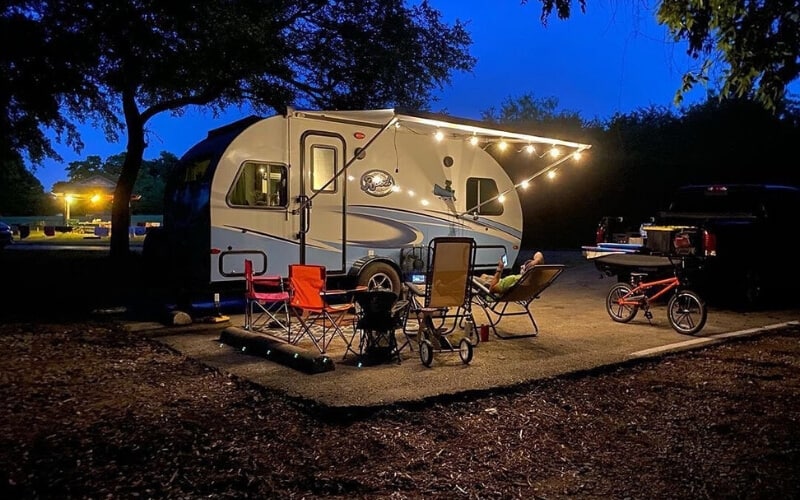
Keep your tires properly inflated
If your tires don’t have the correct tire pressure, a heavy trailer could cause you to have a flat or cause damage to the wheels and axels.
Before you leave on your trip, check the pressure on each tire to make sure it’s inflated properly.
Switch out any pocket or sliding doors for curtains
Many campers have sliding doors or pocket doors for the bedroom(s) or bunkroom, and these add weight.
You probably want some kind of covering for privacy, but you can switch them out for a more lightweight alternative such as a curtain.
You don’t even have to sew your own – although you certainly can – just buy a single panel drape or curtain for less than $20 at your local big box store such as Walmart or Target.
Replace old or damaged items with more lightweight pieces
If your furniture, storage compartments, counters or other fixed pieces are old or break, you can replace them with a lighter alternative or material.
IKEA has some excellent lightweight storage and furniture options that work great in a camper setup, and don’t cost a lot.
Use aluminum whenever you make repairs
If you need to patch any holes or fill any cracks in your camper, always use aluminum or other lightweight materials to keep your trailer’s weight down.
A Summary About Camper Weight
As I’ve discussed, your camper’s weight can vary a lot depending on the type and size of trailer you have.
Now that you know the average based on trailer style and length, you can find the right camper that has an appropriate weight for your towing vehicle and camping style.
Weight is definitely an important consideration when you’re camping and when you’re traveling with a camper, but there are some things you can do to keep it lighter and make traveling easier.
I hope the tips I noted will help you enjoy your trip, without having to worry about weight too much.
About Author / Aaron Richardson
Aaron Richardson is an expert RVer and the co-founder of RVing Know How. Aaron, along with his wife Evelyn, has been living and traveling in their Keystone Fuzion RV since 2017. Their adventures span across the country and beyond, including memorable RVing experiences in Mexico. Aaron's passion for the outdoors and RVing shines through in his writings, where he shares a blend of travel stories, practical tips, and insights to enhance the RV lifestyle.
![The 5 Best RV Microwave Convection Ovens To Buy In [currentyear] 12 Best RV Microwave Convection Oven](https://www.rvingknowhow.com/wp-content/uploads/2020/07/Best-RV-Microwave-Convection-Oven-150x150.jpg)
The 5 Best RV Microwave Convection Ovens To Buy In 2024
The 5 best rv waxes for fiberglass surface.

You Might Also Like
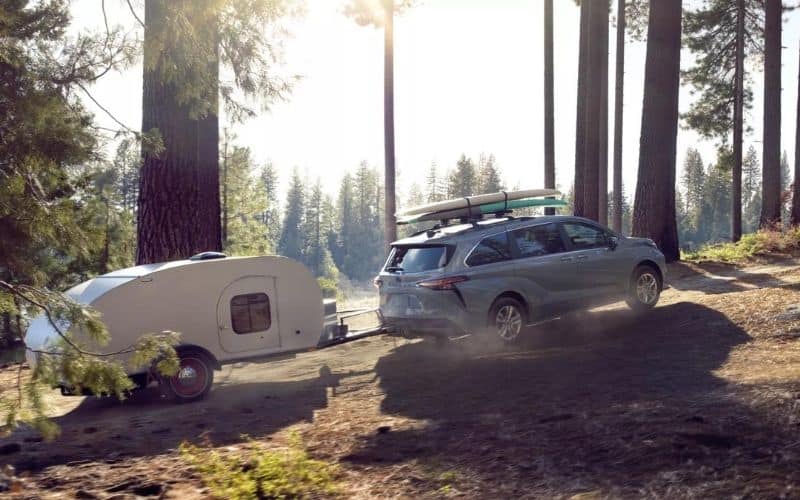
6 Small Camper Trailers You Can Tow With A Minivan
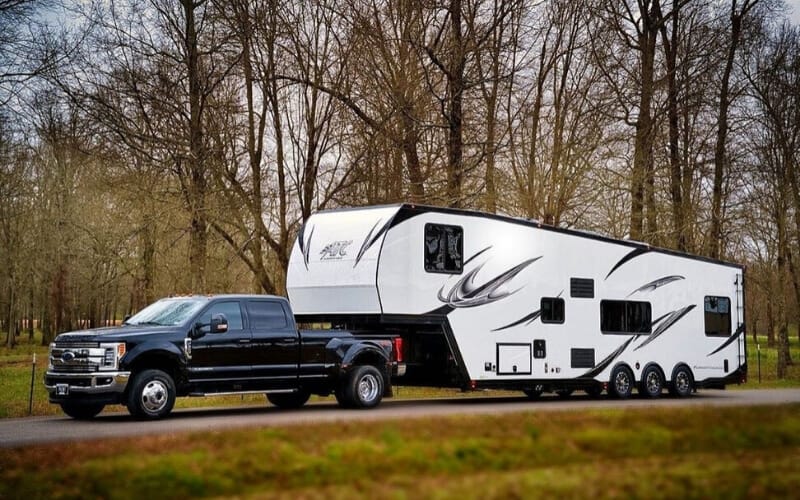
7 Excellent 5th Wheel Floor Plans With 2 Bedrooms For Families on the Go

12 Of Our Favorite RVs (Travel trailers & Motorhomes) with 2 bathrooms
Start typing and press Enter to search
Your privacy is important to us. This website uses cookies to enhance user experience and to analyze performance and traffic on our website. By using this website, you acknowledge the real-time collection, storage, use, and disclosure of information on your device or provided by you (such as mouse movements and clicks). We may disclose such information about your use of our website with our social media, advertising and analytics partners. Visit our Privacy Policy and California Privacy Disclosure for more information on such sharing.
- Owner Login
- Dealer Login
- Toy Haulers
- Fifth Wheels
- Travel Trailers
- Destination Trailers
- Tent Campers
Helpful Tools
- Find A Dealer
- RV Definitions
- Our Company
- Owners Page
- Forest River Corporate Home
- Privacy Policy
- Terms of Use
- Accessibility
- Forest River Apparel
Explore 2025 Salem Travel Trailers 26DBUD Floorplan
- Find Your Local Dealer
- Contact Salem
- Search Our Videos
- Local Dealers
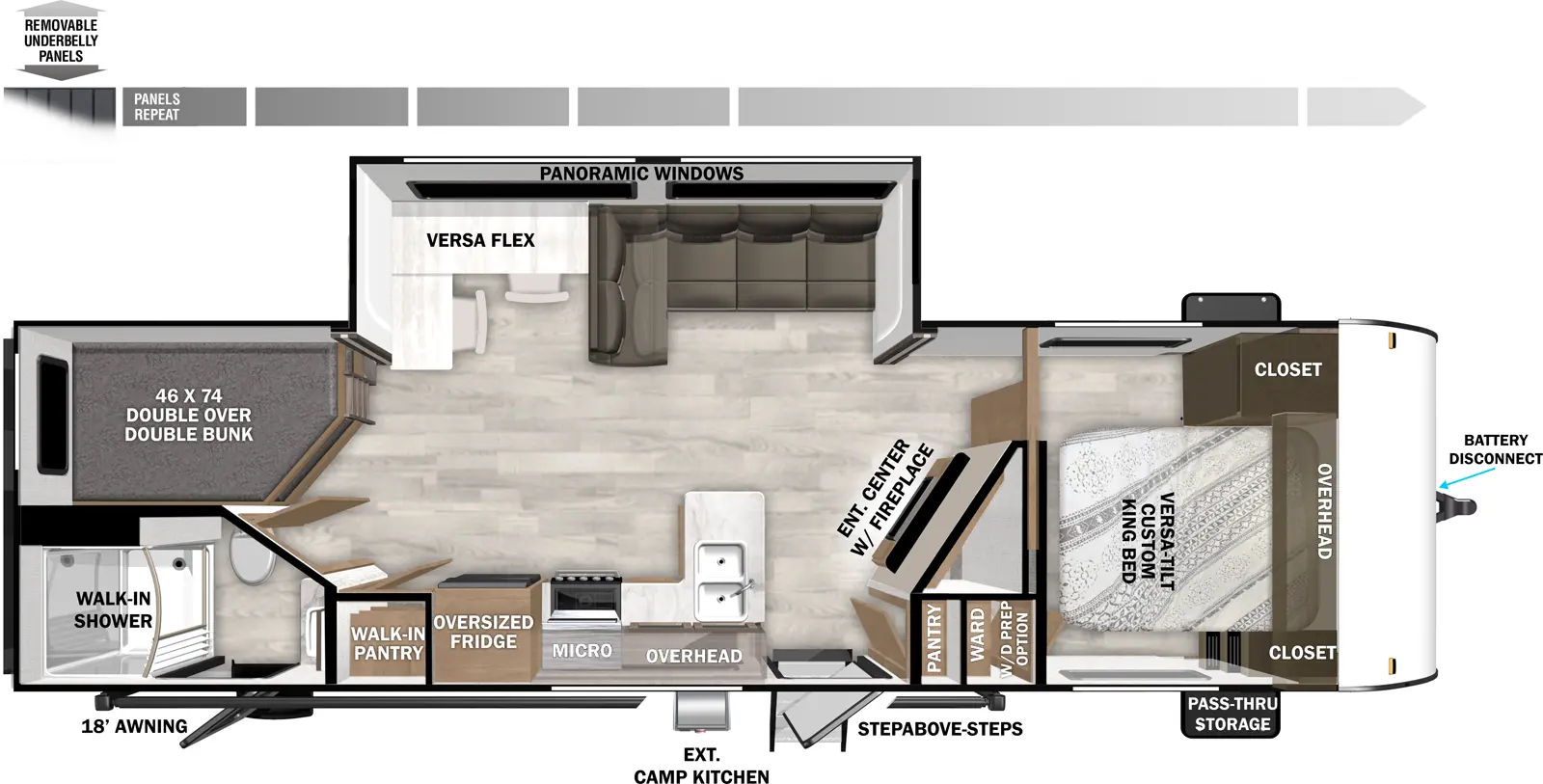
You must be logged in, or create an account to use the Forest River wish list.
Request a Quote
Request a quote for salem 26dbud floorplan, get update alerts, get update alerts for salem 26dbud floorplan, alert sections.
- Specifications
The 26DBUD is the perfect family travel trailer, with double bunks at one end and a queen bedroom at the other. You also get a fireplace (heater), full kitchen with glass-fronted cabinetry and large pantry, a U-dinette, and the customizable Versa-Lounge with Stow N Go Storage.
Salem 26DBUD Floorplan
Specifications definitions.
GAWR (Gross Axle Weight Rating) – is the maximum permissible weight, including cargo, fluids, optional equipment and accessories that can be safely supported by a combination of all axles.
UVW (Unloaded Vehicle Weight)* - is the typical weight of the unit as manufactured at the factory. It includes all weight at the unit’s axle(s) and tongue or pin and LP Gas. The UVW does not include cargo, fresh potable water, additional optional equipment or dealer installed accessories. *Estimated Average based on standard build optional equipment.
CCC (Cargo Carrying Capacity)** - is the amount of weight available for fresh potable water, cargo, additional optional equipment and accessories. CCC is equal to GVWR minus UVW. Available CCC should accommodate fresh potable water (8.3 lbs per gallon). Before filling the fresh water tank, empty the black and gray tanks to provide for more cargo capacity. **Estimated Average based on standard build optional equipment.
Each Forest River RV is weighed at the manufacturing facility prior to shipping. A label identifying the unloaded vehicle weight of the actual unit and the cargo carrying capacity is applied to every Forest River RV prior to leaving our facilities.
The load capacity of your unit is designated by weight, not by volume, so you cannot necessarily use all available space when loading your unit.

26DBUD Floorplan Salem Travel Trailers Features & Options
New features.
- Retro/Metal Redesign
- 4K Blade Lighting
- JBL Speakers – Interior/Exterior
- 4K Awning Blade Lighting
- TFL Cabinet Doors
- Heavy Duty Cabinet Hinges
- Fold-Out Trash Can
- Versa-Range (N/A 27RE, 28VIEW & 32RET)
- Versa-Range Spice Rack (N/A 27RE, 28VIEW & 32RET)
- Stylish Backsplash Update
- Versa-Flex: Desk, Dinette & Chaise (Most Models)
- Lock & Groove Shiplap Islands (where applicable)
- Luminous Arched Radius Panels
- Expanded Kitchen Window
- Stylish Roller Shades
- Elegant Curtain Rods and Curtains
- Sleek Single Bowl Sink
- Pet Step in Bedroom
- Backlit Arched Radius Bathroom Mirror
- Revamped Bedroom Layout
- Enhanced Floating Shelves
- TFL Black Walnut Entertainment Shelf
- Pre-Installed TV Brackets (Living Area & Exterior)
Best in Class:
- Versa Furniture
- Stow N Go Storage Solution
- MORryde™ StepAbove Triple Step (Entry Door) (N/A 36VBDS)
- Roof Mount Solar Prep
- Adjustable Textured Roller Shades
- Backlit Radius Bathroom Mirror
- Built-In Laundry Hamper in Bedroom
- Back-Up Camera Prep
- Flush Floor Slide-Out w/Marine Grade Flooring
- Exterior Accent Lighting
- Dimmable Interior LED “Blade Lighting” (Living Area)
- Heated & Enclosed Accessibelly
- LED “Blade Lighting” Under Awning
- 60K On-Demand Tankless Water Heater
- Platinum Package: Fiberglass Exterior, 200W Solar Panel w/30 AMP Controller
- Spare Tire & Carrier
- 15,000 BTU A/C IPO Standard 13,500 BTU
- 50 AMP Service w/Wire & Brace for 2nd A/C (Forced 28VIEW, 29VIEW & 32VERANDA)
- Washer/Dryer Prep (must check 50 Amp Service)(N/A 22RBS, 29VBUD, 31KQBTS, 32BHDS & 36VBDS)
- Outside Shower
- 2nd 13.5k BTU Air Conditioner w/50 Amp Service
- Power Stabilizer Jack
- 200W Solar Panel w/30AMP Controller

RV Zone is reader-supported. When you buy through links on our site, we may earn an affiliate commission. Learn more
How Much Does a Travel Trailer Weigh? (Explanation & Examples)

Writen by Tom Hank

Fact checked by Joseph Varney
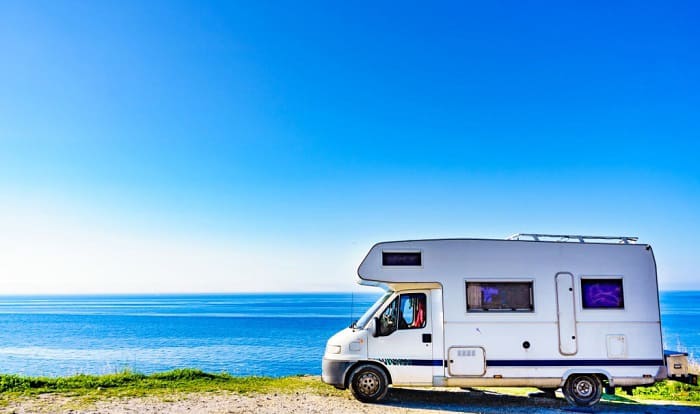
Before making any purchasing decision, carefully considering your travel trailer’s weight is crucial since this determines which kinds of trucks or SUVS will be able to securely tow the camper or how the trailer handles the road, fuel efficiency, and other aspects.
The secret to joyful and worry-free RVing is to keep track of your camping trailer’s total weight. However, measuring the vehicle’s weight is not as simple as putting it on a scale. Calculating the RV trailer weight is a difficult procedure that requires numerous examination.
Therefore, this discussion is the right place for those looking for a detailed breakdown of “How much does a travel trailer weigh?” In this article, I will deliver a comprehensive explanation on the weight of a camper, as well as approach other categories such as:
- Important camper’s weight terms to understand
- Elements influencing the trailer’s weight
Different travel trailers’ weights
Moreover, within each part of the discussion, we will include practical examples and tips to manage your camper weights in real situations. So, make sure to follow this post until the end!
Table of Contents
Important Camper’s Weight Terms to Understand
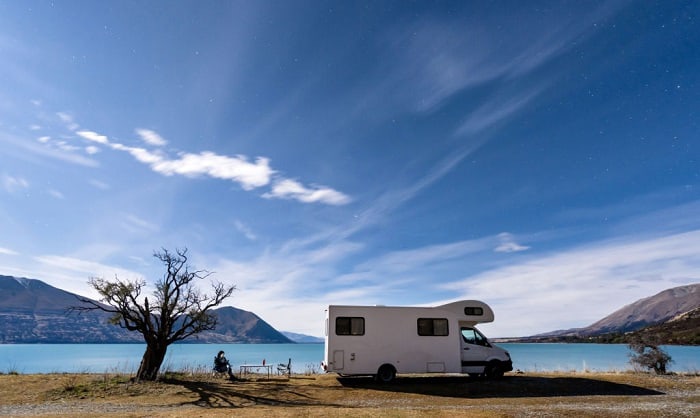
Before discussing more about a travel trailer’s weight, we need to understand some technical terms that are often used to describe the specification related to the weight and performance of each particular camper van. Continue reading to learn more!
UVW (Unloaded Vehicle Weight)
UVW or dry weight relates to the camper weights when it leaves the factory. Any dealer-installed extras, cargo, fluids, or LP gas are not included in the UVW. Before the travel trailer is ready to travel on the road, this is the basic structural weight.
The typical dry weight of a travel trailer ranges from approximately 1,000 to 9,000 pounds, but as a rough guide, the average camper container’s dry weight is around 5,200 pounds.
Towed units, as contrasted to self-driving modules, will be lighter but they will need a vehicle with the appropriate towing capacity to commute. Self-driving units are clearly not reliant on an additional towing vehicle, yet they will have a significantly larger dry weight.
Hence, before loading luggage and equipment, you should consider the type of your travel trailer as there are many differences between the dry weight in each kind. Moreover, selecting the right towing vehicle using dry weight is certainly crucial.
GVWR (Gross Vehicle Weight Rating)
Technically, the most relevant response to the issue “How much do campers weigh?” is GVWR. This weight is your trailer’s weight when your tanks are entirely full and the luggage container within the trailer is fully loaded.
Depending on extra amenities and the amount of the cargo load, the gross weight of the same travel trailer might vary. This is also the maximum weight your container should carry. Hence, The GVWR is said to be a very important factor to consider when determining the towing weight capabilities of your tow vehicle.
The best method to measure the total motorhome’s weight is to fill up all the tanks within your trailer, pack your equipment or supplies, then weigh everything in a truck scale. The ultimate weight should be below this figure to guarantee safety for you and your travel trailer.
CCC (Cargo Carrying Capacity)
This is the cargo’s total weight capacity. Don’t carry more than the recommended CCC for safety management. Subtract UVW, the weight of water supply, full tank weight, and sleep capacity load rating (154 lbs x number of bedding positions) from the GVWR to get the Cargo Carrying Capacity. Don’t forget to deduct any dealer-installed extras.
Tongue Weight
Tongue Weight, also known as Vertical Load Rating, is the maximum vertical weight that your hitch can support the trailer. Make sure you know how much your tongue loads before you start towing. If the weight restriction is exceeded, try relocating the contents to the back of the trailer. Likewise, the inverse is true. Move content ahead if the tongue weight is below the limit.
Sleeping Capacity Weight (SCWR)
This type of weight is supposed to be included in the CCC, however it has been separated recently so that trailer owners can customize their resting area easier. SCWR is calculated by multiplying the number of sleeping positions indicated by the manufacturer by 143 pounds.
Elements Influencing the Travel Trailer’s Weight

As we can see, there are many factors that contribute to your travel trailer weights than simply the RV itself. Therefore, it is critical to study these details to manage the weights of travel trailers efficiently and keep them under the GVWR for more secure travelling. Here are some components that add to your total camper weights:
Construction Materials
Lighter materials are used by RV and camper makers, especially in modern vehicles.
However, some latest trailers, such as Airstream motorhomes, weigh more due to its structure and brand, which includes the use of heavier building materials.
RV trailer weight is also affected by fixtures and furniture, and more luxury, residential-style designs may weigh more. Construction materials and interior furnishings are all included in the dry weight of your camper but it’s something to consider before you purchase any RV.
If you own a small SUV or towing automobile with less pulling capability, you’ll need a lightweight trailer, which means one made of lighter materials.
Another heavy item that is often included in dry weight yet still needs to be acknowledged is slide-outs. Although slide-outs provide additional interior space while parking, the heavy-duty structure required for stability will contribute to your trailer’s total weight.
A single slide-out may add up to 1,000 pounds to the dry weight of your trailer. On the other hand, slide-out models that come with pop-up tops are good options if you wish for extra interior space yet still want a lighter trailer.
Pop-ups are a great way to add a second level of sleeping space or more headroom to your camper while parked, and they are less heavy compared to slide-outs.
Generators and A/C systems
Although it is common for modern RVS these days to be equipped with air conditioning systems and generators beforehand, not all camper vans in the market come with these kinds of features, especially with second-hand travel trailers.
If your camper originated with a generator and/or air conditioning units, the weight of these devices and their fluids is factored into the dry weight of the camper. However, if you or a former owner installed the system, it isn’t included and must be subtracted from your CCC.
A portable generator typically weighs from 300 to 400 pounds, with each A/C unit weighing approximately 100 pounds. The greater the wattage, the heavier the system.
Fuel and Water
Water is a hefty item that does not count in the dry or unloaded weight of your trailer. Fuel and water are both rather heavy, with water weighing almost 8 pounds per gallon.
You might be persuaded to fill up your camper’s fresh water tank before a road trip if it holds 100 gallons, but this might add 800 pounds to your luggage weight! Therefore, you should only fill up a few gallons and continue to supply water after you have reached your way stations or destinations.
Meanwhile, even though cooking (and/or heating) fuel is likewise weighty, it is still much lighter than water. As most campsites don’t provide propane hookups, it’s more important to pack the entire quantity you’ll need for the trip.
Each kind of trailer serves a different purpose, and as a result, each trailer’s weight varies. Trailers come in a wide range of capacities, widths, or construction. Due to those differences, people may get confused while purchasing travel trailers which match their needs in terms of weight.
In the final part of this discussion, we will together go through each type of travel trailer and its weight specification so you can calculate your travel trailer and select the best one for your family.
5th Wheel Camper weight
The average 5th wheel weight of an empty 5th wheel camper is 12,700 pounds. The lowest 5th wheel weight is around 5,000 pounds, while the biggest camper trailer weigh up to 16,000 pounds.
The standard load capacity is 6,000 pounds, giving enough of room for camping equipment, tools, freight, and fluids. Most 5th wheel campers have a GVWR of 17,000 to 20,000 pounds when fully loaded and ready to hit the road.
Toy Hauler weight
When emptied, toy haulers weigh anywhere from 3,600 to 11,400 pounds, with an standard of around 7,600 pounds. Toy haulers include a bigger cargo capacity as they’re designed to handle smaller cars. The average weight is around 10,000 pounds.
Toy hauler trailer gross vehicle weight ratings range from 15,000 pounds to over 22,000 pounds.
Jayco Pop up Camper weight
The Jay Sport is one of Jayco’s pop-up camper models. Depending on the floor design, it weighs anywhere from 1,570 to 1,895 pounds dry. The Jay Sport’s GVWR varies between 2,250 and 2,750 pounds.
A-frame Camper weight
A-frame trailer is a special form of pop up camper. When unloaded, this style of camper often weighs between 1,200 and 2,300 pounds in general and 1,700 pounds in specific. With an average weight of 1,200 pounds, A-frame campers offer a significant amount of cargo space. This trailer’s gross vehicle weight rating ranges from 2,500 to 3,600 pounds.
Measuring your camper trailer’s weight is definitely not a simple task and the false calculation may lead to excess weight, which takes away the joy of your family during the camping trip. To prevent this from occurring, travel trailer owners will need to have certain knowledge on the camper trailer’s weight management.
Therefore, it is essential to understand how travel trailers weigh and manage their cargo capacity effectively. We hope that the above information and suggestions can help you determine your family camper’s weight and wipe out the worry of being overloaded.
Did you enjoy the article on how much does a travel trailer weigh ? Do you want to add anything else? Please let me know and leave a comment below.

Hi, I am Joseph. Carpe diem! Seize the day! That’s always been my life motto. If you haven’t seen some of the most beautiful places in the country, you are missing out on incredible adventures.
Written by Johnathan R. Smith • September 8, 2018 • 3:28 pm • Guides
Camper Weight Chart (10 RV Weight & Size Examples)

How Much Does A Camper Weigh?
The average camper weighs approximately 5,200 pounds , however this is only the dry weight of the camper and additional items need to be factored in when determining the total weight of the camper.
Lets discuss a few camper weight definitions you need to know when you are deciding upon your first trailer purchase and the average weight of the camper for towing capacity and safety reasons.
The potential legal and insurance ramifications should deter any ignorance because a lack of knowledge in this particular subject could be very costly.
There are laws and regulations in place that are meant to act as guidelines to keep you safe and those around you safe.
Okay, first, since you are curious about the weight of the trailers, let’s take a look at those before we get into the other weight numbers that you will need to know.
Example Camper Weights
- 1,545 Lbs (Unloaded Vehicle Weight) – 13 Feet – 2019 10RK Hummingbird Trailer
- 2,860 Lbs (Batteries and LPs Included) – 16 Feet – 2018 Sport 16RB Trailer
- 2,980 Lbs (Unloaded Vehicle Weight) – 19 Feet 10 Inches – 2019 17RK Hummingbird Trailer
- 3321 Lbs – (Shipped Weight) – 21 Feet 5 Inches – Keystone 175 LHS Single Axle Trailer
- 3,634 Lbs (Batteries and LPs included) – 22 Feet – 2018 Sport 22FB Trailer
- 4761 Lbs (Batteries and LPs Included) – 23 Feet – 2018 International Serenity 23CB Trailer
- 6,586 Lbs (Batteries and LPs Included) – 28 Feet – 2018 Airstream Land Yacht Trailer
- 5625 Lbs (Unloaded) – 29 Feet 2 Inches – 2019 24MBH White Hawk Trailer
- 7,757 Lbs (Unloaded) – 37 Feet 10 Inches – 2019 32BHS White Hawk Trailer
- 6,620 Lbs (Unloaded) – 35 Feet 3 Inches – 2019 30RD White Hawk Trailer
Camper Composition & Trailer Weight

Generally speaking, there are two types of campers; those made of aluminum and those made of fiberglass.
There are benefits to both, so you will need to make some calculations and decide what is right for you and your situation. Here’s a quick rundown:
Aluminum is cheaper than the fiberglass campers which should immediately indicate which one is perceived as the superior product.
You should know that aluminum isn’t a bad product.
True it can be damaged more easily than the fiberglass campers, but those damaged sections are cheap and easy to replace.
Their exterior structure is made of shingles which makes removing one piece and replacing it with another super simple and cheap.
The downside to these trailers is that they often have wooden frames which isn’t the lightest material that you could choose.
This has a direct impact upon your gas mileage, and puts an additional strain upon your truck and its transmission.
This is usually considered to be the superior material for a number of reasons.
The exterior is much more durable, so it will do a better job of holding up to the various rocks kicked its way as well as other sources of potential dents to the fiberglass.
However, when something inevitably does damage it, it will be more expensive to repair
Fiberglass also stays cleaner and maintains its shine better than others.
Its smooth surface is also easier to clean than the aluminum shingles. Since these campers look better over a longer duration, their resell price holds up better.
That isn’t the only reason for the better reselling price.
The fiberglass exteriors usually mean that the structure of the camper is made of aluminum piping rather than wood. This means better gas mileage.
That isn’t a big deal for short and uncommon trips, but it will add up fast of you intend to take the camper around the country.
Trailer Weight Definitions to Know
Okay, hopefully that gives you an idea of the camper weights that you will be encountering. Let’s move onto some definitions.
Afterwards, we can go a bit more into how you can use these numbers to keep everyone safe and help prevent you from destroying your transmission.
It is important to remember that just because you can move the trailer, it doesn’t mean that nothing is going wrong.
Side Note – You can find a lot of the truck-related information on the driver-side door of the truck.
That same information can also be found on the truck’s manual and on the manufacturer’s website
Vehicle Curb (Also called Kerb) Weight
This is the weight of the vehicle with absolutely nothing inside of it. It is the weight of the vehicle itself.
It may or may not include the additional weight of a full tank of fuel, so there can be some variation there. In the United States, a driver is not included in the calculation.
In Europe, many of the manufacturers will add 165 lbs. to account for the driver.
Dry Weight is like Curb Weight except all of the vehicle’s consumables such as fuel, oil, washer fluid, coolant, etc. are not included in the calculation.
Gross Vehicle Weight
This is the combined weight of the vehicle, the people inside the vehicle, and any cargo that is located inside of the vehicle.
To clarify, the Gross Vehicle Weight does not include anything hauled behind the vehicle.

Gross Vehicle Weight Rating
This is the the maximum operating weight of the vehicle. The manufacturers are including the weight of the vehicle of this calculation.
You will have exceeded this number if you drive onto a scale and the number displayed exceeds the GVWR number in the vehicle’s manual.
Gross Combined Weight Rating
The GCWR is the maximum weight of absolutely everything.
When you total the vehicle, everything inside the vehicle, the towing apparatus, the trailer, and everything inside the trailer, it should be less than this number.
Gross Axle Weight Rating (GAWR)
This is the maximum weight that can be placed on the specified axle.
The individual ratings of each axle will likely be specified with a FR (Front Rating) and a RR (Rear Rating).
Additional Camper Weight Considerations.

Campers with Slides
At the turn of the 21st century, campers began to incorporate a sliding room system that expanded the living space from what was essentially a hallway to something a bit more comfortable.
This was a fantastic addition for every camper’s quality of life, but it is also a rather heavy addition. Typically, there will be an additional 750+ lbs per slide.
Water, Food, Clothing, and other random necessities
You might be surprised how quickly the random items that you toss into your camper will quickly add up.
The water alone will typically add about 400 lbs to the load, so don’t fill up until you are at your destination.
According to several sources – You will probably be looking at a rough 1,500 pounds added to the curb weight of your camper when you are all packed up and ready to go.
That will vary of course. Here is some reference material of the bulkier items to help you calculate the amount of weight that you can expect to be adding to your camper.
Potable Water
Yeah, you are probably going to want water.
Most RV sites offer showers and water hookups, so you should be able to fill up at the location.
However you should be aware of the total estimated weight if you are going to carry it with you.
Water weighs 8.3 pounds per gallon. Assuming that you have the rough average of a 40 gallon tank, you will be adding 332 pounds of weight just with that single addition.
Propane Tank
Okay, it isn’t the heaviest item, but it is one of the heavier common items.
You likely have a 30 to 40 pound propane tank.
That base weight of the 30 to 40 pound tank will increase by 25 to 34 pounds respectively.
Each person is expected to add 175 pounds each.
That is the combined average of the typical adult male (191 Pounds) and typical adult female (159 Pounds).
I’m not saying that we should each be eating an average of 3 to 5 pounds of food per day; I am simply listing the averages, so that you can use them in your calculations.
Floor Jack and random tools
The floor jack is going to cost you 35 Lbs, and don’t forget about the other tools that you will probably want to keep handy.
Miscellaneous information
Of course, you will also have 100’s of pounds of random supplies that range from a toaster to toiletries.
Oh, and you will want your books. Don’t forget your Ipad because you really don’t want to leave that behind.
Don’t forget your charging cables…It will add up fast. There are a thousand little items like that that will steal your available weight one ½ pound at a time.
I’d recommend not waiting to pack till the last day because of how common it is to load everything up and find yourselves overweight.
Camper Weight Distribution – Just as Important as Total Weight
One rv is not like the other.
Many people make the mistake of assuming that RV manufacturers take weight distribution into account. Unfortunately, that is not always true.
Sometimes, presentation is the focus because obviously, presentation sells.
I’m not saying this is normal, but it is something to research before committing to a purchase.
I recently made a trip from Bend, Oregon to Orlando Florida.
It was a mad dash that took my brothers and I three days to complete. It was a blast…but it also had it’s risky moments.
A couple times w hile we made our way across the rather boring states in the center of the United States, we came across a couple different campers that were swaying back and forth.
The drivers were doing a good job controlling their vehicles, but you could feel their panic as the winds battered there sides.
A little sway was constantly making the rest of us rather uncomfortable.
Now, there is only so much that you can do in a situation like that.
The one thing that I highly recommend is purchasing a hitch built with anti-sway and weight distributing capabilities.
The Equalizer is the favored hitch at the moment, but there are many other good hitches out there.
Keep in mind that some of them should not be used in icy conditions, so be aware of what your hitch can and cannot do.
Tongue Weight
When dealing with such heavy weights, balance becomes a big issue.
One of the factors needed to achieve this balance is the tongue weight.
This is the calculated weight that is being applied to the ball of the hitch.
Ideally, roughly 9 to 15 percent of the gross trailer weight will be placed upon this point.
Camper Weight Management
The tow hitch rating should exceed the need.
If you are searching for the right camper then you might also be looking for a new towing hitch.
If that is the case, make sure to buy a hitch that is rated for an amount of weight that exceeds what you plan on hooking onto the back of your truck.
The common consensus to exceed that weight by 10 to 30%. Just keep that in mind when you are looking.
Campers hold quite a bit of weight, and can demolish another vehicle if the hitch fails.
You’ll be thankful that you did when you inevitably need to make a sharp turn to avoid a careless driver.
It brings peace of mind knowing that the hitch is less likely to snap or bend.
Don’t Max out the Weight of your Trailer and Vehicle
On a similar note, you shouldn’t load up your trailer and truck to the top of what the Truck is rated to carry and pull.
Just because it can move, does not mean that it can move well.
It is a common mistake to purchase a camper and load it up until it just barely fits within the capabilities of the truck.
Your truck will have a difficult time maintaining the speed limit when hauling that load up the steeper hills.
I have seen this countless times, as I’m sure that you probably have too. That is also a fantastic way to burn up the transmission of your truck.
Braking Considerations
When calculating the weights, keep in mind that the more weight you have, the more difficult it will be to stop in the event of an emergency.
For safety, stay as light as possible; you are not just risking your life out there, you are risking others as well.
You will also be wearing down your brake pads faster.
Do yourself a favor, trim the campers weight and have a safer journey.
I really don’t want you to get hurt.
Weighing Stations – Ticket Warning
You may or may not be aware of this, but there are weigh station checkpoints and police officers with portable scales that are stationed along the major roads to monitor the trucks that are hauling various cargo.
Some of these weigh stations can require campers to stop, but the qualifications for required stops vary from state to state ( You can find more information here weigh stations and RVs ).
About half of the states won’t require you to stop unless your load exceeds 10,000 pounds, but that isn’t the case .
You could be driving away with a hefty fine if the the weight being towed exceeds the tow rating that is listed on the inside of your truck door. Please be careful.
Conclusion on Camper Weight
There are many factors to consider when looking for the average trailer weight. My recommendation is to look at some of the forums of the specific RV that you are looking to purchase to see what other RV owners have experienced with the particular trailer that you are looking at. The overall weight is going to be different than than the dry weight and every owner typically has their own items that they use that should be factored in when thinking about towing capacity.
Recommended RV Articles
- Best Travel Trailers Under 4000 Pounds (Light Towable Trailers)
- Best Travel Trailers Under 2000 Pounds (lbs)
- Best Travel Trailers Under 5,000 Lbs
- 10 Best Pop Up Campers (2020 & 2021)
- 6 Best Teardrop Trailers for 2021
- Do RVs Have to Stop at Weigh Stations?
- Average RV Tank Size and Gas Mileage (MPG) Chart

About the Author / Johnathan R. Smith
Comments are closed.
- Affiliate Disclosure
- Privacy Policy

- More Networks

- Camping and Backpacking
Raphael Dume
- January 6, 2024
- May 10, 2024
Average Trailer Weights by Type: Understanding the Load on Your Hitch
When it comes to towing, knowing the weight of your trailer is not just a matter of curiosity; it’s a critical aspect of ensuring safety on the road. Whether you’re planning a weekend getaway with a small travel trailer, heading to the lake with your jet ski, or moving cargo with a flatbed trailer, understanding the weight of your trailer is crucial.
In this comprehensive guide, we’ll delve into the world of trailer weights, providing you with valuable insights into how much different types of trailers typically weigh. We’ll begin with a detailed examination of trailer weight charts and camper weight charts to provide you with a solid foundation. Then, we’ll explore the specific weights of various trailer types, helping you make informed decisions for your towing needs.
Table of Contents
How Much Does a Trailer Weigh?
Trailer weight chart: unveiling the numbers.
Before we delve into the specifics of individual trailer types, let’s start with a trailer weight chart. This chart provides a broad overview of the average weights for various trailer categories. Keep in mind that these figures are approximate and can vary based on factors such as trailer size, materials, and added accessories.
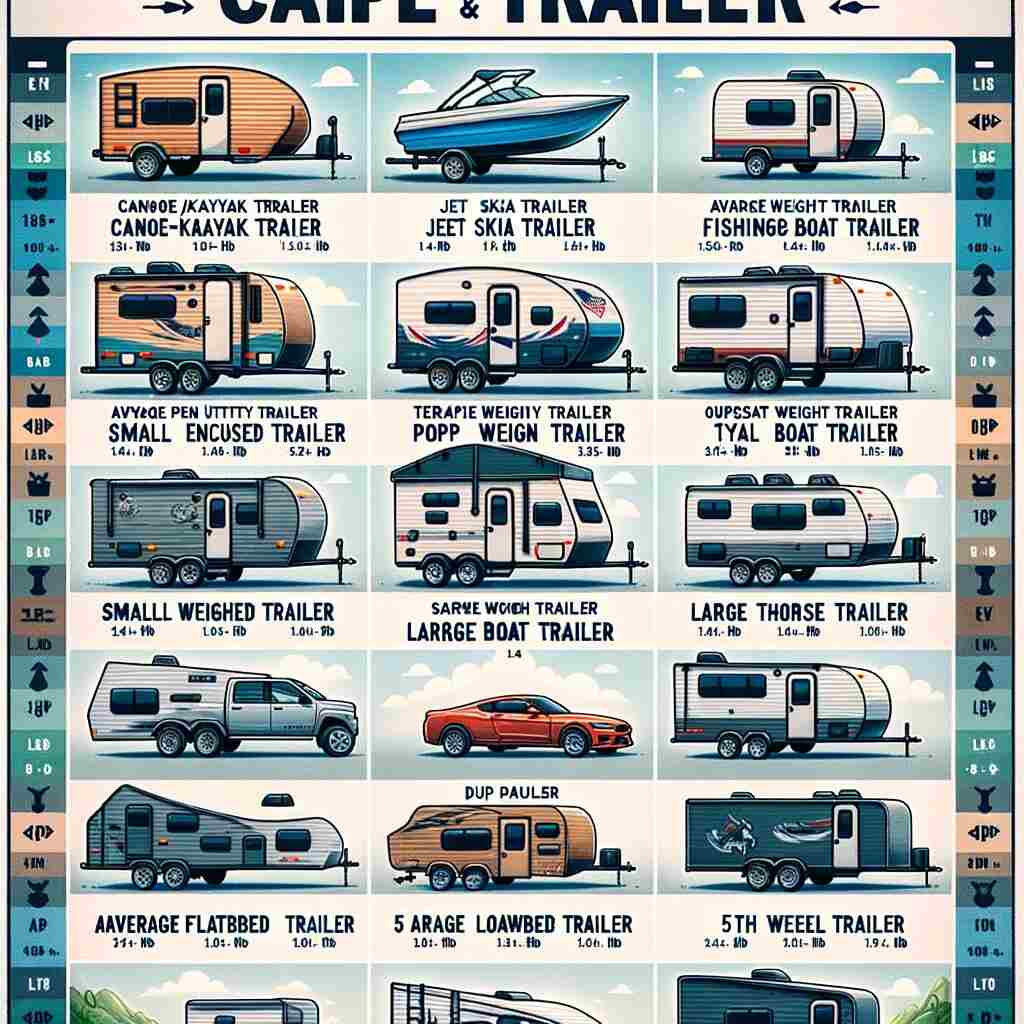
Average Trailer Weights Chart by Type
This detailed table provides a comprehensive overview of the various trailer types and their respective weights and capacities. Please note that these numbers are average estimates and may vary depending on the manufacturer, trailer model, and any additional modifications or accessories.
Camper Weight Chart: Tailoring Your Camping Experience
If you’re particularly interested in camper trailers, it’s helpful to look at a camper weight chart. Camper trailers come in various shapes and sizes, each offering a unique camping experience. Here’s an overview of average weights for different camper types:
Average Camper Weight Chart
Here’s the table for the specified camper types along with their specifications:
This table provides a focused look at the various specified camper types and their respective weights and capacities. Understanding these average weights is a great starting point for anyone planning to tow a camper trailer. However, keep in mind that the specific weight of a camper can vary depending on its size, construction materials, and the amenities it offers.
Trailer Weights Explained: Beyond the Numbers
To gain a deeper understanding of trailer weights, let’s break down the components that contribute to a trailer’s overall weight:
1. Trailer Frame:
- Description : The frame serves as the backbone of the trailer, providing structural support. It is typically made of materials such as steel or aluminum. The choice of materials and the frame’s construction can significantly impact the trailer’s weight.
2. Wheels and Tires:
- Description : The type and size of wheels and tires used on a trailer can affect its weight. Larger wheels and tires may add extra pounds to the overall trailer weight.
3. Flooring and Walls:
- Description : Trailers come with different types of flooring and wall materials, including wood, aluminum, or fiberglass. The choice of materials can influence the trailer’s weight.
4. Accessories:
- Description : Additional accessories such as spare tires, toolboxes, cargo racks, or specialized hitches can increase a trailer’s weight. It’s essential to account for these additions when calculating the total weight.
- Description : The cargo you load onto the trailer is a significant factor in its weight. It’s crucial to stay within the trailer’s weight capacity and ensure even distribution of the load for safe towing.
6. Axles and Suspension:
- Description : Trailers have one or more axles that support their weight. The type and number of axles, along with the suspension system, play a crucial role in the trailer’s weight-bearing capacity. Upgrading the axles and suspension can sometimes increase a trailer’s capacity, but this should be done carefully and in consultation with experts.
Now that we’ve covered the fundamentals of trailer weights let’s delve into the specific weights of various trailer types:
Specific Trailer Types and Their Weights
Canoe / kayak trailer weight.
- Average Weight : 200 – 500 lbs
- Description : Canoe and kayak trailers are designed with lightweight materials and simple construction to safely transport watercraft. These trailers are relatively easy to tow and provide a convenient way to transport canoes or kayaks to your favorite paddling spots.
Jet Ski Trailer Weight
- Average Weight : 300 – 800 lbs
- Description : Jet ski trailers are compact and lightweight, specifically designed for transporting personal watercraft. Their weight varies based on the number of jet skis they can carry and their size.
Motorcycle Trailer Weight
- Average Weight : 300 – 1,500 lbs
- Description : Motorcycle trailers come in various sizes, from single-bike carriers to larger trailers capable of transporting multiple motorcycles. The weight depends on their size, construction materials, and additional features.
Fishing Boat Trailer Weight
- Average Weight : 800 – 2,500 lbs
- Description : Fishing boat trailers are designed to transport fishing boats of different sizes. The weight of these trailers can vary significantly depending on the length and construction of the boat.
Tow Dolly Weight
- Average Weight : 500 – 1,500 lbs
- Description : Tow dollies are used for towing vehicles behind another vehicle. They are relatively lightweight and compact, making them easy to store when not in use. The weight of a tow dolly depends on its design and capacity.
Small Open Utility Trailer Weight
- Description : Small open utility trailers are versatile and can be used for transporting a wide range of items, from landscaping equipment to furniture. Their weight varies based on their size and the materials used in their construction.
Small Enclosed Trailer Weight
- Average Weight : 1,000 – 3,000 lbs
- Description : Small enclosed trailers offer protection for your cargo and are commonly used for moving or storage purposes. Their weight depends on their size and the materials used to build them.
Teardrop Trailer Weight
- Average Weight : 1,500 – 3,000 lbs
- Description : Teardrop trailers are known for their compact and lightweight design, making them an excellent choice for campers seeking a cozy and minimalist camping experience. Their weight can vary depending on their size and the amenities they offer.
A-Frame Camper Weight
- Average Weight : 1,500 – 4,000 lbs
- Description : A-frame campers provide a convenient and comfortable camping experience. Their weight varies depending on their size and the amenities they are equipped with. Larger A-frame campers tend to weigh more.
Car Trailer Weight
- Average Weight : 1,500 – 4,500 lbs
- Description : Car trailers are designed for the transportation of vehicles. Their weight depends on their size and their capacity to carry different types of vehicles, from compact cars to larger SUVs.
Large Boat Trailer Weight
- Average Weight : 2,000 – 7,000 lbs
- Description : Large boat trailers are built to transport sizable watercraft such as fishing boats, speedboats, or sailboats. The weight of these trailers can vary based on the size of the boat they are designed to accommodate and the materials used in their construction.
Pop Up Camper Weight
- Average Weight : 1,500 – 3,500 lbs
- Description : Pop-up campers are lightweight and compact when towed, making them a popular choice among campers. These campers expand into comfortable living spaces when set up at the campsite, and their weight depends on their size and the amenities they offer.
Large Enclosed Trailer Weight
- Average Weight : 3,000 – 8,000 lbs
- Description : Large enclosed trailers are used for transporting a wide range of cargo, from motorcycles to construction equipment. The weight of these trailers depends on their size and the materials used in their construction.
Small Travel Trailer Weight
- Average Weight : 2,500 – 5,000 lbs
- Description : Small travel trailers offer the convenience of a home on wheels, making them a popular choice for road trips and camping adventures. Their weight can vary based on their size and the amenities they provide.
Small Horse Trailer Weight
- Average Weight : 2,000 – 5,500 lbs
- Description : Small horse trailers are designed to transport one or two horses safely. Their weight depends on the number of horses they can accommodate and the materials used in their construction.
Large Flatbed Trailer Weight
- Description : Large flatbed trailers are versatile and used for transporting heavy and oversized cargo. The weight of these trailers depends on their size and load capacity, with larger flatbeds being heavier.
Dump Trailer Weight
- Average Weight : 2,500 – 8,000 lbs
- Description : Dump trailers are commonly used in construction and landscaping for hauling materials such as gravel or debris. Their weight varies based on their size and load capacity.
Large Travel Trailer Weight
- Average Weight : 4,000 – 12,000 lbs
- Description : Large travel trailers provide spacious living areas for extended camping trips. These trailers offer a range of amenities, and their weight can vary significantly depending on their size and the features they include.
Gooseneck Flatbed Trailer Weight
- Average Weight : 5,000 – 15,000 lbs
- Description : Gooseneck flatbed trailers are heavy-duty and ideal for transporting large and heavy loads. Their weight is higher due to their size and load-bearing capacity, and they are often used in commercial and industrial settings.
Large Livestock Trailer Weight
- Average Weight : 4,000 – 10,000 lbs
- Description : Large livestock trailers are designed to safely transport animals such as cattle, horses, or sheep. The weight of these trailers depends on their size, capacity, and the materials used in their construction.
Toy Hauler Weight
- Average Weight : 5,000 – 14,000 lbs
- Description : Toy haulers combine living space with storage for recreational vehicles such as ATVs, motorcycles, or dirt bikes. Their weight varies based on their size, amenities, and the weight of the toys they are designed to carry.
5th Wheel Camper Weight
- Average Weight : 7,000 – 18,000 lbs
- Description : 5th wheel campers offer spacious interiors and are towed using a specialized hitch located in the bed of a pickup truck. These campers are among the heaviest in the category due to their size and the amenities they provide.
Trailer Equipment and Camping Gear: Must-Have Recommendations
To ensure a safe and enjoyable towing experience, it’s essential to have the right equipment. Here are some highly recommended products that can help with your trailer needs, all available on Amazon:
1. Trailer Equipment:
- Curt Class 3 Trailer Hitch: Secure your load with this durable hitch. Find it on Amazon.
- Reese Towpower Hitch Receiver: Trusted by towing professionals. Check it out here.
- B&W Trailer Hitch: Offers strength and reliability. Available here.
Tie-Down Straps
- Rhino USA Heavy Duty Ratchet Straps: Premium ratchet straps for peace of mind. Get them here.
- Erickson Retractable Ratchet Straps: Convenient and retractable design. See on Amazon.
- Keeper 1″ x 12′ Cam Buckle Tie-Down: Lightweight and efficient. Shop now.
Trailer Accessories
- CURT Breakaway Switch: Ensure trailer braking control. Buy it here.
- Hopkins Trailer Light Tester: Quickly test your trailer lights. Check it out.
- Tow Ready Trailer Wiring Harness: Keep your trailer lights operational. Shop on Amazon.
Weight Distribution Systems
- Equal-i-zer 4-Point Sway Control Hitch: Reduce sway and improve control. Find it on Amazon.
- Fastway e2 Hitch: Simple yet effective weight distribution. Get it here.
2. Camping Gear
- Coleman Sundome Tent: Affordable and reliable camping tent. Find it here.
- ALPS Mountaineering Lynx Tent: Durable and lightweight. Check it out.
- CORE 9-Person Instant Cabin Tent: Spacious for larger groups. Available here.
Portable Grills
- Weber Q1200 Portable Grill: High-quality portable grilling. Buy it on Amazon.
- Cuisinart CGG-180 Petit Gourmet: Compact yet versatile grill. Find it here.
- Coleman RoadTrip 285 Portable Stand-Up Grill: Ideal for camping. Get it here.
Camping Chairs
- Kijaro Dual Lock Portable Camping Chair: Comfortable and stable. Shop now.
- ALPS Mountaineering King Kong Chair: Heavy-duty comfort. Check it out here.
- Helinox Chair One: Ultra-light and compact design. Available here.
FAQs Addressing Common Questions
Now that we’ve covered various trailer types and their weights, let’s address some frequently asked questions related to trailer weights:
Q1: How do I determine the weight of my trailer?
A1: To determine the weight of your trailer, you can use a truck scale or visit a weigh station. Ensure that your trailer is empty or loaded as you intend to use it, as the weight can vary based on cargo.
Q2: Why is knowing my trailer’s weight important?
A2: Knowing your trailer’s weight is crucial for safe towing. It helps you avoid overloading, which can lead to accidents and damage to your vehicle. Additionally, it ensures compliance with towing regulations.
Q3: Are there weight limits for towing trailers?
A3: Yes, there are weight limits for towing trailers, which vary by state and country. It’s essential to be aware of these limits and ensure your towing setup stays within the legal weight restrictions.
Q4: Can I upgrade my trailer’s axles to increase its weight capacity?
A4: In some cases, upgrading your trailer’s axles and suspension may increase its weight capacity. However, it’s essential to consult with a professional and ensure that your trailer frame can handle the increased load.
Q5: What should I do if I suspect my trailer is overweight?
A5: If you suspect your trailer is overweight, it’s crucial to offload some cargo or reconfigure your load to comply with weight limits. Overloaded trailers can lead to dangerous situations on the road.
Q6: How can I balance the weight on my trailer for safe towing?
A6: Properly balancing the weight on your trailer is essential for safe towing. Ensure that the weight is evenly distributed, with slightly more weight towards the front of the trailer. Use tie-downs and secure your cargo to prevent shifting.
Understanding the average trailer weights by type is a fundamental aspect of safe and responsible towing. Whether you’re planning a leisurely camping trip with a teardrop trailer or transporting heavy equipment with a flatbed trailer, knowing your trailer’s weight and staying within legal limits is paramount.
Always consult manufacturer guidelines and adhere to towing regulations to ensure a smooth and safe towing experience.
Disclosure: This article contains affiliate links. If you click on these and purchase a product, we may receive a small commission at no additional cost to you.
Raphael Dume is a passionate outdoor enthusiast and the visionary behind OutdoorDoer.com. Outdoor Doer is a passionate community of outdoor enthusiasts dedicated to inspiring and equipping adventurers. We offer expert advice, unbiased product reviews, and comprehensive guides on camping, hiking, fishing, and more. Our mission is to promote outdoor accessibility, holistic well-being, and sustainability through high-quality, engaging content and top-tier gear. Join us to explore, discover, and thrive in the great outdoors.
Join the Doers community!
Enter your name and email address below and subscribe to our newsletter for exclusive updates and insights.
I accept the Privacy Policy
Related Posts

How to Clean a Tent: A Comprehensive Guide
- July 29, 2024

Best Cabin Tents: A Guide to Finding Your Perfect Outdoor Shelter
- July 10, 2024

When to Use a Dome Tent: A Comprehensive Guide
Trending now.

- Skip to main content
- Skip to secondary menu
- Skip to primary sidebar
- Skip to footer

Jeffsetter Travel
Travel Consultants and Travel Tips
How To Weigh Your Travel Trailer At Home
January 20, 2021 by Charlotte Phillips
Last updated on June 23rd, 2023 at 09:09 am
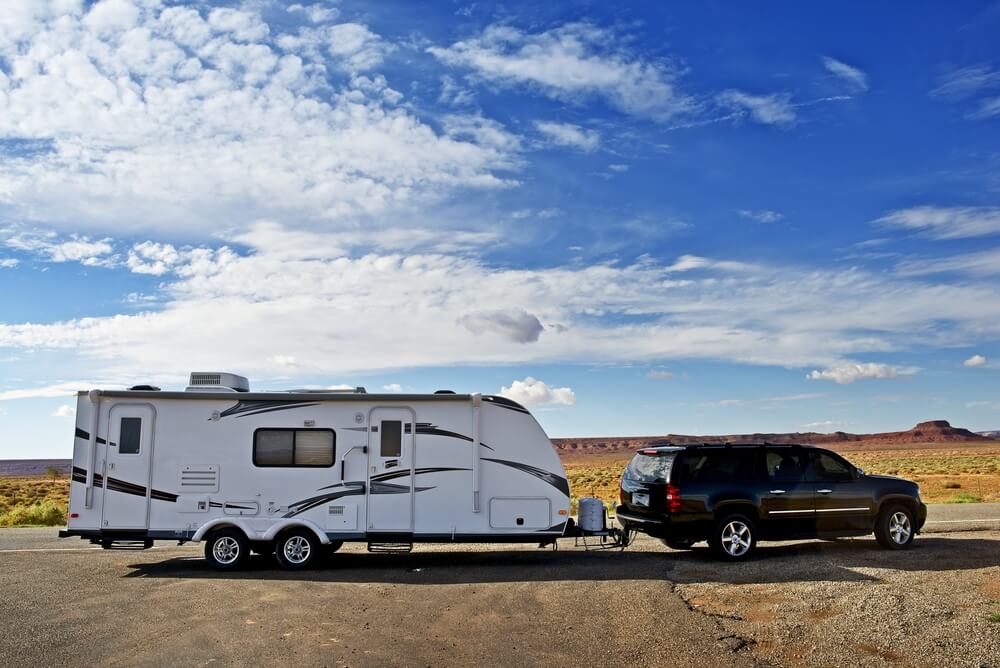
All of our reviews are based on exhaustive research, industry experience, and whenever possible, hands-on testing. When you make a purchase using one of our chosen links we’ll receive a small percentage of the proceeds. This supports the site and keeps Jeffsetter running. You can read more here .
You just bought a new rig and are confident about your vehicle’s ability to tow it. Hopefully, you already know your travel trailer’s dry weight from the manufacturer, but this gets you thinking: what does my trailer weigh after I’ve filled it up with personal belongings and supplies?
Whether you’re brand new to towing or have owned many travel trailers in your life, knowing the weight of your trailer at various stages of use is important, both for purchasing a hitch and for the life of your vehicle.
The last thing you want to do is purchase a travel trailer your vehicle can’t handle! But how can you possibly determine the weight of it, especially if you have no RV dealer nearby? It’s important to weigh your trailer before a long trip, but can this be done from the comfort of your own driveway?
You can use the bathroom scale technique, and while an average bathroom scale can’t measure the entire weight of your trailer tongue you can take your initial reading and multiply it by three. You can also use tongue weight scales that are designed to measure tongue weight, or a device called BetterWeigh mobile towing scale.
As you can see, you can weigh your travel trailer at home using a variety of options ! Let’s take a look at some of these as well as why knowing your trailer weight is essential when owning an RV.
Understanding Your Trailer’s Various Weights
If you’re new to the RV world , you may be feeling a bit confused about trailer weight. Going to an RV dealership without knowing how much your vehicle can tow can spell disaster if you end up bringing a travel trailer home. If it’s too heavy for your vehicle, you may cause irreparable harm!
Thankfully these weights and numbers are fairly easy to understand, and manufacturers always include a starting weight of any travel trailer they make, so you won’t be entirely in the dark about how much your trailer weighs.
Here are some of the terms you should know when it comes to weighing your RV, and what it means for you when it comes to weighing at home!
Gross Vehicle Weight Rating (GVWR)
This is the maximum allowable weight of a fully-loaded trailer, including liquids, passengers, cargo, and the tongue weight of any towed vehicle (most travel trailers can’t tow an additional vehicle). This is the weight you will want to know before departing on your first camping trip with your new travel trailer ! It is the most a trailer can weigh in total, as determined by the trailer manufacturer.
Gross Combined Weight Rating (GCWR)
GCWR is the maximum weight of your vehicle with a trailer attached, as determined by the vehicle manufacturer. This means the weight of both the tow vehicle and the trailer together. It also includes any cargo or load placed in either vehicle.
Dry Weight or Unloaded Vehicle Weight (UVW)
UVW means the weight of an RV as built at the factory, by the manufacturer. It does not include the weight of the cargo, freshwater, propane gas, occupants, etc. It is the weight of the trailer with nothing extra in it, and is the weight you should know when shopping for a new travel trailer!
Tongue Weight or Hitch Weight (HW)
Also known as tongue weight, HW is the amount of weight of the trailer that is carried on the hitch. You will need to know this weight when shopping for a proper hitch. Hitches are rated both by their towing capacity and their tongue weight, but we will touch more on this later.
Gross Axle Weight Rating (GAWR)
GAWR is the maximum allowable weight each axle assembly is designed to carry. This is important to know because it’s possible to be under the GVWR and still exceed an axle rating, depending on how you load the RV with your personal cargo.
This is a lot of information to digest, but once you get more familiar with travel trailers and what it all means, the various weights of your trailer will make a lot more sense! You will come to understand why it is necessary to know these weights and the importance of staying within certain ranges depending on your tow vehicle.
Why Does Travel Trailer Weight Matter?
When it comes to towing a travel trailer, why might the weight of your rig matter? Besides what has already been discussed, such as wear and tear on your tow vehicle, there are other important factors when it comes to the weight of your travel trailer.
Improved Longevity
Keeping the weight of your travel trailer down near the lower end of your tow vehicle’s towing capacity will ensure a long life for it, especially if you’re planning to tow over many mountain passes or other strenuous drives. It’s important not to overload your car or truck, and keep the ambient temperature outside in mind when towing, as too hot temperatures can overheat your engine.
Function Of Axles, Frame, And Suspension
The weight inside your trailer matters for the overall health of your axles, frame, and suspension. If you fill your travel trailer with heavy objects, even if your tow vehicle can handle it, it might not be the best idea for the life of your trailer, and it may not be level either .
Toy haulers are a good type of travel trailer to look at if you plan on hauling a lot of heavy equipment or additional recreational vehicles. They are built to handle such weight, but even toy haulers have their limits. It’s important not to overload your trailer’s frame, as it can bend and warp from continued improper weighting.
Improper weighting inside your rig matters when you tow as well, and each axle has its own preferred amount of weight per axle. So arranging items inside your trailer matters too! If you leave too many things toward the front of your trailer, you may find it more difficult to tow, as well as putting too much weight on one axle instead of both axles.
Safer Towing
The most important thing to consider when it comes to weight and your RV is when it’s time to tow. The weight of your travel trailer affects what level of hitch you buy as well as how difficult your rig might be to control on the road. A heavier trailer may prove trickier to control on large freeways and other roads, so keep this in mind before you set off on your next adventure!
How Much Do Things Weigh, Anyway?
It’s time to hit the road, but you’re worried about what your rig will weigh once you fill it up with supplies- and rightly so! When you think about an empty trailer versus a full one, the weight can shift drastically; most RVers budget at least 1,000 pounds going into their trailer, depending on the size of it!
There’s no exact measurement for every little thing you’re putting into your trailer unless you choose to track it yourself. This can sound exhausting, and the hope is that you’re not putting in too many things so that you’ll never be close to your maximum weight. However, here are some helpful numbers and items to keep in mind should you need to know the weight of what you’re putting into your RV!
- Water : 8.3 pounds per gallon
- Propane : 6 pounds per gallon
- Food : Listed on the boxes and cans, more often than not. A quick tally should work well for you, but always budget 5-10% more weight, just in case.
- Clothes : This is the toughest one to judge, and you can find out specifically from your clothing manufacturer’s websites or clothing listings, but this may be too tedious. However, an average suitcase’s worth of clothes can weigh 50 pounds, so keep this in mind when calculating your clothes
Don’t forget your kitchen appliances and dishes, any tools or toys, and always budget 5-10% more weight than your final calculations. Hopefully, you won’t ever have a problem with too much stuff!
The time has come to weigh your new travel trailer, but you’re not ready to hitch up and tow it to a professional weigh station. The good news is, you can weigh your travel trailer at home! I know what you’re thinking: do I have to buy yet another RV accessory? My answer for you is: it may save you an awful lot of headaches if you choose to.
But the good news is you can weigh your travel trailer with a bathroom scale should you be out of any other options! This is only recommended for smaller travel trailers , but it will work in a pinch if you’re willing to set it up correctly. Let’s go over the different ways of weighing your RV at home.
Bathroom Scale Technique
Your very own bathroom scale can be used to weigh your travel trailer. Can you believe it!? It may surprise you, but it’s possible with some setup involved. Most RVers use a bathroom scale to measure the tongue of their trailer only, which makes up about 10-15% of your travel trailer’s weight. This is a necessary number when it comes to determining your hitch as well.
Here’s a step-by-step guide to weighing your trailer’s tongue.
1. Ensure The Trailer Is Level
Being level is important when getting an accurate weight. Also, chock your wheels during this process for your own safety.
2. Lay A 2×4 Beneath The Trailer Tongue
Position a reliable board on the ground, directly below the trailer tongue. The board must be at least 3-1/2 feet long for this trick to work.
3. Place The Bathroom Scale At One End And A Brick At The Other
Place the bathroom scale roughly 2 feet in either direction from the trailer tongue, and a block or brick about 1 foot from the trailer tongue in the opposite direction of the scale. You’ll want to protect the bathroom scale with a small piece of plywood or other material on the top.
4. Center The Wood, Scale, And Brick On Two Pipes
Insert two horizontal pipes between the 2×4 and scale/brick: one in the center of the bathroom scale and one in the center of the brick.
5. Rest The Trailer Tongue Against A Vertical Pipe
Lower the trailer jack until the coupler is fully resting on a vertically-positioned pipe.
6. Read The Scale And Multiple By 3
An average bathroom scale can’t measure the entire weight of your trailer tongue. That’s why you take your initial reading and multiply it by three! This should be your trailer’s tongue weight.
Tongue Weight Scale Technique
One of the other popular methods for weighing a travel trailer at home is by using a tongue weight scale. Unlike bathroom scales, tongue weight scales are designed to measure tongue weight, so they are a bit more robust and durable and can be bought from towing stores.
It’s possible to buy ball mounts that have a scale already built-in for ultimate convenience, though don’t panic if you don’t have one of these as they aren’t really necessary. Using tongue weight scales is pretty straightforward. You simply need to raise the tongue and support it with blocks underneath the scale at the towing height. The coupler can slowly be lowered down onto the tongue weight scale and a reading should be shown.
Just be sure your trailer is stabilized correctly before going ahead and using a tongue weight scale. And remember you’ll need to purchase a scale able to handle your rig as tongue weight scales have different capabilities.
Use BetterWeigh Mobile Towing
While it’s another accessory to buy, most RVers enjoy using a little device called the BetterWeigh Mobile Towing Scale by CURT (which you can see on Amazon). This device can measure the weight of your trailer and tow vehicle as well as specific parts of your trailer, such as the gross weight, cargo, payload, tongue weight, pin weight, and weight distribution. Plus it is controlled via your smartphone so you can weigh whatever you’d like on the go with little to no hassle!
It is an incredibly easy device to use as well as install. It simply plugs into your vehicle’s diagnostic port under the steering wheel and uses Bluetooth to send the information to your phone. Sounds like magic, right? It is in a way but requires a bit of math to calculate your trailer’s weight.
From a level surface, accelerate your unhitched vehicle to about 25mph. This handy device receives data about torque and translates that into vehicle weight. Once you have the tow vehicle weight, hook up your trailer and once again accelerate to 25mph. The device will report your combined gross vehicle weight. Subtract the weight of your truck from the combined weight and you have your trailer weight all on its own! This is demonstrated clearly in the video below:
While it’s yet another object to buy, it is the simplest and most advanced way of weighing your trailer at home. Again, always budget extra weight, even using this device, as it cannot give you as accurate a reading as, say, a weigh station can. But it will do it easily, especially since you can do it from the comfort of your own home! It’s still budget-friendly (particularly when compared to other RV accessories) and you can check out the latest price on Amazon by clicking here .
How Can I Keep Travel Trailer Weight Distributed Evenly?
So, maybe you’ve weighed your travel trailer at home and have realized you’ve been carrying a bit more weight than you should have been! To avoid any regrets in the future , it’s best to empty out your trailer and work out the things you need, and the belongings able to be left behind to keep weight down.
A key to safely towing a travel trailer is to distribute weight evenly across the RV. This means not loading all of your heaviest items in one area, or loading the back or front of the trailer with super heavy items. A travel trailer with an uneven load can be dangerous on the road, especially in windy conditions where you’ll have to slow down a substantial amount to avoid the trailer swaying.
Keeping the weight in your travel trailer distributed evenly is quite simple. Placing heavier items close to the front of the trailer is a good idea, whilst lighter items can find a home towards the rear of the rig. Also be sure to keep the weight evenly from side to side, as ideally, you don’t want one side of the trailer to be lower than the other!
Where Else Can I Weigh My Travel Trailer?
If you aren’t ready to weigh your trailer at home, it can be done elsewhere for a fee. Fill up your trailer as if you were camping, then head to the professionals! Some places you can weigh your trailer are:
- CAT scales and other weigh stations
- Truck stops
- Locations listed on some RVer websites
Always keep an eye on whether or not a scale is certified at a weigh station, as this will ensure an accurate reading. You may also need to keep in mind what states you are thinking about traveling through , as the rules for travel trailer weighing vary from state to state.
If you’re not ready to weigh your travel trailer at home, professional CAT scales are the way to go and are often not terribly expensive. Plus, they get cheaper the more often you weigh, so never hesitate to weigh your travel trailer before you hit the road!
Conclusion
Weight matters when it comes to your new travel trailer, and having an accurate number can make or break your next camping trip. Fill up your trailer, use your BetterWeigh device, or head for a CAT scale near you. There’s nothing better than the peace of mind that comes from knowing how much your new rig weighs!
Important Links
- Advertising Policy and Affiliate Disclaimer
- Privacy Policy
- Contact Jeffsetter Travel Blog
- Ask Jeffsetter a Question
Recent Posts
- Alaska Air Taps Chef Brandon Jiu
- Frontier is Abandoning Its Hawai’i Dreams
- Chase Improves Insurance Coverages
- Waikiki Hotel Workers Voted to Strike
- Turtle Bay is Now Live With Marriott

Before you go, check this out!
We have lots more on the site to show you. You've only seen one page. Check out this post which is one of the most popular of all time.
Trailer Weights by Trailer Type | Trailer Weights Explained
Do you need to know the weight of your trailer? Whether it’s empty of filled to capacity, you can learn about your trailer’s weight here.
Pretty much every type of trailer on Earth is represented here. You can find the average empty weight and load capacity of each type of trailer, along with the ranges of both empty weights and GVWR (fully loaded) weights.
- 1 1. Canoe/Kayak Trailer
- 2 2. Jet Ski Trailer
- 3 3. Motorcycle Trailer
- 4 4. Fishing Boat Trailer
- 5 5. Tow Dolly
- 6 6. Small Open Utility Trailer
- 7 7. Small Enclosed Utility Trailer
- 8 8. Teardrop Trailer
- 9 9. A-Frame Camper
- 10 10. Car Trailer
- 11 11. Large Boat Trailer
- 12 12. Pop Up Camper
- 13 13. Large Enclosed Utility Trailer
- 14 14. Small Travel Trailer
- 15 15. Small Horse Trailer
- 16 16. Large Flatbed Trailer
- 17 17. Dump Trailer
- 18 18. Large Travel Trailer
- 19 19. Gooseneck Flatbed Trailer
- 20 20. Large Livestock Trailer
- 21 21. Toy Hauler
- 22 22. 5th Wheel Camper
1. Canoe/Kayak Trailer
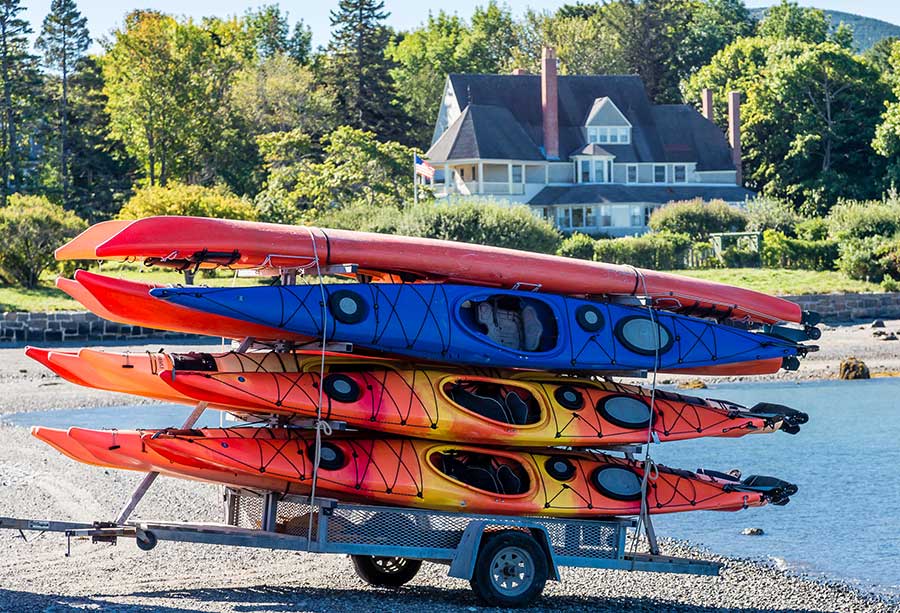
The average canoe or kayak trailer weighs 200 pounds, though they can weigh anywhere from 100 to 400 pounds. They can usually carry loads of at least 100 pounds, but heavier-duty ones can carry up to 600 pounds. That puts the weight of a loaded trailer somewhere between 200 and 800 pounds.
So, you should be able to load up several kayaks or even a big canoe on one of these trailers, and then tow it with pretty much anything, even a sedan.
2. Jet Ski Trailer
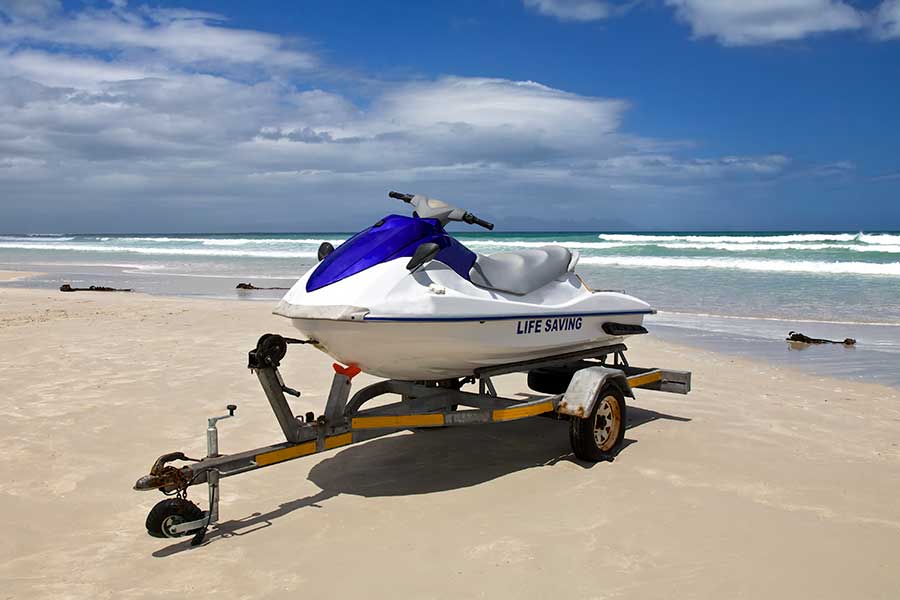
When a jet ski trailer is empty, it will weigh somewhere between 100 and 500 pounds. The average jet ski trailer is 300 pounds when empty. The weight will vary based on how many jet skis it is designed to carry.
Each jet ski trailer is made to hold a specific number of jet skis, so the weight it can carry will depend on how many jet skis it’s built to hold. The average jet ski trailer has a load capacity of 1500 pounds. A loaded jet ski trailer can weigh anywhere from 800 to 3000 pounds.
3. Motorcycle Trailer

A motorcycle, built to tow one or more motorcycles behind another vehicle, will usually weigh around 500 pounds when it’s empty, though a smaller trailer may weigh as little as 300 pounds, and a bigger trailer can weigh as much as 800 pounds.
Like jet ski trailers, motorcycle trailers will vary in weight and weight capacity based on how many motorcycles they’re meant to carry. The average load capacity is 1900 pounds. A trailer that can only carry one motorcycle might weigh 1300 pounds at most when loaded, and a bigger trailer might weigh up to 3500 pounds when it’s filled to capacity.
4. Fishing Boat Trailer
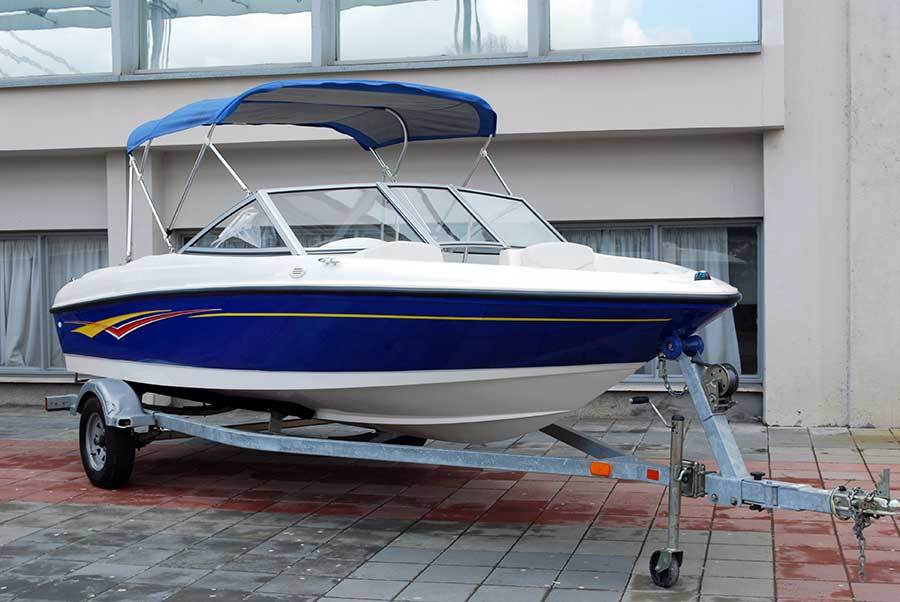
A fishing boat trailer, meant to hold a light boat, will usually weigh around 600 pounds when empty. A smaller trailer might weigh only 200 pounds, and bigger trailers can weigh up to 1100 pounds. Most fishing boat trailers can carry about 2700 pounds.
The length of the trailer and the length of the boat will determine how much the trailer weighs when it’s loaded. If they’re shorter, they may only weigh 900 pounds together. If they’re longer, their combined weight can get up to 6000 pounds.
5. Tow Dolly
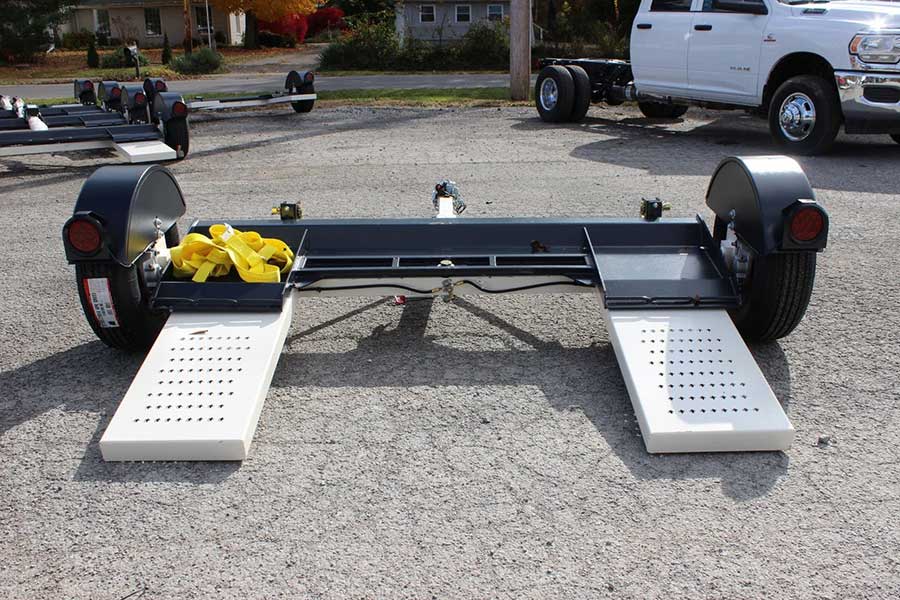
The average tow dolly weighs 600 pounds by itself. Depending on how the tow dolly is built, it might weigh as little as 400 pounds or as much as 800 pounds.
Tow dollies are usually made to be used for towing vehicles that way somewhere between 2600 and 4200 pounds, with the 3400 being the average capacity for the tow dolly. That means the combined weight of the tow dolly and the vehicle it’s helping to pull can be anywhere from 3000 pounds to 5000 pounds.
6. Small Open Utility Trailer
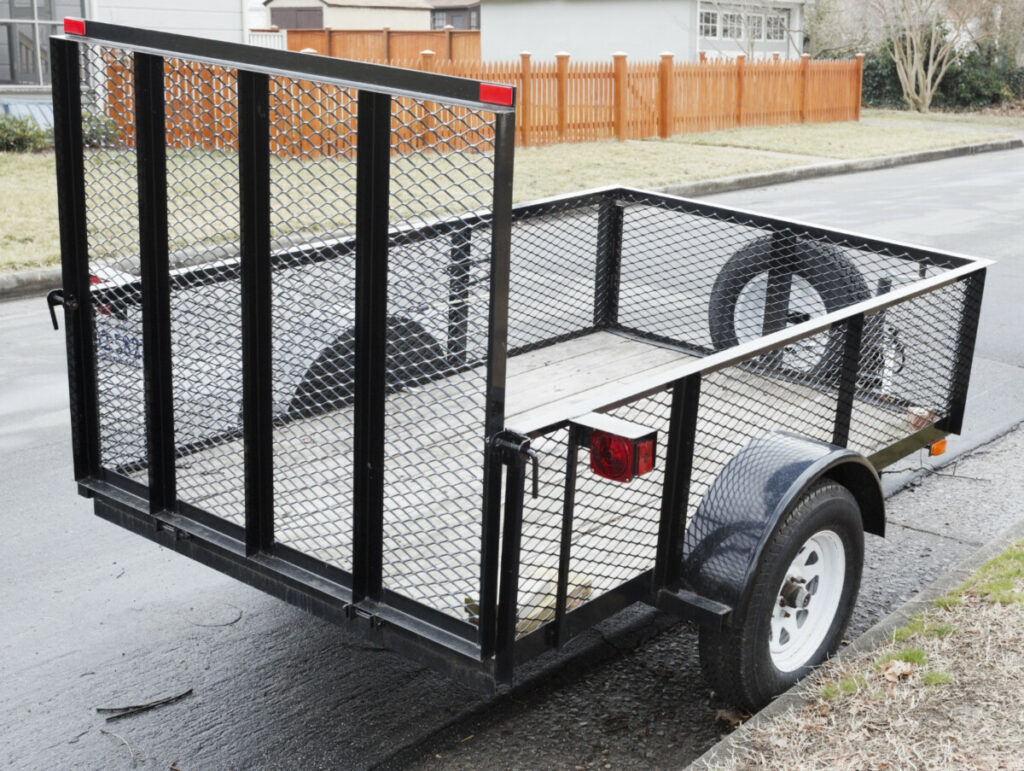
An open utility trailer is like the bed of a stake bed truck, but as a trailer so that an SUV can pull it. These trailers vary greatly in size, build, and capacity and small ones that are less than 10 feet long can weigh anywhere from 300 to 1100 pounds.
On average, small open utility trailers weigh about 700 pounds when they’re empty. The average cargo capacity is 1800 pounds, which gives a total of 2500 pounds for the average trailer. Some trailers may only be able to carry 700 pounds for a total weight of 1000, while others may be able to carry a load of about 2000.
7. Small Enclosed Utility Trailer
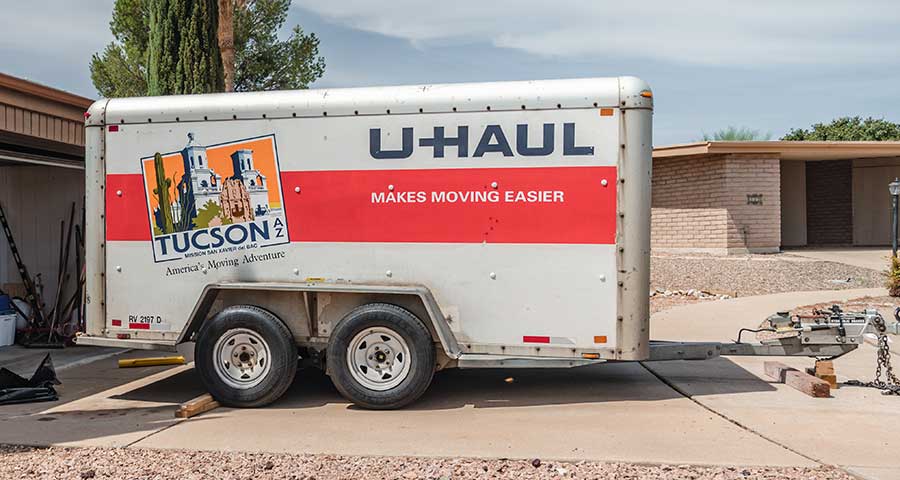
The weight of enclosed trailers varies even more than that of open trailers. The small ones, 12 feet long or less, average 1000 pounds empty, but can weigh as little as 400 pounds or as much as 1800. A trailer with more axles or that’s made with heavier materials will weigh more than another trailer of similar length.
When loaded to capacity, the average small enclosed trailer could weigh around 2200 pounds. The smallest weighs 2000 pounds, and the largest weighs 7000 pounds at full capacity.
8. Teardrop Trailer
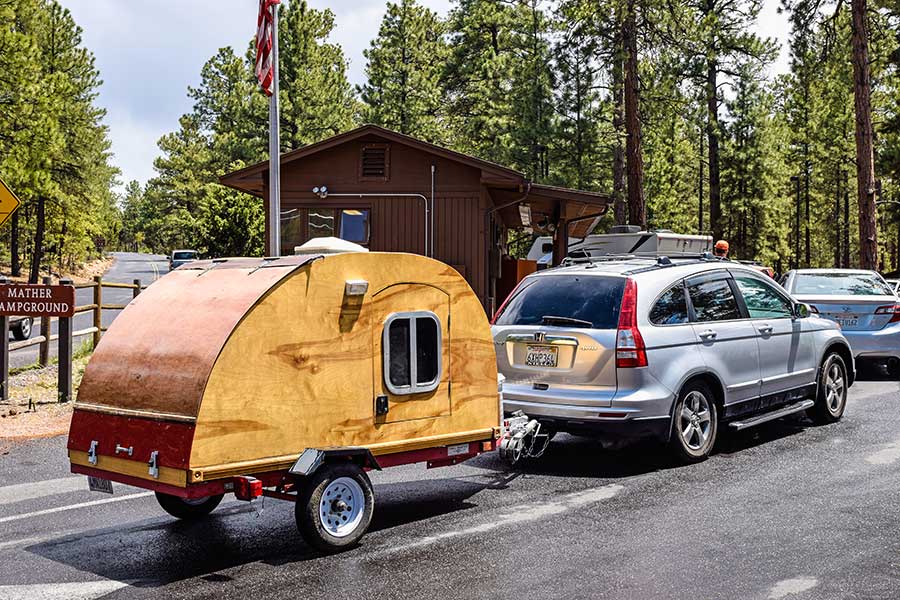
The weight of a teardrop camper trailer will vary based on the features that are built into the camper. On average, a trailer will weigh about 1700 pounds empty, but its empty weight could be anywhere between 500 and 3200 pounds.
It will be on the heavier side if it has features like a kitchen built in, and it will be much lighter if it’s just a bare-bones camper for keeping the rain off.
Usually, a fully loaded camper will only be able to carry 700 pounds of cargo, for a total weight of 1200 pounds.
9. A-Frame Camper
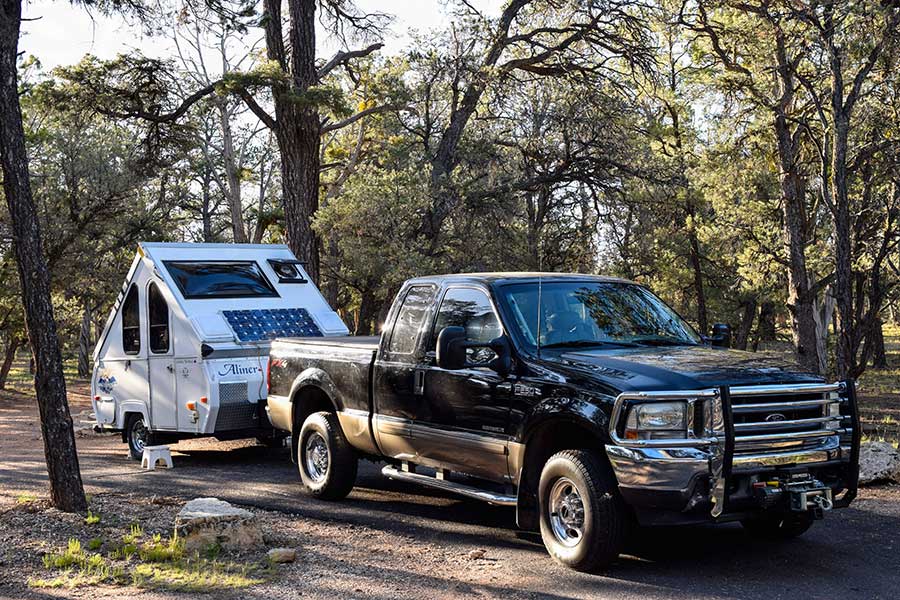
An A-frame camper will weigh 1700 pounds on average, not counting any cargo. These types of campers can weigh anywhere from 1200 to 2300 pounds when they’re empty, and 2500 to 3600 pounds when they’re loaded to capacity. Most will carry about 1200 pounds of cargo. That’s a lot more cargo space than teardrop campers have.
10. Car Trailer
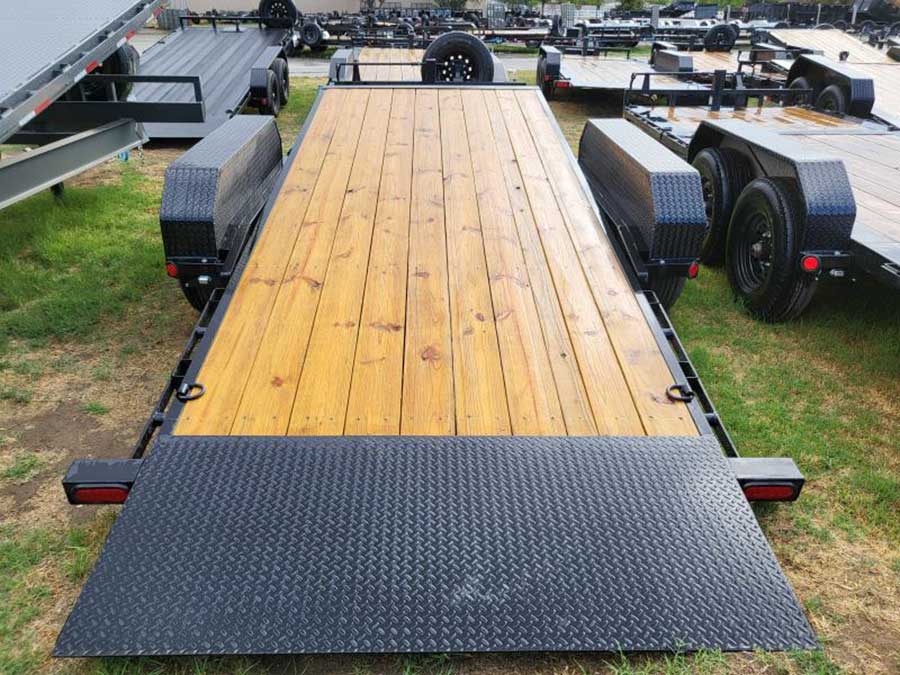
A car trailer will usually weigh about 1900 pounds by itself. If it’s built lighter, it might weigh as little as 1500 pounds. Heavier builds can weigh as much as 2800 pounds.
The load capacity will depend both on the length and the construction of the trailer, but the average capacity is 7100 pounds. A smaller one may have a maximum weight of 6000 pounds when loaded, and a larger one that holds two cars could weigh up to 15000 pounds.
11. Large Boat Trailer
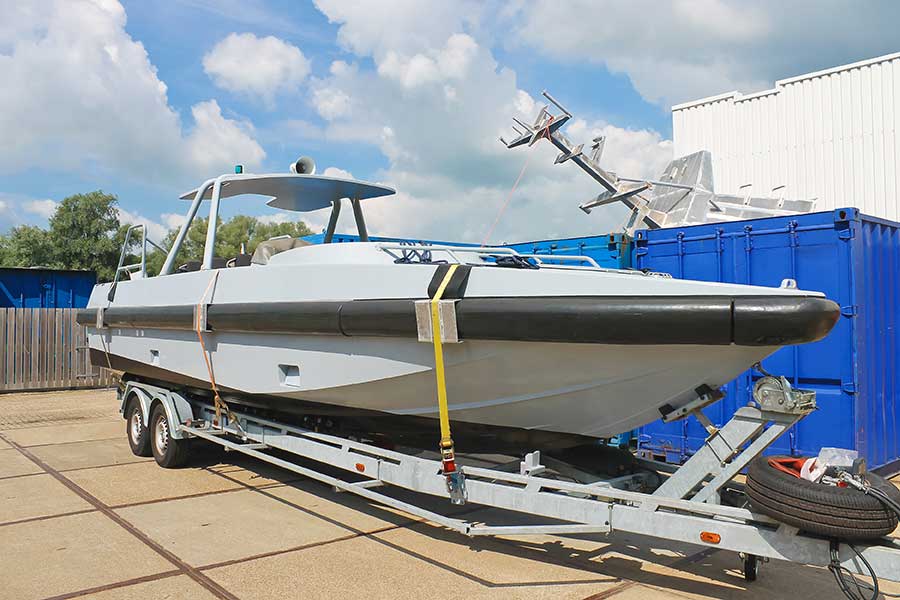
A large boat trailer, one that’s made for hauling heavy boats like motorboats and yachts, can vary greatly in weight. The lightest ones weigh 1100 pounds, and the heaviest weigh 4400 pounds. On average, they weigh 2200 pounds, but that doesn’t mean much given how different these trailers can get.
They vary even more in weight capacity. A small one that’s only meant to carry a motorboat might weigh 5400 max when it’s loaded up, but a big one could weigh as much as 34400 pounds when it’s carrying a huge craft. The average capacity is 11400 pounds, but again, that doesn’t mean a lot since the boats they carry vary so greatly.
12. Pop Up Camper
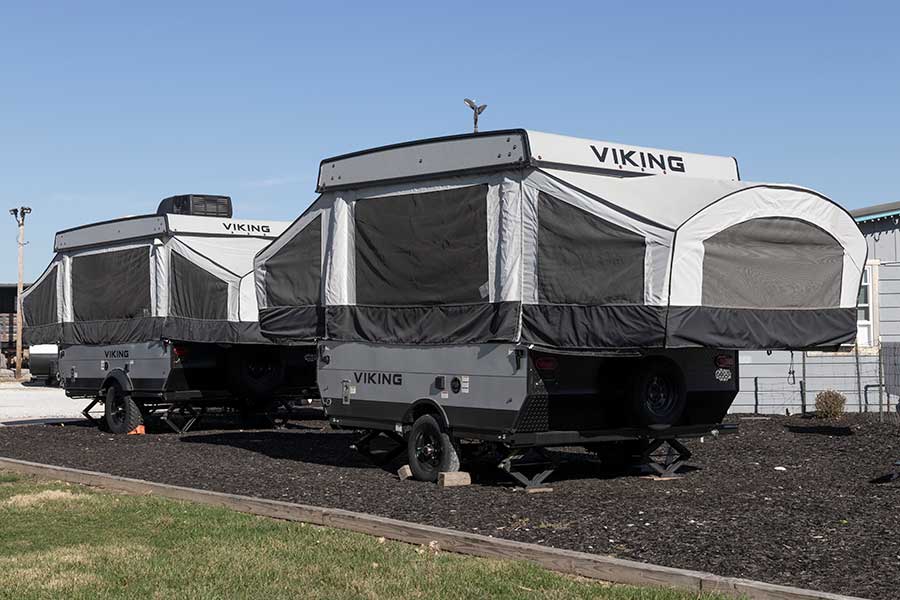
Pop-up campers weigh 2300 pounds on average when unloaded. Depending on the features it’s equipped with, a certain camper might weigh as little as 1400 pounds or as much as 3000 pounds.
The features will also limit the amount of cargo capacity. A fully loaded camper might weigh anywhere from 2700 to 4000 pounds.
The average pop-up camper can carry about 1100 pounds. Like an A-frame camper, it’s a good amount of storage space for a nice camping trip.
13. Large Enclosed Utility Trailer
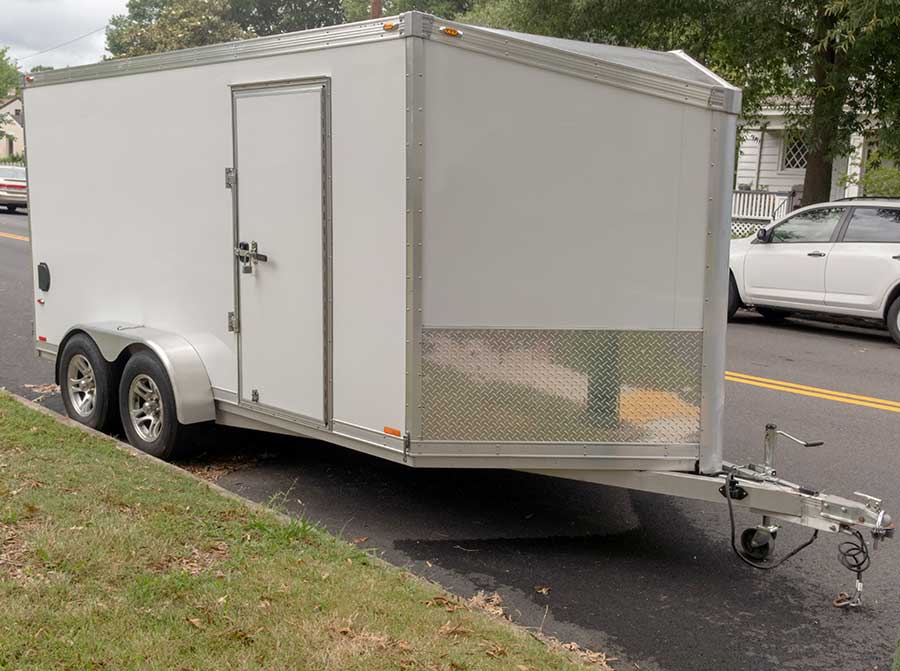
Like the smaller enclosed trailers, large enclosed trailers have a lot of variation in weight. These are trailers 12 feet or longer and have a bumper pull coupler. Some weigh as little as 900 pounds when empty, and some weigh as much as 5200 pounds. The average trailer in this category weighs 2700 pounds.
The load capacity varies even more between these trailers. Their maximum total weight when loaded might be anywhere from 3000 pounds to 10000 pounds. 10000 pounds is the maximum GVWR that non-CDL drivers can tow. On average, one of these trailers can carry about 4400 pounds.
14. Small Travel Trailer
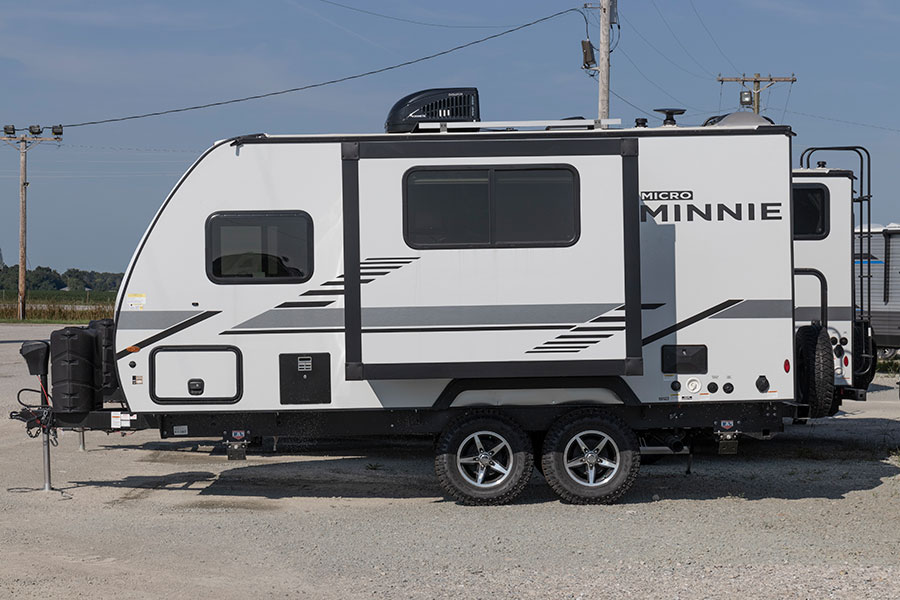
A small travel trailer can weigh anywhere between 1200 and 3900 pounds when empty, given that it isn’t longer than 22 feet. On average, trailers in this size range weigh about 2800 pounds when empty.
Unlike A-frames and pop-up campers, these trailers don’t tend to have a lot of capacity for extra cargo. The average travel trailer can only carry 800 pounds. One with a stronger build and more axles may be able to carry a maximum of 1400 pounds in cargo.
A fully loaded trailer might weigh anywhere from 1900 pounds to 4500 pounds.
15. Small Horse Trailer

A horse trailer made for no more than two horses weighs 2900 pounds on average, given there’s nothing in it. Trailers of this size range from 2300 to 3900 pounds when empty.
The strongest of these horse trailers can weigh up to 8000 pounds when loaded to capacity. The cargo capacity is usually around 4300 pounds.
16. Large Flatbed Trailer
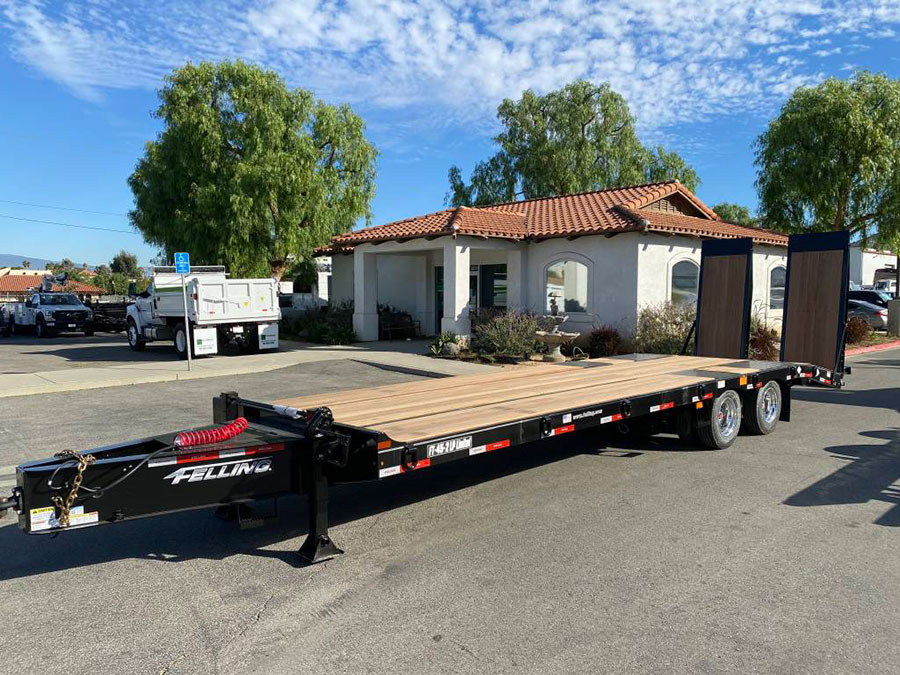
A large flatbed trailer, generally for hauling equipment and other utility cargo, can weigh as little as 500 pounds or as much as 7700 pounds by itself. The average is 3000 pounds.
They might have a maximum total weight of 2900 pounds, but heavier-duty ones could weigh as much as 26000 pounds when they’re loaded to capacity. That’s not even counting the gooseneck trailers, but we’ll get to those.
17. Dump Trailer
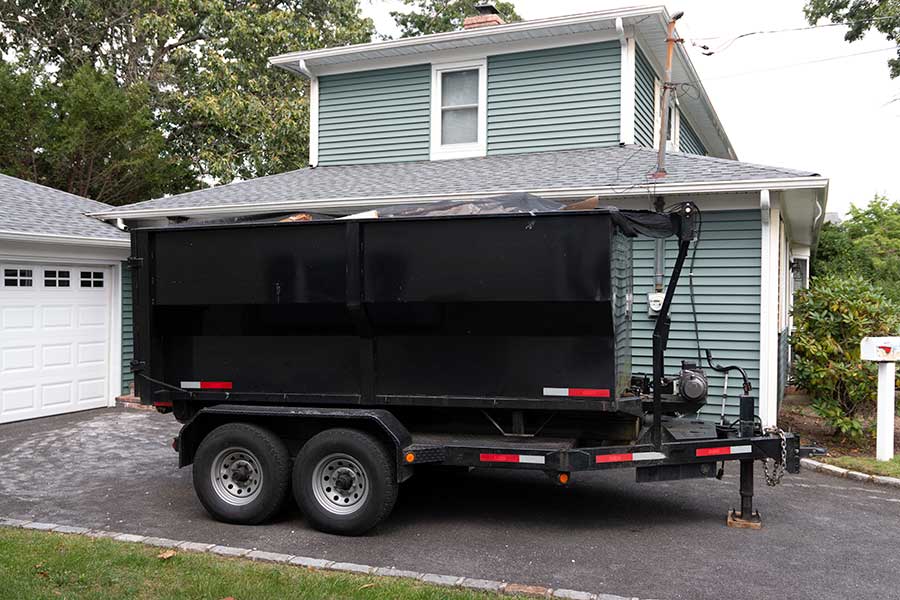
An empty dump trailer weighs 4500 pounds on average when it’s not loaded, but empty dump trailers can weigh as little as 1100 pounds or as much as 10000 pounds.
Those smaller ones can only carry enough cargo to make bring their total weight up to 3000 pounds. The larger ones might weigh up to 30000 pounds when loaded to capacity. The average dump trailer weighs around 12400 pounds when fully loaded, which gives it a load capacity of about 7900 pounds.
18. Large Travel Trailer
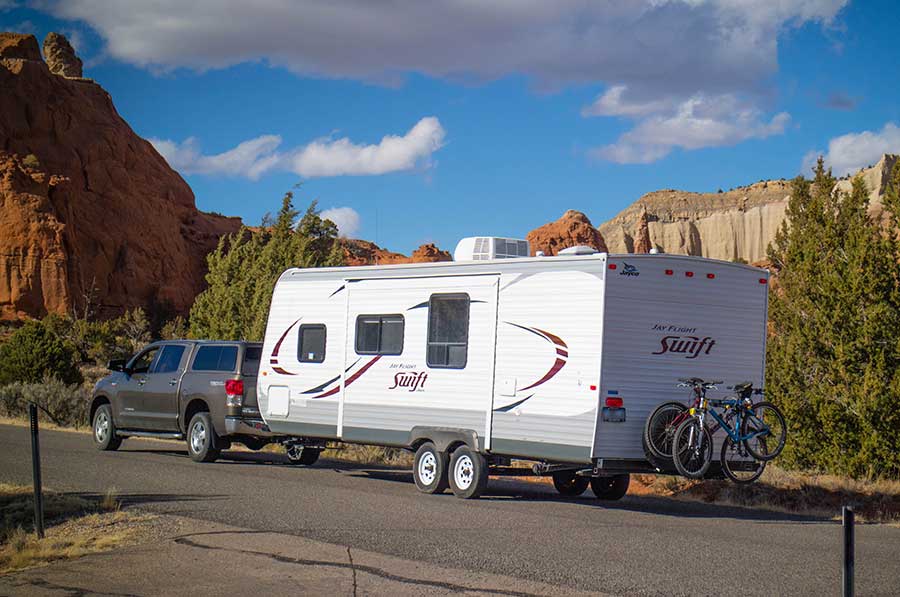
An average large travel trailer weighs 6700 pounds when empty. This is any travel trailer that’s bigger than a small travel trailer but smaller than a 5th-wheel camper. The weight varies based on the features the trailer is equipped with and how many axles it has. It may weigh as little as 4500 pounds or as much as 9000 pounds.
The load, including the fluids that make the features work, can bring the trailer’s total weight up to anywhere between 6300 and 10500 pounds. The average one has a load capacity of 1600 pounds.
19. Gooseneck Flatbed Trailer
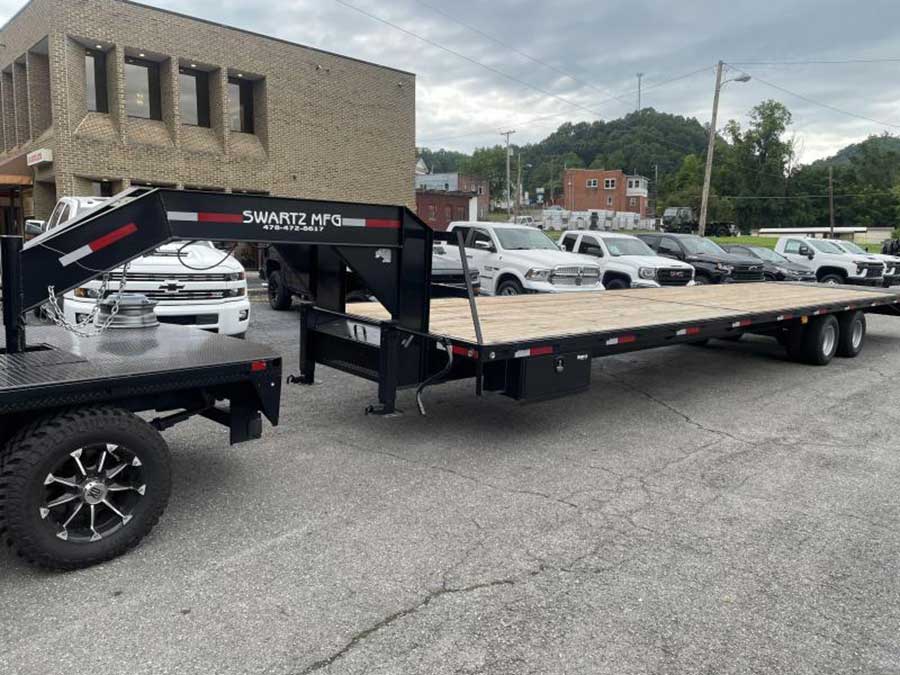
Gooseneck flatbed trailers, made for heavy-duty hauling, can weigh anywhere from 4700 to 10000 pounds when empty. The average trailer weighs 7000 pounds and can carry 16000 pounds of cargo. A gooseneck trailer loaded to capacity could weigh as little as 16000 pounds or as much as 36000 pounds.
20. Large Livestock Trailer
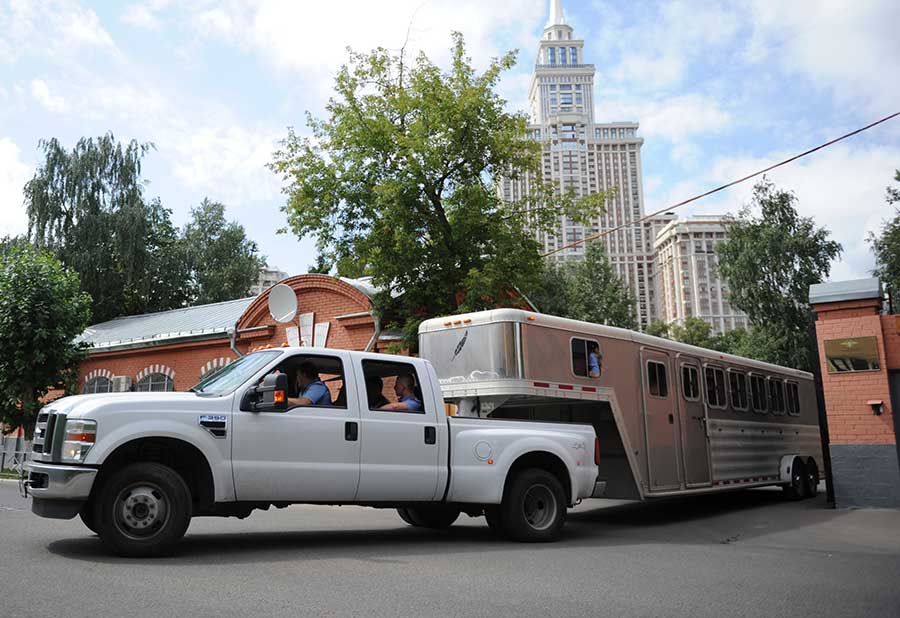
Large livestock trailers are a lot bigger than the small horse trailers we covered earlier. On average, an empty trailer weighs about 7300 pounds and can carry a load of 11400 pounds.
However, these trailers vary greatly in size and capacity. An empty one may weigh as little as 4200 pounds or as much as 11000 pounds. The smallest might weigh up to 14000 when fully loaded, and the heavy-duty ones can get up to 24000 pounds at capacity.
21. Toy Hauler
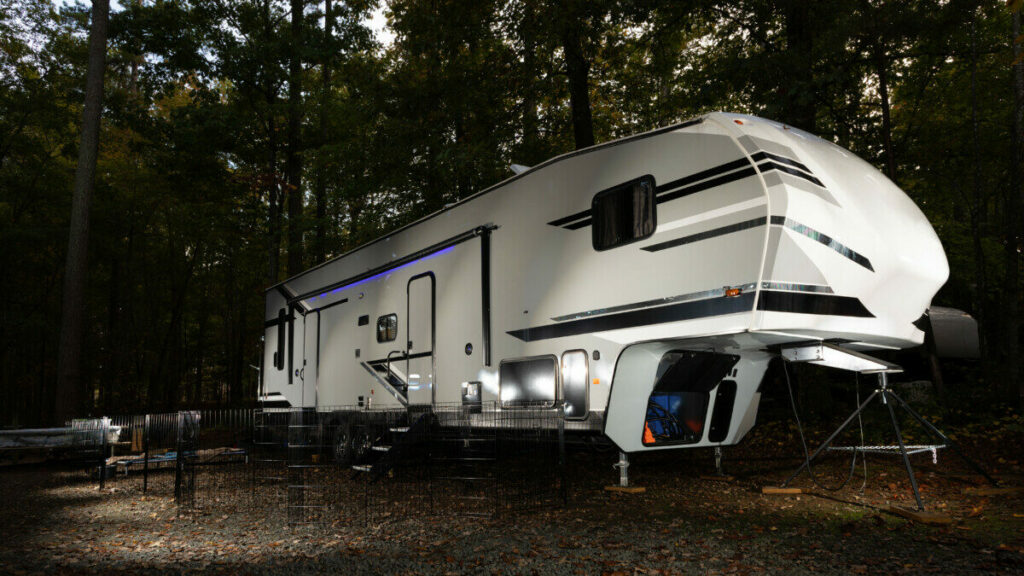
A toy hauler can have a variety of purposes, and so they can vary greatly in weight and load capacity. On average, they weigh 7600 pounds and can carry 10000 pounds of cargo.
A lighter one can weigh as little as 3600 pounds when empty, and a heavier one can be as heavy as 11400 pounds. That weight will depend on the features the trailer has, how many axles there are, and how long the trailer is. A fully loaded one may weigh anywhere from 15000 to 22000 pounds.
22. 5th Wheel Camper
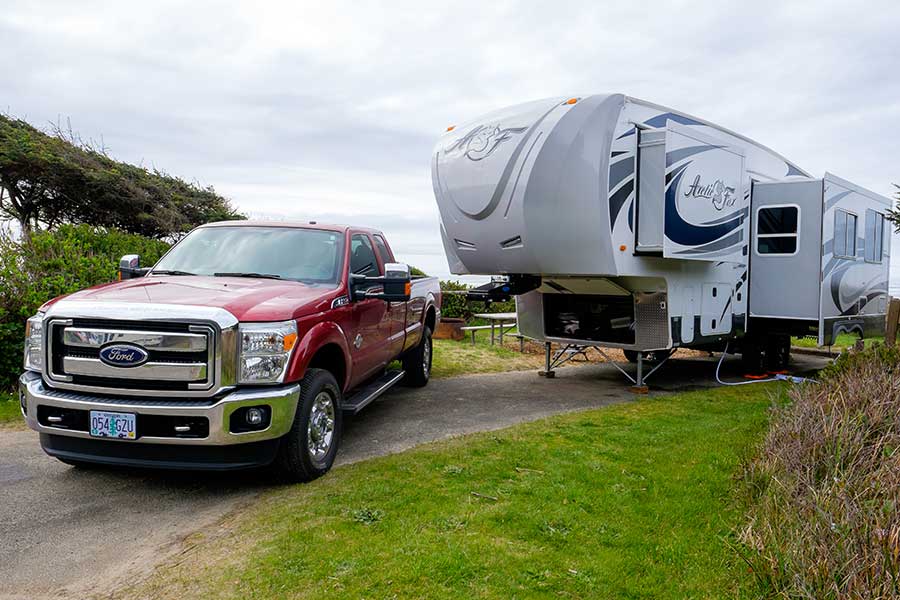
A 5th wheel camper can weigh anywhere from 5000 to 16000 pounds when empty, with the average being 12700 pounds. This sort of camper has the most cargo capacity of any other, with most being able to carry 6000 pounds. That includes the fluids that make the features work, but those aren’t going to put a dent into 6000 pounds any time soon.
Even the lightest-duty 5th wheel camper has a maximum total weight of 17000 pounds, and the heavier duty ones can get up to 20000 pounds when fully loaded.
Recent Posts
Pulling A Gooseneck Trailer | CDL Requirements
A CDL is required for all large hauls on public roadways. But with so many trailers and different transportation options, it is easy to wonder if you need a CDL for certain loads or trailers. One...
U-Haul Trailer Hitch Installation: Labor Cost, Hitch Reciever, & Wiring
Most vehicles have some capacity to tow a trailer or use a hitch rack, even small cars, but a lot of vehicles don't come with a hitch installed. Luckily, you can almost always get a hitch installed...

10 Must-See Travel Trailer Floor Plans (With Slide-Outs)
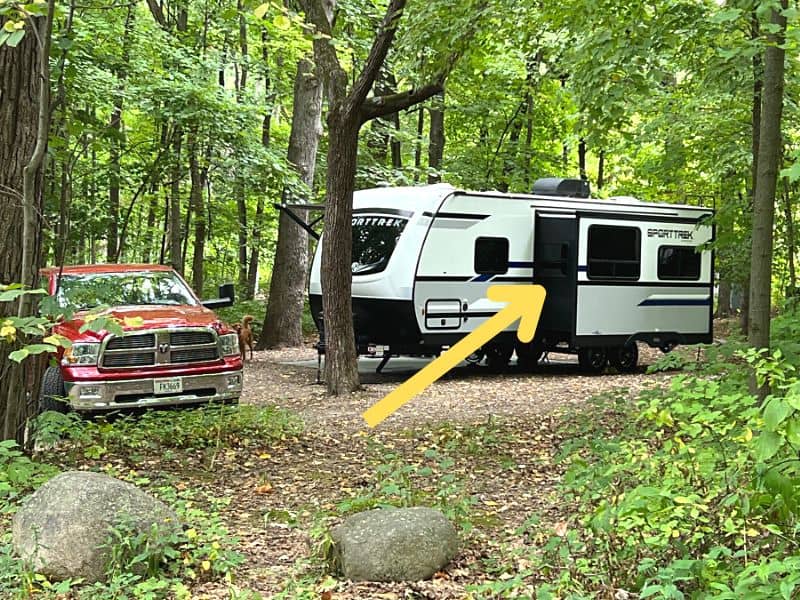
Travel trailers come in what seems like an endless variety of sizes and configurations.
From small lightweight micro campers to large luxury trailers.
Regardless of size or configuration though, one of the most popular travel trailers features is the RV slide-out.
As RV slide-outs provide numerous benefits, including increased living space, improved comfort, and enhanced layouts, plus many more .
With so many travel trailer floor plans on the market though, it’s easy to become overwhelmed.
So to help narrow down your search, we created this list of must-see travel trailer floor plans with slide-outs , ordering them from smallest to largest.
That way, no matter what size travel trailer floor plan you’re looking for, you’re sure to find one with a slide-out to meet your needs.
Travel Trailer Floor Plans With Slide-Outs (Smallest to Largest)
1. forest river flagstaff e-pro e19fbs.
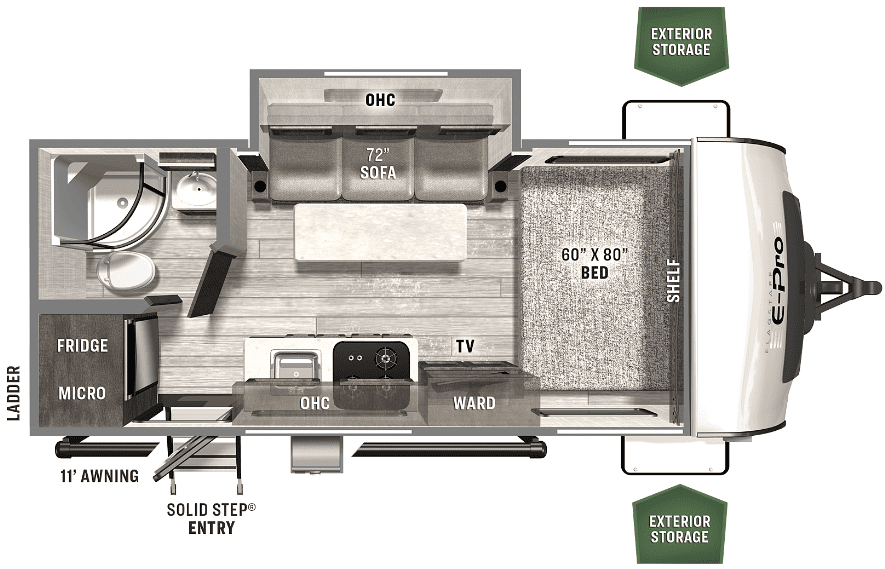
Quick Specs
- Average Cost : $29,000
- Length : 20 Feet 2 Inches
- Dry Weight : 3,375 Pounds
- Sleeping Capacity : 4
- Bathroom : 3-Piece Dry Bath
- Slide-Outs : 1
The Forest River Flagstaff E-Pro E19FBS, sister RV to the Rockwood Geo Pro G19FBS , is one of the most popular small couple’s trailers on the market.
Thanks to a variety of reasons, one of the biggest though is its slide-out.
This 20-foot travel trailer floor plan is one of the few campers of this size that offers a slide-out .
Which greatly improves the interior space and functionality of the camper.
There’s more to this travel trailer than just its slide-out though, as the camper also offers a full suite of features that makes it great for weekend getaways as well as extended camping.
As the E-Pro E19FBS features a well-equipped kitchen, a three-piece dry bath, an east-to-west queen bed, and a comfy sofa.
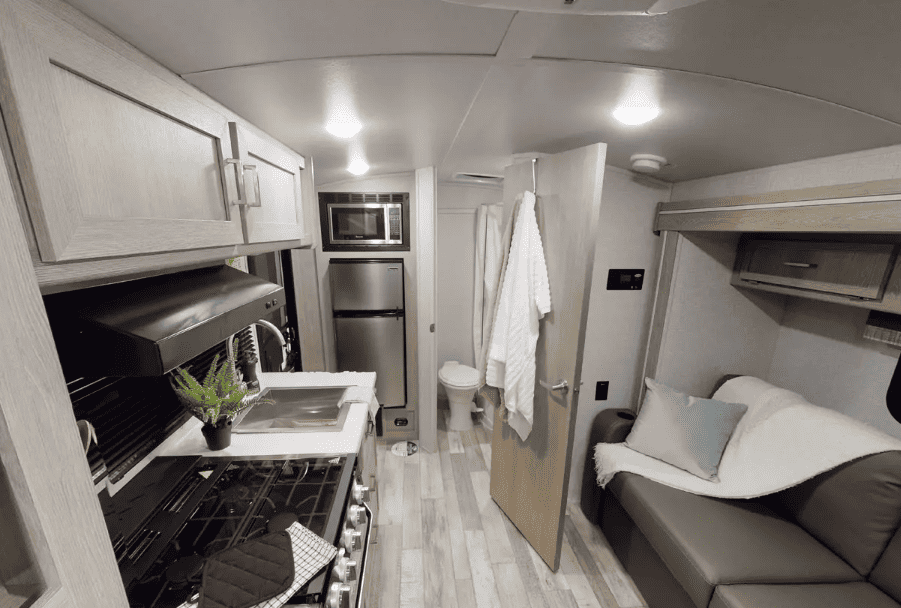
Plus, if you need to sleep more than two people, the sofa jack knifes down into a sleeper sofa, bringing the total sleeping capacity to four.
Best of all, Forest River was able to incorporate all these features into the travel trailer, while still keeping the overall weight down.
As the E19FBS has a dry weight of under 3,500 pounds, making it a very lightweight travel trailer .
For more information on the Forest River E-Pro E19FBS and to take a 3D tour of the floorplan, check out Forest River’s website here .
2. Grand Design Imagine XLS 17MKE
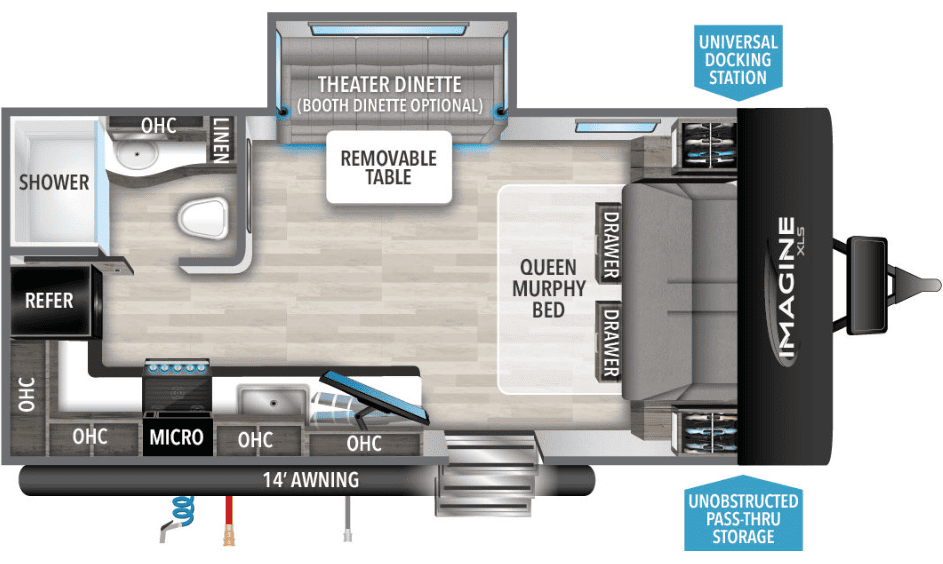
- Average Cost : $33,500
- Length : 21 Feet 11 Inches
- Dry Weight : 4,674 Pounds
The Grand Design Imagine XLS 17MKE is another popular floor plan with a slide-out designed for couples.
As this floorplan utilizes every square inch of space to maximize comfort and convenience for two.
Making it a great choice for all types of couples camping including full-time RV living .
Starting with its front bedroom, which utilizes a queen Murphy bed to maximize sleeping comfort at night, while still providing plenty of room to hang out during the day.
The real stand-out feature of this Grand Design travel trailer though is its large rear L-shaped kitchen, which offers more counter and cabinet space than just about any other 22-foot travel trailer.
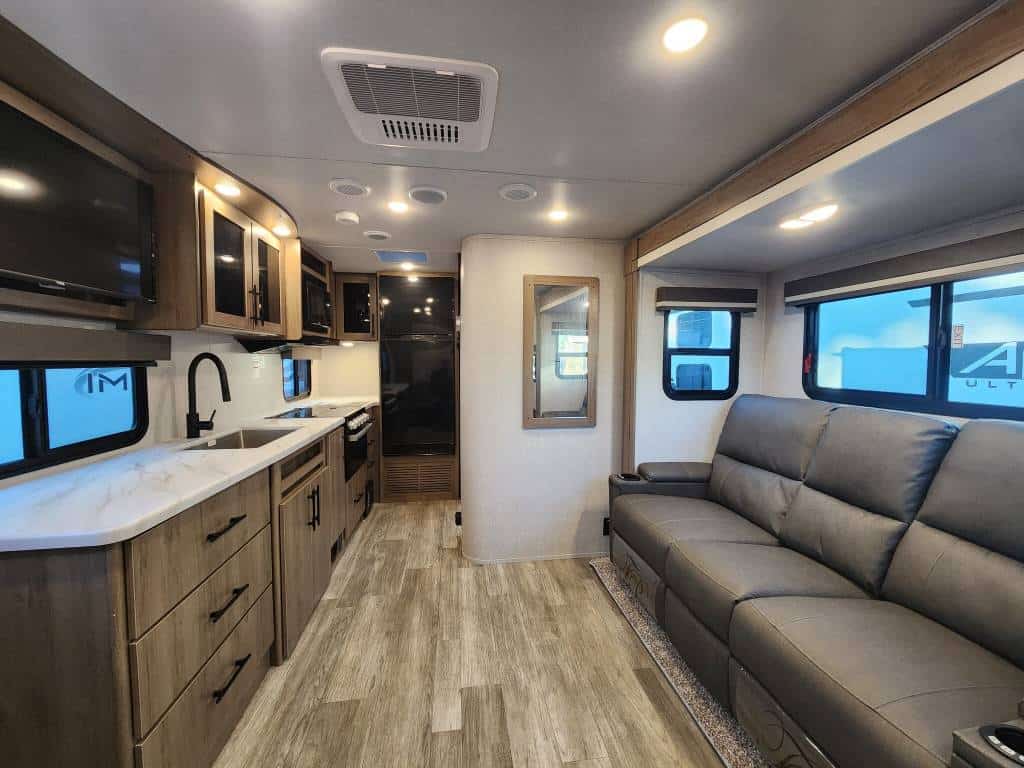
Finally, rounding out the floorplan is a spacious well-laid-out rear corner bath.
Which offers a separate shower, toilet, and bathroom vanity, plus, a medicine cabinet and even a small linen closet.
Of course, none of these amenities would be possible without the trailer’s mid-slid-out, which not only provides enough space for the theatre dinette or optional dinette booth but also all the rest of the amenities inside the camper.
To see other compact campers perfect for full-time RV living, check out our blog post “ The 10 Best Small Travel Trailers for Full-Time Living “.
3. Winnebago Micro Minnie 2108TB
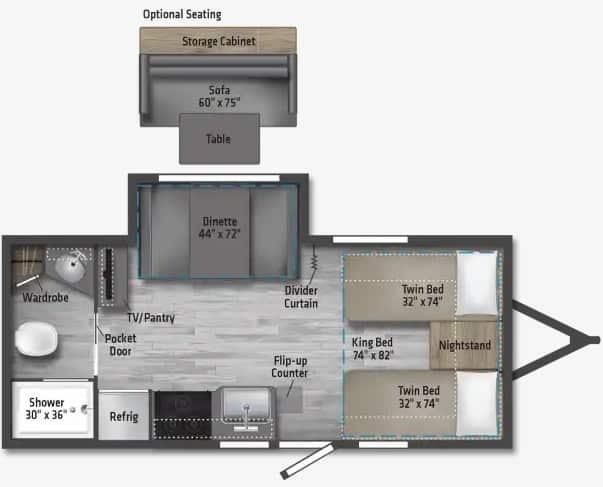
- Average Cost : $32,000
- Length : 22 Feet 5 Inches
- Dry Weight : 4,040 Pounds
Twin-bed floor plans are becoming more popular every day.
Thanks to their improved accessibility, increased walkability, and flexible sleeping accommodations.
One of the most popular twin bed travel trailer floor plans is the Winnebago Micro Minnie 2108TB.
As this twin-bed floorplan offers best-in-class comfort and functionality, while still keeping the trailer compact and lightweight .
The Micro Minnie 2108TB has a length of only 22 feet 5 inches and an unloaded weight of just over 4,000 pounds.
Making this Micro Minnie one of the smallest travel trailers available to offer both twin beds and a slide-out.
Which provides unparalleled flexibility and utility to this small travel trailer.
For more information on the Winnebago Micro Minnie 2108TB, check out Winnebago’s website by clicking here .
4. Lance 2185
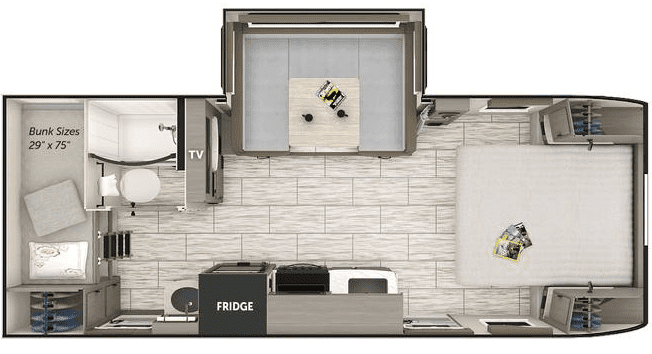
- Average Cost : $60,000
- Length : 26 Feet 1 Inch
- Dry Weight : 5,345 Pounds
- Sleeping Capacity : 6
- Bathroom : Split 3-Piece Dry Bath
Another floorplan type that pairs nicely with an RV slide-out is the wildly popular bunkhouse floorplan, designed to maximize sleeping capacity.
Because if you’re going to maximize sleeping capacity you need to maximize space, and one of the best ways to do this is with a slide-out.
Bunkhouse floor plans are offered in two main configurations, depending on the size of the trailer.
The first type is a floor plan that offers bunk beds, like the Lance 2185 featured here.
This type of bunkhouse floor plan is typically found on smaller to mid-size campers.
The second type offers a large dedicated rear bunkhouse with multiple bunks, which is typically found on larger travel trailers ( like #10 on this list ).
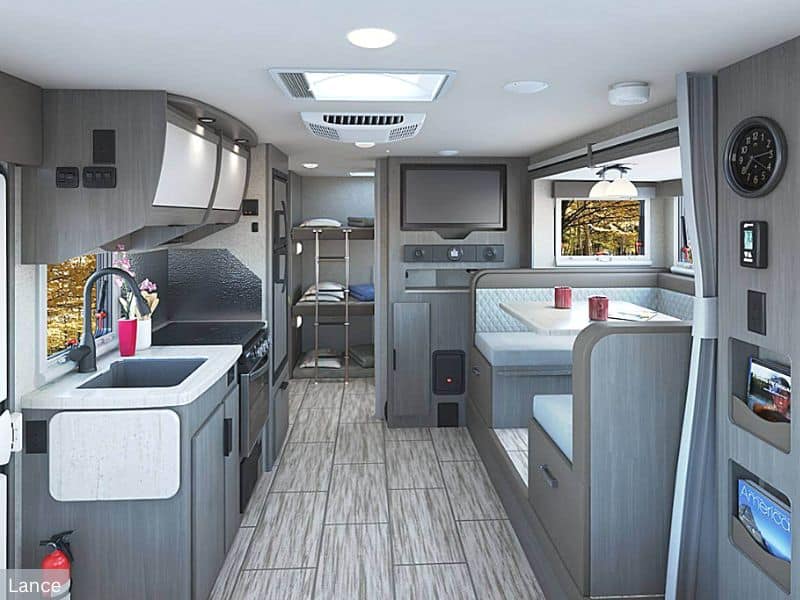
Regardless of type though, an RV slide-out is almost a must on a bunkhouse camper , as you need to maximize living space to maximize sleeping capacity.
Which this Lance 26-foot travel trailer floor plan does a great job of, as this small camper with bunks offers rear bunk beds, a convertible u-shaped dinette booth, and a large north-to-south fixed bed.
Only made possible by the trailer’s mid-slide-out.
For more information on the Lance 2185 premium camper, check out Lance’s website by clicking here .
5. Coachmen Northern Spirit 2252MD
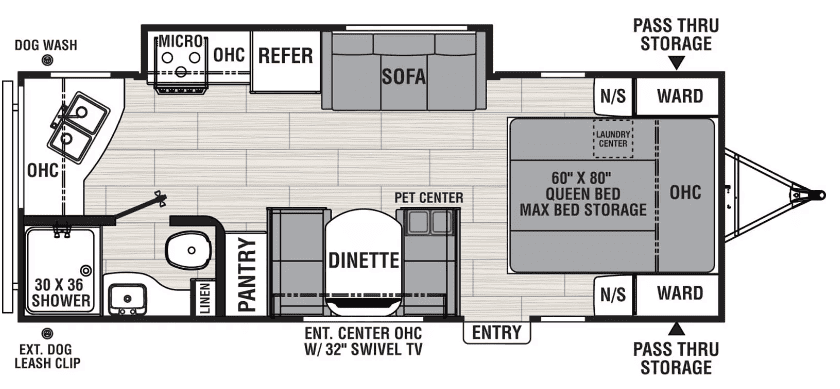
- Average Cost : $35,000
- Length : 26 Feet 11 Inches
- Dry Weight : 5,200 Pounds
The Coachmen Northern Spirit 2252MD is unique for many reasons, but one of the main ones is its large slide-out.
As the Northern Spirit 2252MD offers one of the largest slide-outs available on a 26-foot camper .
Because of this, it also offers more interior space than just about any other 26-foot travel trailer .
But just how much bigger is the slide-out on the Northern Spirit 2252MD?
The answer is about twice the size of a standard slide-out, as the curbside slide on the 2252MD spans more than half the RV.
Allowing the trailer to offer features and amenities not typically found on a camper of its size, including a rear L-shaped kitchen, both a sofa and a dinette booth, and a north-to-south queen bed.
To take a video or virtual tour of the Coachmen Northern Spirit 2252MD’s floorplan, visit Coachmen’s website by clicking here .
6. Jayco Jay Flight 267BHS
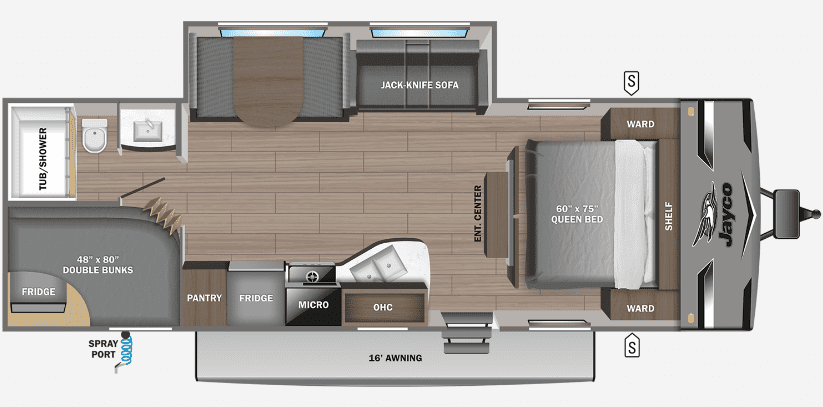
- Average Cost : $31,500
- Length : 30 Feet 4 Inches
- Dry Weight : 5,880 Pounds
- Sleeping Capacity : 8
The Jayco Jay Flight 267BHS floor plan is a great example of a hybrid bunkhouse layout .
Because while the trailer doesn’t offer a completely separate rear bunkhouse, it also offers more than just two single bunk beds.
As the Jay Flight 267BHS offers rear corner double bunks with their own separate windows and privacy curtains .
Acting like little mini bedrooms inside the trailer, which is why they’re so popular with kids.
Plus, when you add these double bunks to the trailer’s additional sleeping berths, including a convertible dinette booth, a jack-knife sofa, and a queen bed, it brings the sleeping capacity up to eight.
Making it one of the highest sleeping capacities offered on a 30-foot camper .
This 30-foot travel trailer floor plan offers more than just a high-sleeping capacity and double bunks though, as the trailer is loaded with upgrades as well.
Including a large curb-side slide-out , a fully equipped kitchen with a pantry, a private front bedroom, and a dedicated entertainment center.
To learn more about the Jayco Jay Flight 267BHS and to take a 3D tour of the floorplan, check out Jayco’s website here .
7. KZ RV Sportsmen SE 271BHKSE
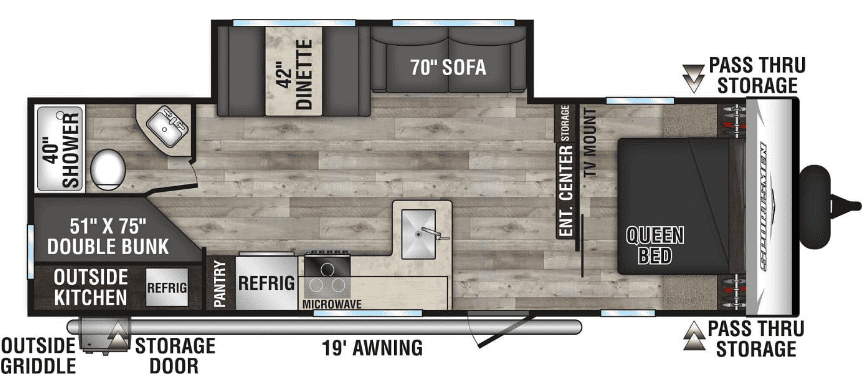
- Average Cost : $27,000
- Length : 30 Feet 11 Inches
- Dry Weight : 5,710 Pounds
- Slide Outs : 1
At just under $30,000, the KZ RV Sportsmen SE 271BHKSE represents one of the best values you’ll find on a 30-foot travel trailer.
Because despite its more affordable price, this camper is loaded with upgrades and amenities.
Starting with perhaps the most important upgrade for this list, a large curb-side slide-out , which incorporates the trailer’s dinette booth and jack-knife sofa.
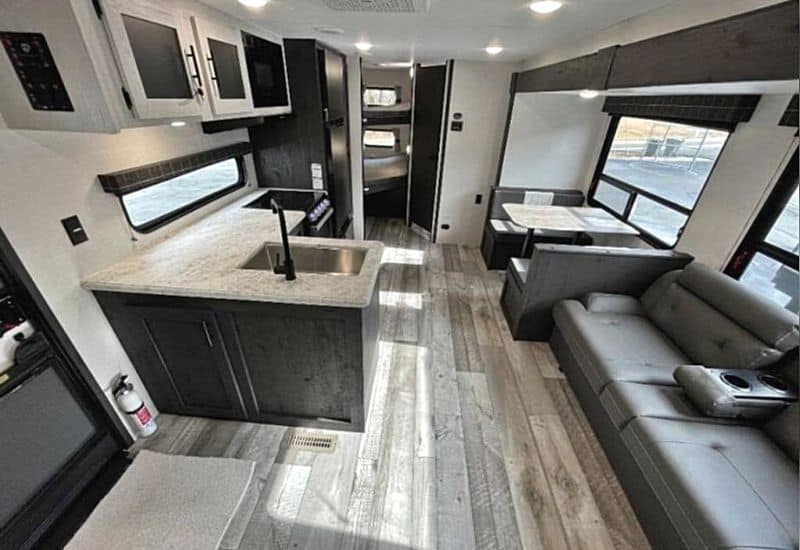
Similar in many ways to the Jayco Jay Flight 267BHS’s floorplan, the KZ RV Sportsmen SE 271BHKSE offers a very similar layout.
In fact, when comparing the two floorplans side-by-side it’s hard to tell them apart.
Because both floor plans offer a private front bedroom with a queen bed, a well-equipped campside kitchen, double rear corner bunks, and a spacious rear bathroom.
Which makes the Sportsmen SE 271BHKSE all the more impressive.
As this Sportsmen SE is able to offer all these features while still being thousands of dollars cheaper compared to the Jay Flight.
To see other affordable travel trailers under $30,000, check out our blog post “ Top 10 Travel Trailers Under $30,000 (With Pricing & Video) “.
8. Grand Design Imagine 2970RL
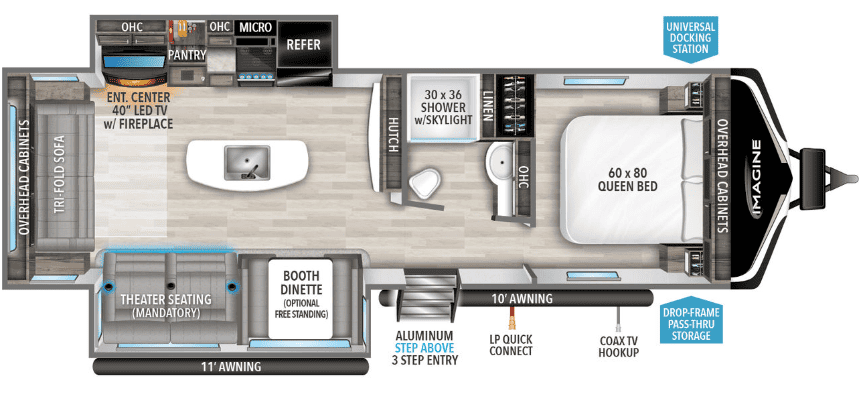
- Length : 34 Feet 2 Inches
- Dry Weight : 7,397 Pounds
- Slide-Outs : 2
The Grand Design Imagine 2970RL offers the coveted rear living room layout with opposing slide-outs.
This means that this RV floorplan has not one, but two slide-outs.
Giving the camper much more living space compared to a travel trailer offering only one or no slide-outs.
Plus, because the slide-outs are arranged in an opposing configuration, it gives the camper a very open and spacious feel, typically only found on larger 5th wheels .

The extended slide-out living space also helps the trailer feel more like a home than an RV.
Prioritizing relaxation and entertainment, this larger travel trailer floor plan provides the perfect setting for hanging out and unwinding after a day of adventure.
In addition, the large windows found on the campside slide-out ensure the trailer is flooded with tons of natural light.
Further enhancing the feeling of space inside the camper, which when combined with all its premium features makes this travel trailer hard to beat.
To learn more about the Grand Design Imagine 2970RL and to take a virtual tour of the floor plan, visit Grand Design’s website here .
9. Keystone Cougar Half-Ton 30RKD
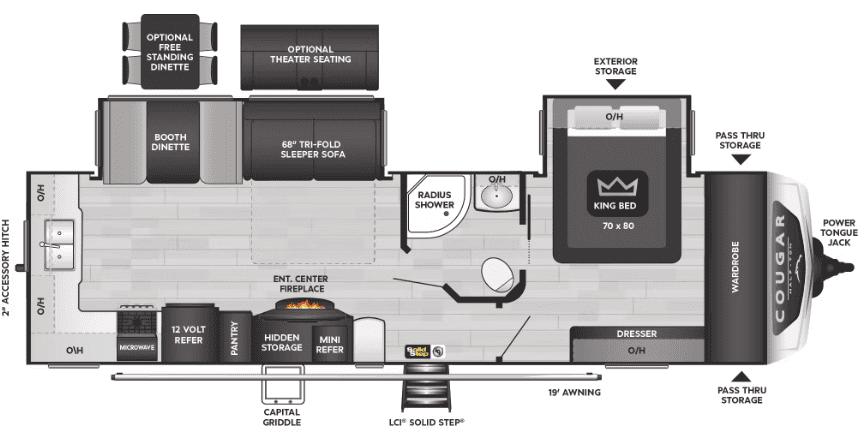
- Average Cost : $49,500
- Length : 34 Feet 9 Inches
- Dry Weight : 7,772 Pounds
One of the most well-known RV models is the Keystone Cougar Half-Ton, which is available in both travel trailer and 5th-wheel configurations.
Designed to be pulled by half-ton trucks, like the Ford F-150 or RAM 1500 , the Cougar Half-Ton maximizes size and features while still keeping the trailer on the lighter side.
One of the most popular Cougar Half-Ton floor plans is the 30RKD, which offers a rear kitchen layout and two slide-outs.
This travel trailer floor plan has a thoughtfully designed interior with many amenities.
At the front, there’s a private bedroom with a king-size bed on a slide-out and a massive full-wall wardrobe.
The main living area, which has the trailer’s other slide-out, features a booth dinette and a tri-fold sleeper sofa or optional theater seating and a free-standing table.
The floor plan also offers a fully-equipped rear L-shaped kitchen, which boasts tons of counter and cabinet space as well as a full suite of upgraded appliances.
Rounding out the floorplan is a mid-bath, which offers a radius shower and dual entrances.
For more info on the Keystone Cougar Half-Ton 30RKD, check out Keystone’s website by clicking here .
10. Forest River Salem 33TS
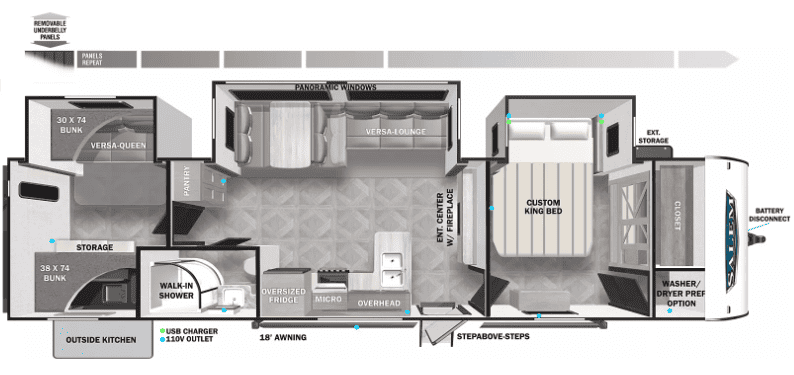
- Average Cost : $43,000
- Length : 38 Feet 9 Inches
- Dry Weight : 9,276 Pounds
- Sleeping Capacity : 10
- Slide-Outs : 3
Forest River offers many popular travel trailer floor plans , but some of the most popular are in their Salem lineup.
In fact, the Forest River Salem and its floor plans are so popular that they made it on our list of the most popular travel trailers available today .
If you had to choose one Salem floor plan that’s the most popular though, it would have to be the Salem 33TS.
Thanks in large part to the 33TS’s spacious layout, which utilizes every square inch of space.
Offering three slide-outs, it has a larger living area than many of its competitors, making it perfect for large families or groups.
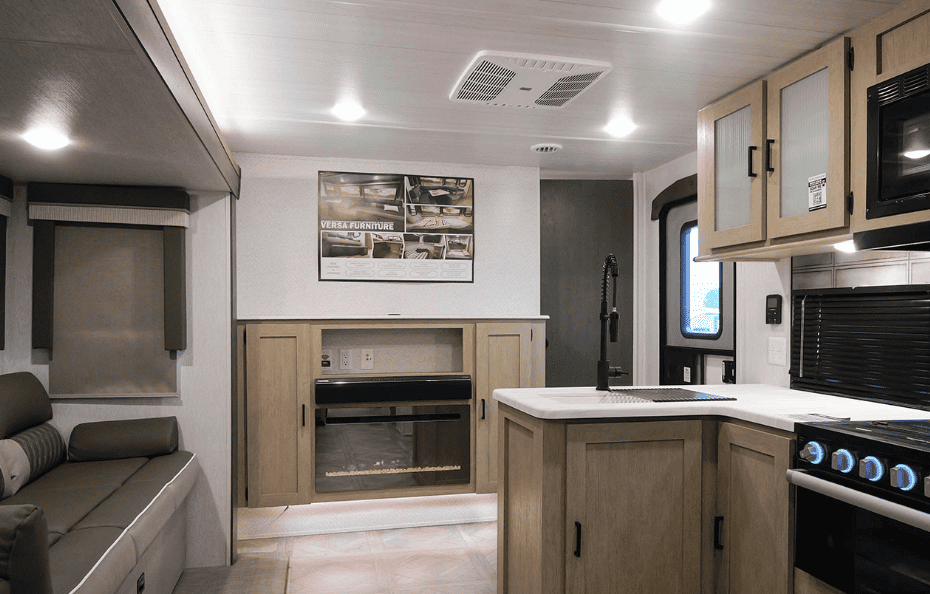
The interior design of the 33TS is both functional and stylish.
Its well-appointed kitchen, complete with modern appliances and ample counter space, allows for easy meal prep.
The owner’s front bedroom, offers a retreat-like experience, with a custom king bed on a slide-out and ample storage space with washer and dryer prep.
The rear of the trailer features a dedicated bunkhouse with a slide-out and multiple bunks , which is always a hit with kids.
The floor plan also features a large central living room equipped with comfortable seating and a sizable entertainment center.
Making it the perfect space for relaxing in the evening.
To take a video or virtual tour of the Forest River Salem 33TS’s floorplan, check out Forest River’s website by clicking here .
Advantages of Travel Trailer Floor Plans With Slide-Outs
RV slide-outs, or “slides,” are one of the most popular features available on travel trailers.
As a matter of fact, many RVers won’t even consider a travel trailer unless it offers at least one slide-out.
So to understand why they’re so popular let’s take a look at some of their main benefits.
- Increased Living Space : The main benefit of an RV slide-out is the additional living space it provides.
- Improved Comfort : During longer trips, the added space from a slide-out can greatly improve comfort, especially in bad weather when stuck inside.
- Better Versatility : Slide-outs provide more layout flexibility and allow for more creative and efficient use of space.
- Accommodate More People : Slide-outs allow RVs to accommodate more people.
- More Space for Features : With the added space from slide-outs, RV manufacturers can incorporate additional features into the trailer.
- Better Separation and Privacy : Slide-outs can create a clearer distinction between different living areas, providing more privacy and separation.
- More Residential Feel : Slide-outs give a trailer a more residential feel, due to the added space and wider interior they provide.
- Better Views and More Natural Light : Windows are often incorporated into slide-outs, which offer better views and more natural light.
- Higher Resale Value : Travel trailers with slide-outs often have a higher resale value, as many RV buyers are looking for the added space and functionality they provide.
Disadvantages of Travel Trailer Floor Plans With Slide-Outs
It’s not all good news for slide-outs though, as they do have some disadvantages.
So to help you understand their drawbacks, we’ve listed the main issues below.
- Added Weight : Slide-outs add considerable weight to a travel trailer, often around 800 pounds, which decreases fuel efficiency and can require a larger tow vehicle.
- Increased Maintenance : Slide-outs have moving parts and seals, which require regular maintenance to ensure they function properly and remain watertight.
- Increased Potential for Leaks : The seals and mechanisms that keep slide-outs watertight can degrade over time, leading to potential leaks.
- Mechanical Failures : Slide-outs rely on mechanisms to extend and retract. These mechanisms can malfunction leading to a stuck slide-out and potentially costly repairs.
- Increased Setup Time : While it usually only takes a few minutes to extend or retract a slide-out, it does add to the overall setup and teardown time.
- Can Limit Campsite Options : Some campsites are too narrow or have obstacles like trees that could prevent the extension of a slide-out.
- Higher Purchase Price : Travel trailers with slide-outs tend to be more expensive than those without.
- Potential for Debris Accumulation : Unless the trailer is outfitted with slide toppers, debris can collect on top of the slide-out, which must be cleared before retracting.
Slide-Out Travel Trailer Floor Plans Wrap-Up
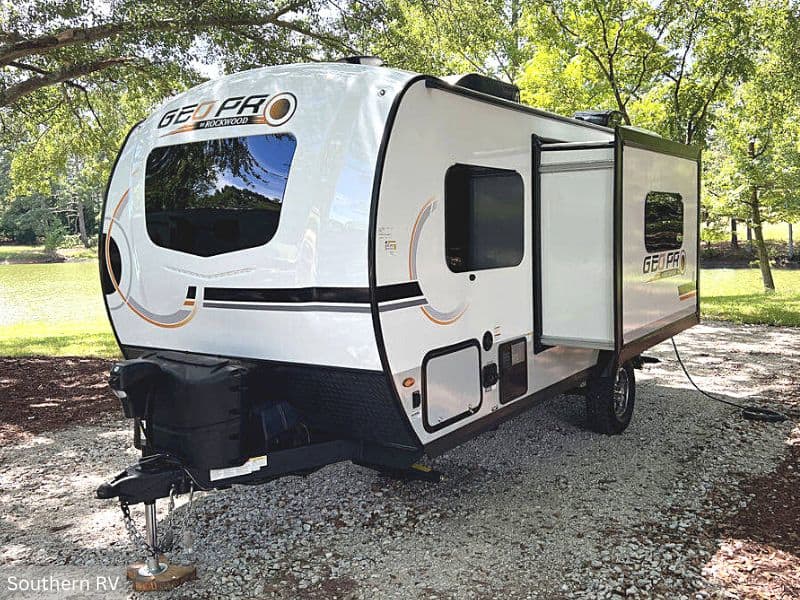
In the ever-evolving world of travel trailers, slide-outs have reshaped our expectations of on-the-road comfort and luxury.
From compact designs like the Forest River Flagstaff E-Pro E19FBS to spacious giants such as the Forest River Salem 33TS, there’s a slide-out floor plan to fit every RVer’s needs.
However, it’s important to remember that while slide-outs do offer many advantages, they also have their drawbacks as well.
Whatever travel trailer floorplan you end up choosing though, whether with or without a slide-out, we hope this blog post has helped to narrow down your search.
Or at least helped you figure out what you want and don’t want in a travel trailer.
Happy camping and safe travels!
Jason is an avid lover of RVs and the RV lifestyle. He is both a writer and editor for RV Owner HQ and has been RVing and camping for over 20 years.
Recent Posts
8 Cool Pop-Up Campers with AC to Beat the Heat
Gone are the days when camping in a pop-up meant sweating it out in a stuffy uncomfortable tent, as today's top-of-the-line pop-up campers come with a variety of comfort features, including air...
7 Best RV Mattresses for Back Pain: Back-Friendly RV Sleep
Are you tired of waking up with a sore back after a night in your RV? If so, you're not alone, as thousands of RVers suffer back pain while sleeping in their camper. This can be caused by many...

This post may contain affiliate links or mention our own products, please check out our disclosure policy
10 Best Lightweight Travel Trailers Of 2022
- Bruce Smith
- January 29, 2022
Table of Contents
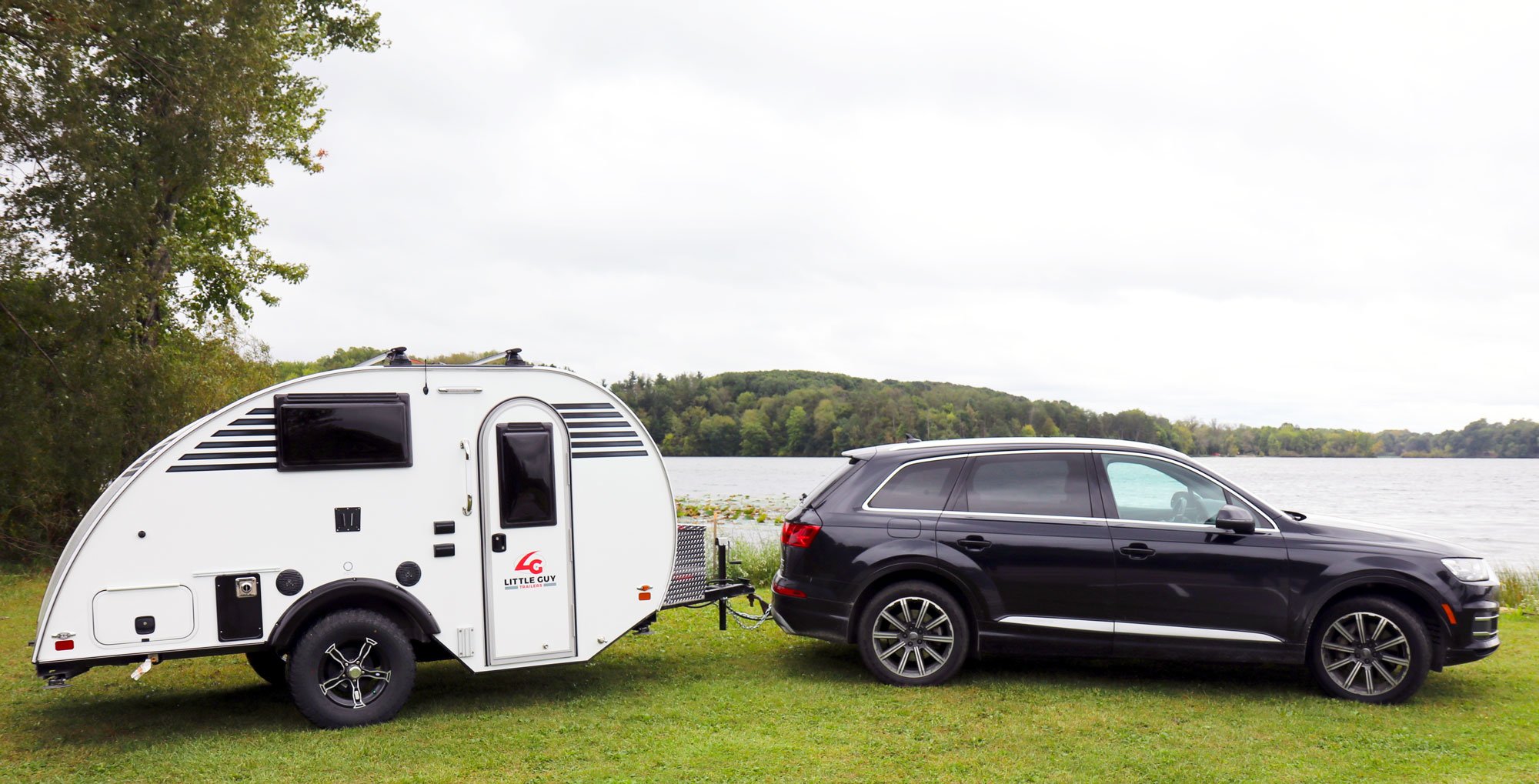
These lightweight travel trailers are lightweight and easy to tow. Photo courtesy of Little Guy.
Tread Lightly With These 10 Best Small Camper Trailers
The demand for small RVs is at an all-time high, and several RV manufacturers are responding to the demand for lightweight trailers that any car can pull. This list of the best lightweight travel trailers of 2022 spotlights the top-rated RVs for families, solo RVers, and adventure travelers.
- Each small RV trailer weighs less than 5,000 pounds.
- The ultralight trailers often cost less than a passenger car.
- Each trailer has one of the lightest gross vehicle weight ratings ( GVWR ) around. Just about any size truck or even some larger SUVs can pull them.
(If you’re looking for 2023 model-year lightweight travel trailers, check out our post 10 Best Lightweight Travel Trailers For 2023 .)
Top 10 Picks For Lightweight Travel Trailers (Under 5,000 Pounds GVWR)
Each small RV is listed in order by weight, from lightest to heaviest.
2022 nuCamp TAG XL: The Stargazer
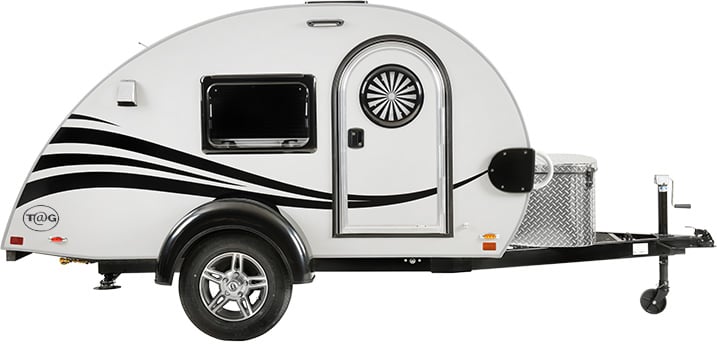
The TAG XL weighs less than 1,500 lbs – even with all of the bells and whistles.
At the top of our super light travel trailers list is the TAG. This small RV is lightweight and easy to tow. Built with custom Ohio-Amish cabinetry, under-bed storage, and an exterior shower, this teardrop trailer is the perfect way to bring some of the comforts of home when you hit the road.
Cook in nature while using the well-equipped rear galley. At night, you’ll climb into a warm and cozy interior. Watch the stars through a large stargazing window. There’s air conditioning, LED lighting, alloy wheels, electric brakes, and an optional solar roof package. No matter where you go, the TAG teardrop trailer is ready for adventure.
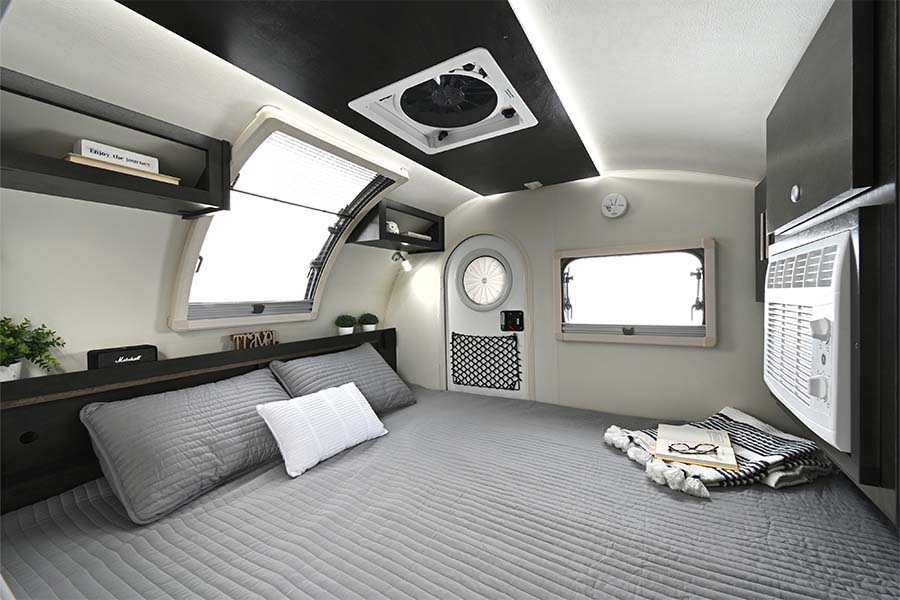
Climb into a warm, cozy interior – complete with a large window for stargazing.
- Hitch weight: 119 lbs.
- Gross vehicle weight rating: 2,200 lbs.
- Unloaded vehicle weight: 1,369 lbs.
- Exterior length: 13′ 7″
- Full exterior height: 6′ 3″
- Exterior width: 7′ 8″
- Interior height: 43″
- Freshwater capacity: 8 gallons
- Optional A/C and heater
- Base MSRP: $24,674
2022 TAXA TigerMoth Overland: The Ultimate Overlanding Vehicle
This rugged overland travel trailer is the ideal adventure home. The TigerMoth Overland Edition is a small RV with big features, including increased ground clearance thanks to the Timbren axle-less suspension with a 4″ lift.
You also get a number of premium accessories including a generous kitchen, roof cargo deck, and an optional tongue-mounted toolbox.
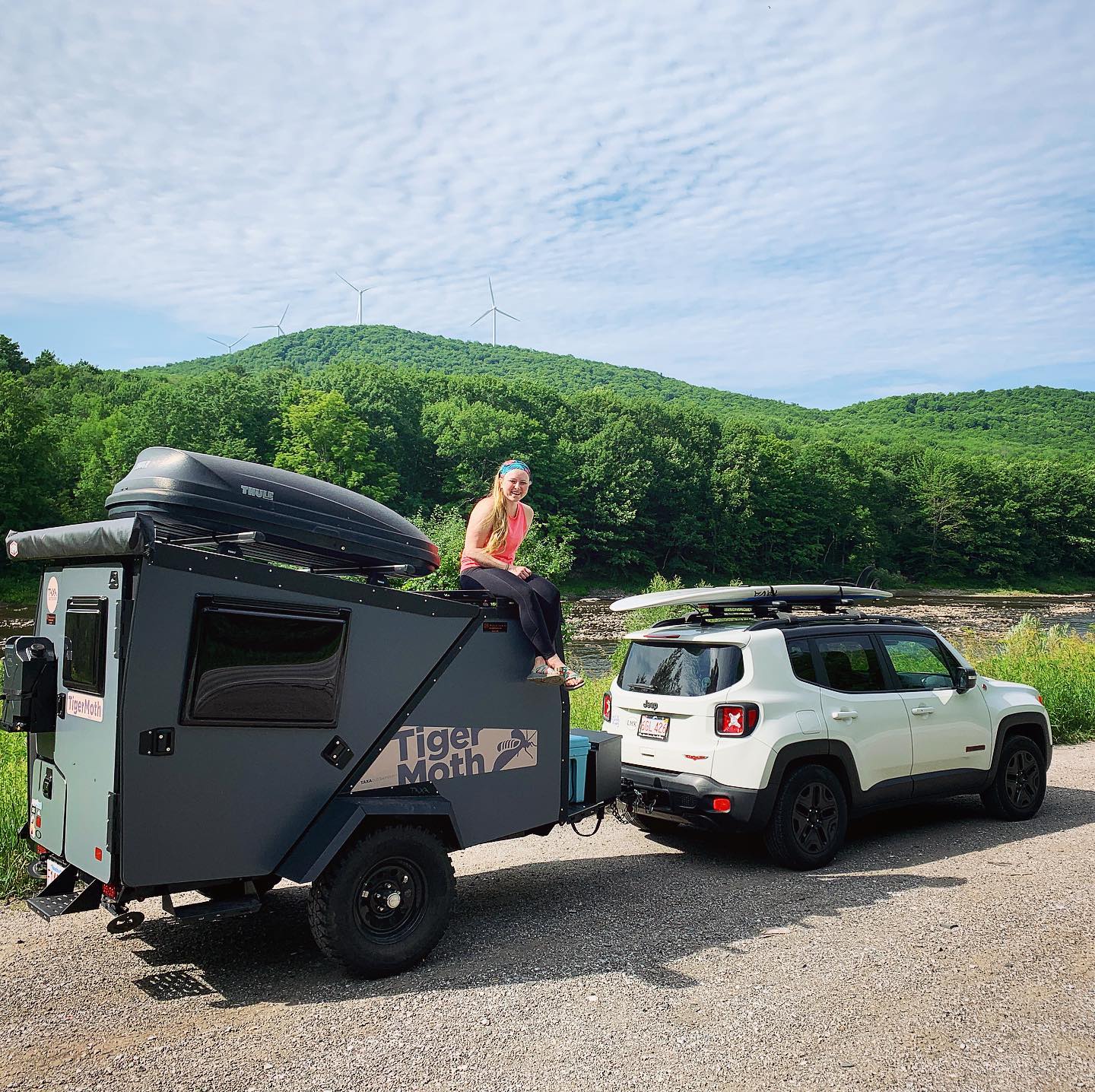
Enjoy 7+ off-grid days or longer
The TigerMoth can take you on a 7-day adventure or longer. The aerodynamic shape is fuel-efficient on the highway, and a generous interior space lets you do more with less. As a bonus, it’s also small enough to fit in a normal garage.
- Hitch weight: 195 lbs.
- Gross vehicle weight rating: 2,400 lbs.
- Unloaded vehicle weight: 1,458 lbs.
- Cargo capacity: 942 lbs.
- Exterior length: 12′ 0″
- Full exterior height: 7′
- Exterior width: 6′ 7″
- Freshwater capacity: 5 gallons
- 5 lbs propane tank & mount
- Pre-wired solar input
- Four acrylic, insulated windows with screens & shades
- 16″ alloy wheel with all-terrain tires
- Base MSRP: $29,350

Go off-grid in comfort.
2022 Travel Lite RV Rove Lite: Lightweight And Easy To Tow
Travel Lite’s new Rove Lite ultra-lightweight travel trailer is one of the most affordable travel trailers on the market (under $20K). It’s light enough to pull behind even the smallest of vehicles. You only need a towing capacity of 2,000 pounds.
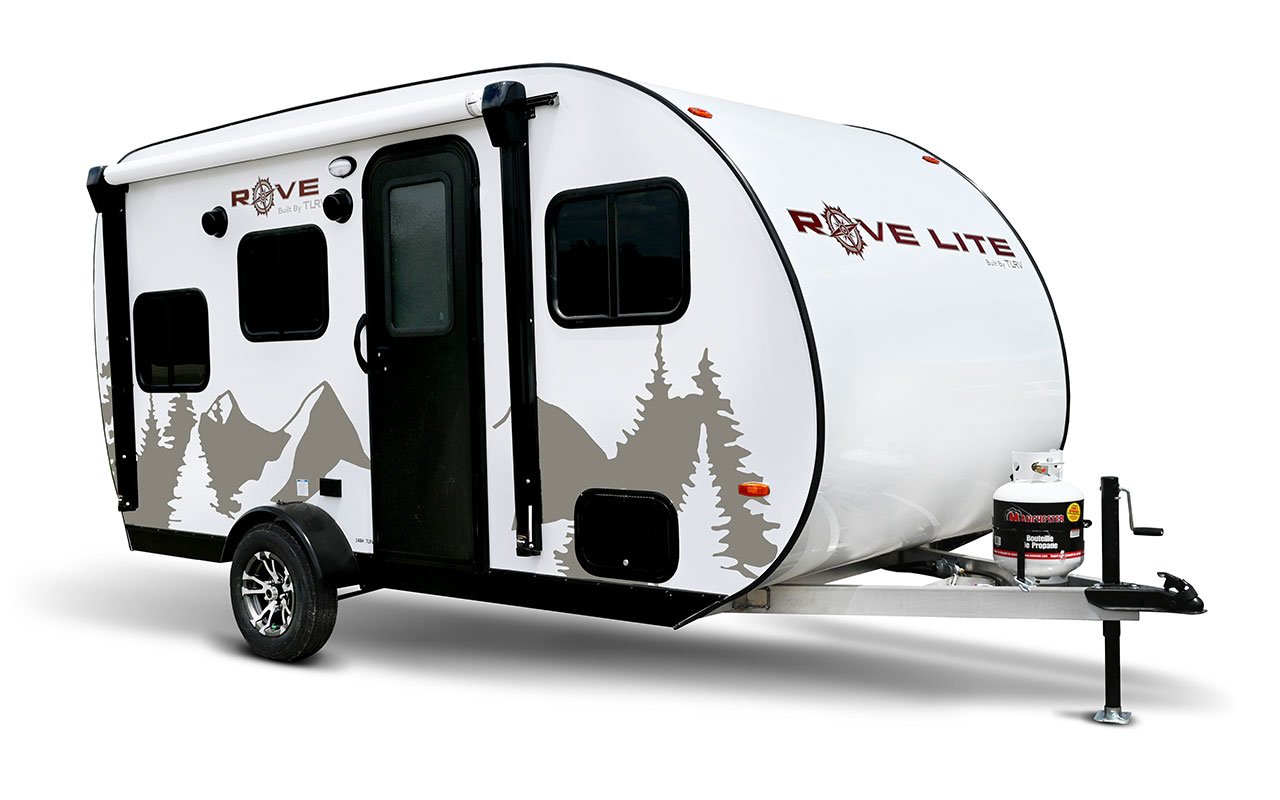
The new Rove Lite ultra-lightweight travel trailer is one of the most affordable RV trailers on the market. Photo courtesy of Travel Lite.
Enjoy the sleek Euro-style design made with state-of-the-art composite materials. There’s an aluminum chassis and a seamless poured-resin fiberglass roof. Interior features include a convertible bed and a bath with a shower. This small RV offers space-saving functionality at its best.
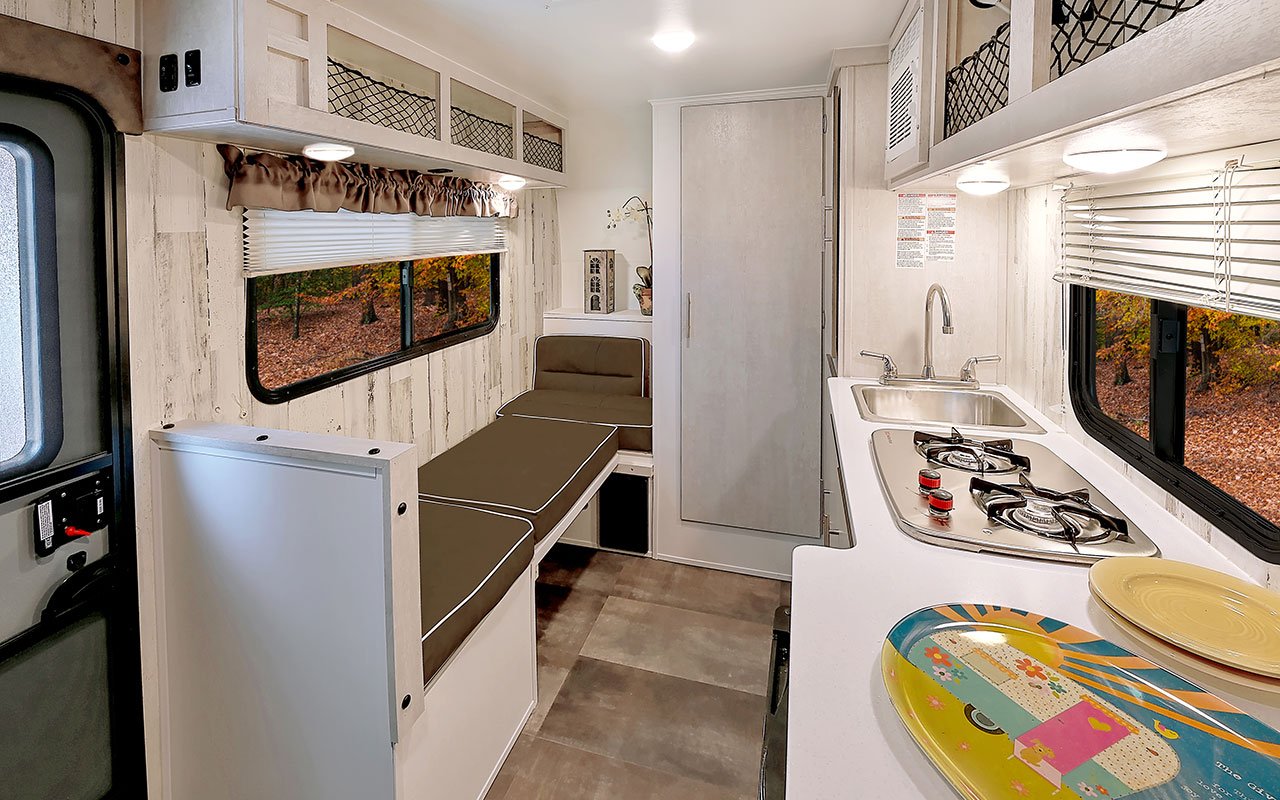
The 2022 Travel Lite RV Rove Lite ultra-lightweight travel trailer has a stylish and roomy interior. Photo courtesy of Travel Lite.
- Hitch weight: 160 lbs.
- Gross vehicle weight rating: 2,500 lbs.
- Unloaded vehicle weight: 1,707 lbs.
- Cargo capacity: 793 lbs.
- Exterior length: 15′ 4″
- Full exterior height: 8′ 1″
- Exterior width: 7′ 11″
- Freshwater capacity: 10 gallons
- Gray-water capacity: 30 gallons
- Black-water capacity: 5 gallons
- On-demand tankless water heater
- 20,000-BTU furnace
- Base MSRP: $19,424
Trillium Heritage Bunk 4500: New And Improved
Here’s a unique addition to our list of the best lightweight travel trailers of 2022: the ultralight, 15-foot, all fiberglass Trillium Heritage Bunk 4500 camper from L’air Camper Company in Ontario, Canada.
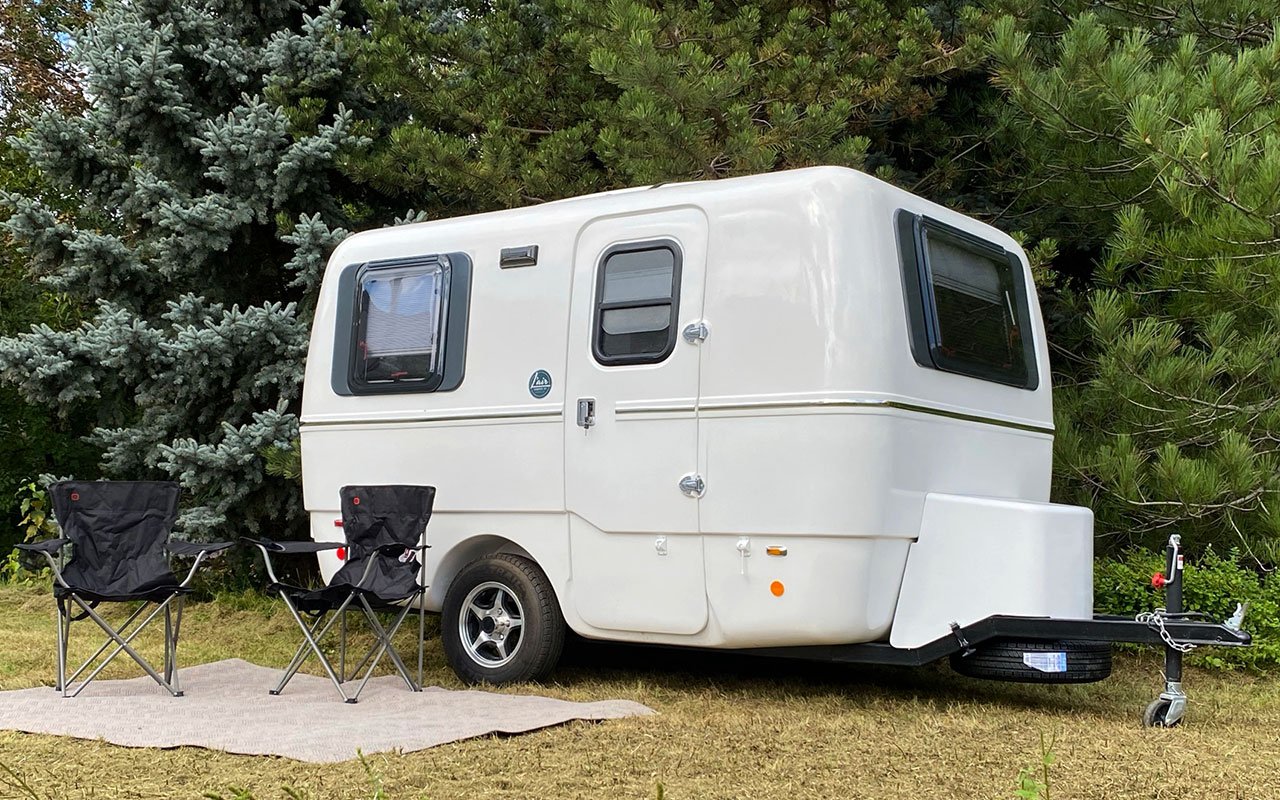
The L’air Trillium Heritage is an ultra-lightweight travel trailer that can be easily towed by many smaller SUVs and crossovers. Photo courtesy of L’air Camper Co.
This small RV received a complete facelift for 2022. It features dual-pane acrylic windows, a bigger solar panel, a 4.6-cubic-foot fridge with a freezer, and a galley makeover.
With a GVWR of just 2,700 pounds, the Trillium is an easy tow for many smaller SUVs and crossovers. Options abound for personalizing.
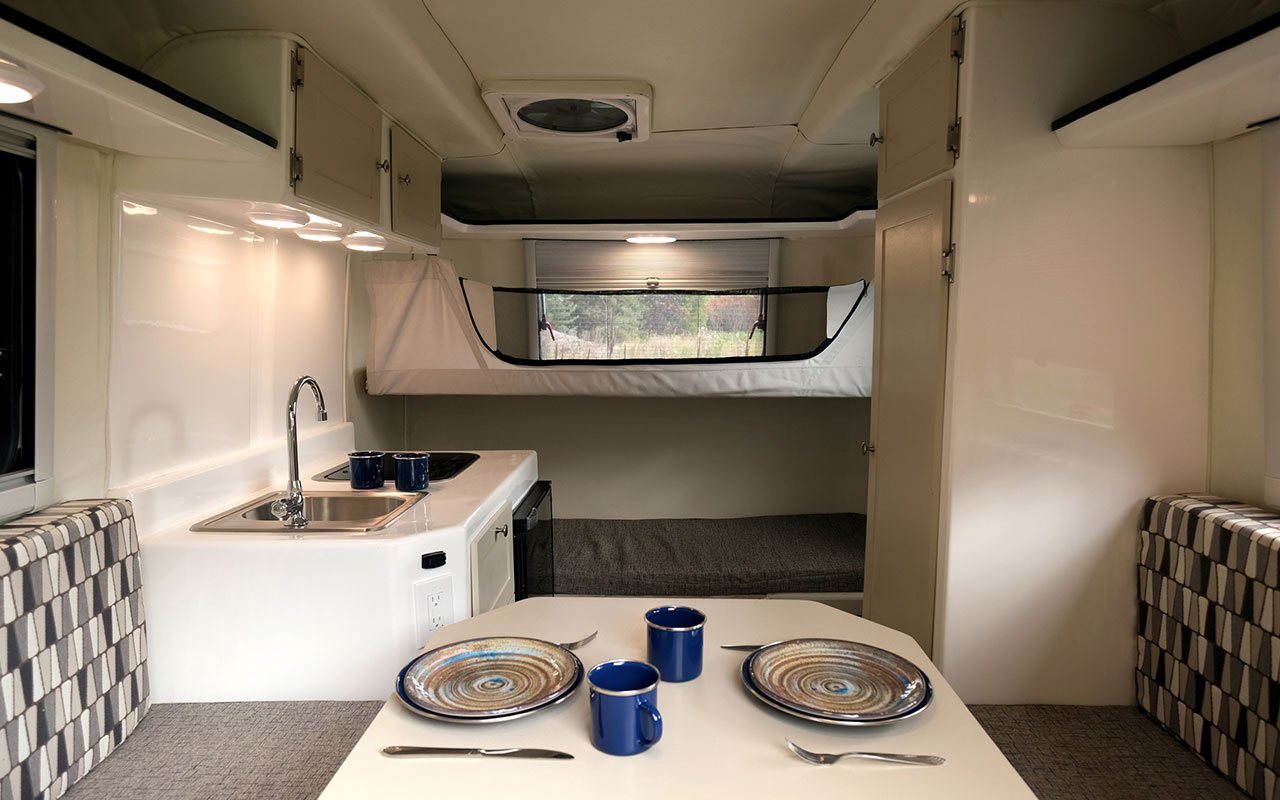
The living area of the Trillium Heritage has been updated with an all-new galley and 4.2-cubic-foot fridge. Photo courtesy of L’air Camper Co.
- Hitch weight: 180 lbs.
- Gross vehicle weight rating: 2,700 lbs.
- Unloaded vehicle weight: 1,650 lbs.
- Cargo capacity: 1,050 lbs.
- Exterior length: 15′ 2″
- Full exterior height: 6′ 2″
- Exterior width: 78″
- Freshwater capacity: 13 gallons
- Gray-water capacity: 5 gallons
- Single 130W solar panel with charge controller
- Base MSRP: $31,997
Venture Sonic Lite SL150VRB: Surprisingly Spacious
The Venture Sonic Lite SL150VRB has floorplans starting out at a fuel-saving 3,000 pounds! Both Sonic Lite and Sonic are engineered with a one-piece seamless fiberglass roof system. By arching the roof front to back, this system provides a more durable roof. When it rains, the water runs fore and aft.
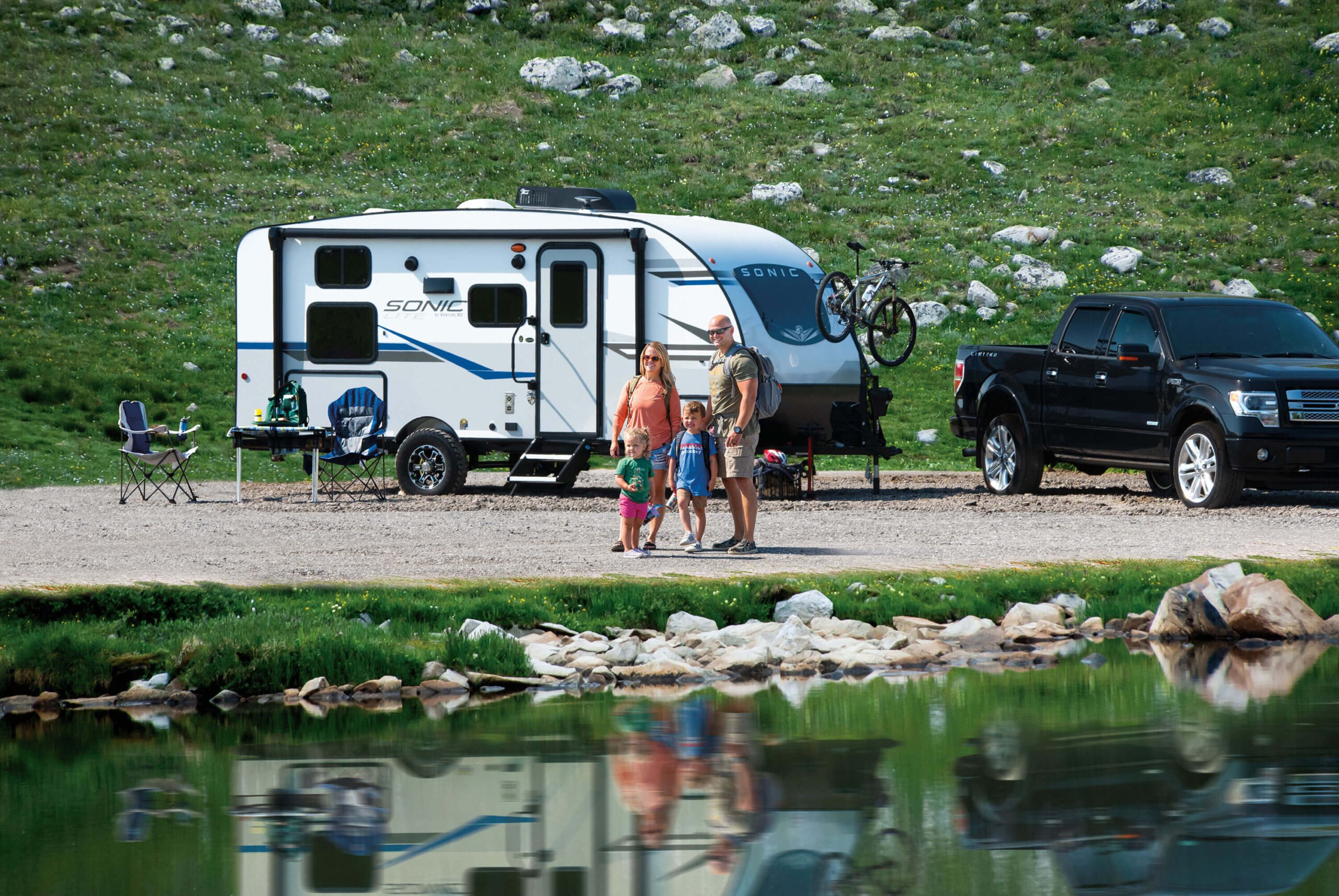
Sonic Lite trailers are engineered with a one-piece seamless fiberglass roof system.
- Hitch weight: 460 lbs.
- Gross vehicle weight rating: 3,735 lbs.
- Unloaded vehicle weight: 3,160 lbs.
- Cargo capacity: 575 lbs.
- Exterior length: 19′ 11″
- Full exterior height (with A/C): 9′ 11″
- Exterior width: 90″
- Freshwater capacity: 38 gallons
- Water heater capacity: 6 gallons
- Refrigerator: 8 cu ft
- LP gas capacity: 20 lbs
- Base MSRP: $34,059
2022 Little Guy Micro Max: Fits In Standard Garages
Finding a small travel trailer that can be parked inside a two-car garage isn’t easy unless you check out the new Little Guy Micro Max . This ultra-lightweight, four-season RV camper is a brand-new offering from Little Guy that will be coming out in early 2022.
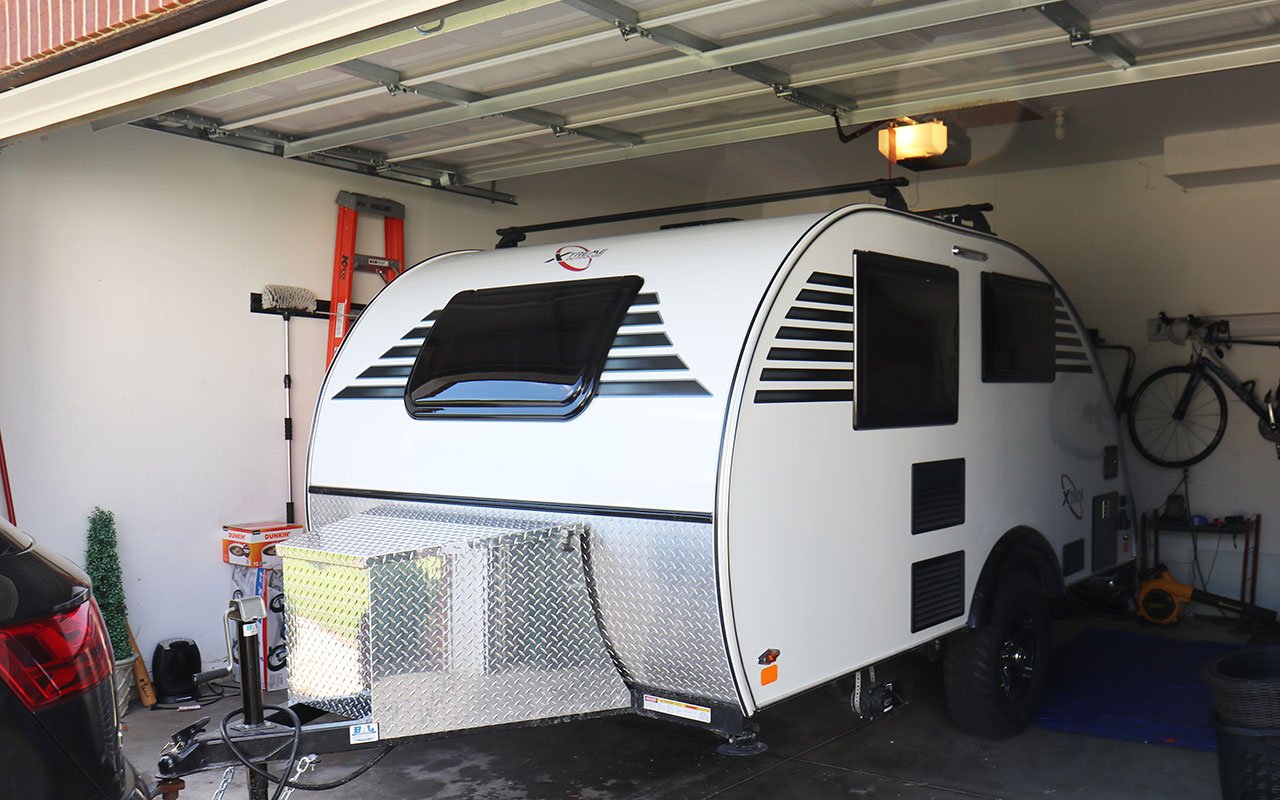
The Micro Max ultra-lightweight trailer fits inside a standard garage! Photo courtesy Little Guy Trailers.
Some of the features included in this fully equipped micro trailer are an air conditioner, a queen bed in the rear and twin bed up front, two dining areas, an interior galley, and an outdoor shower.
Headroom is a respectable 5′ 8″, which keeps the overall travel trailer height lower than the typical garage-door opening.
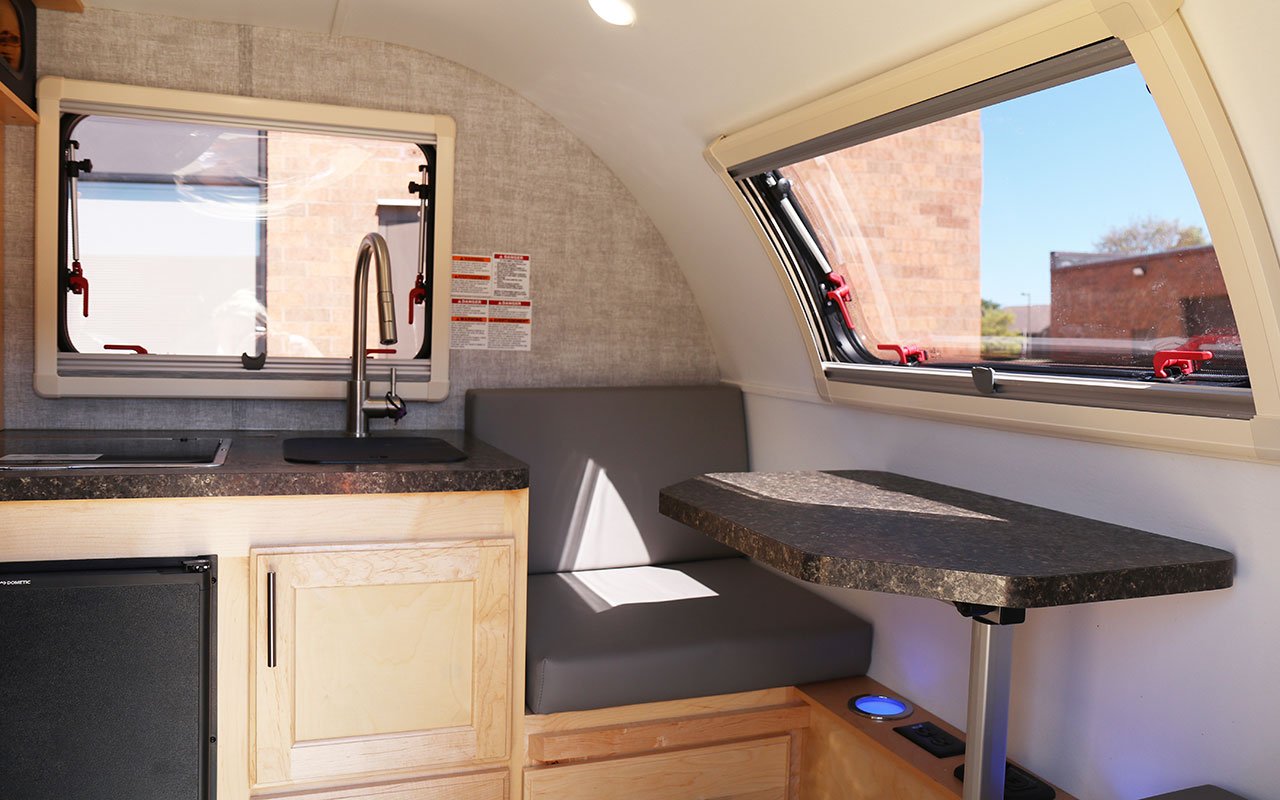
The interior of these lightweight travel trailers feels roomy with large windows. Photo courtesy of Little Guy Trailers.
- Hitch weight: 260 lbs.
- Gross vehicle weight rating: 3,500 lbs.
- Unloaded vehicle weight: 1,780 lbs.
- Cargo capacity: 1,720 lbs.
- Exterior length: 15′ 11″
- Full exterior height: 6′ 10.5″
- Exterior width: 80″
- Freshwater capacity: 12 gallons
- Gray-water capacity: 8 gallons
- Base MSRP: $25,000
Apex Nano 16R: Backcountry comfort
Be off-grid-camping ready with the Apex Nano 16R . This lightweight trailer comes with off-road tires and high-clearance suspension.
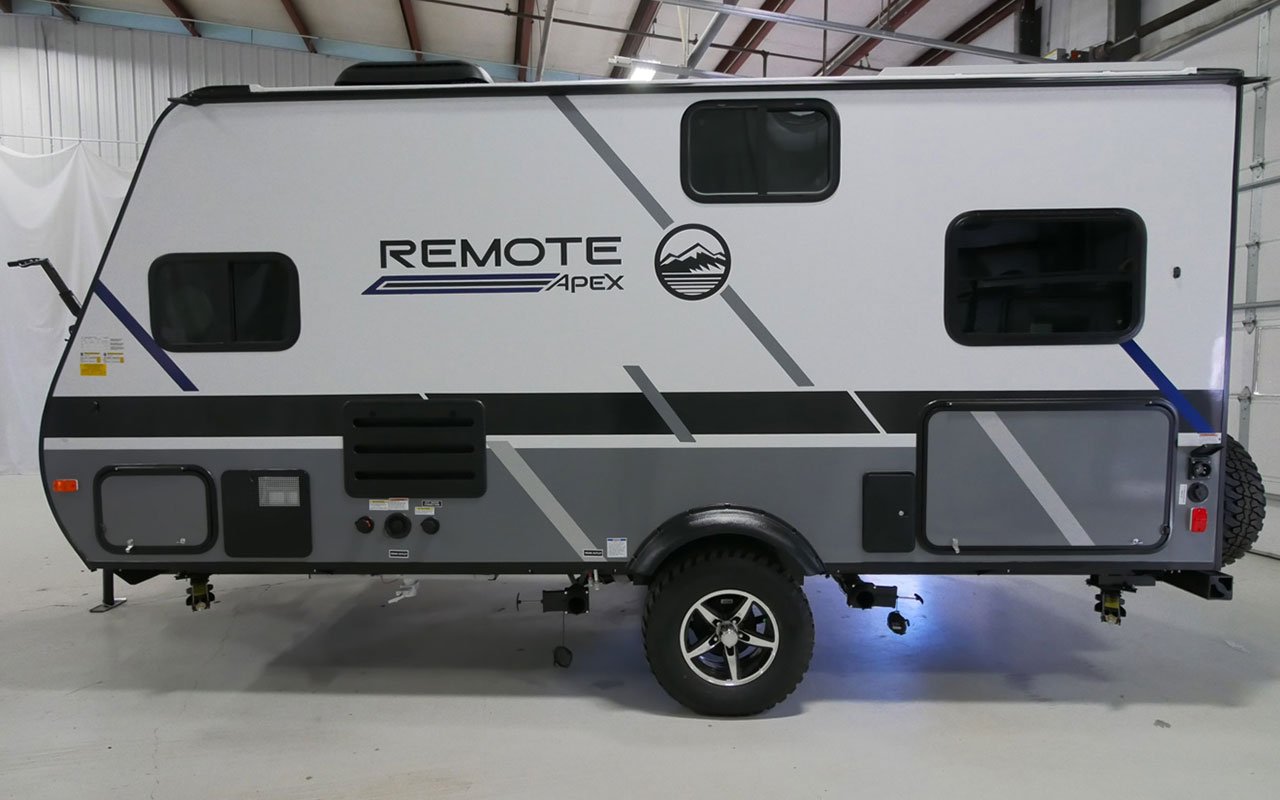
With a 3,800-pound GVWR, the Apex Nano 16R is compatible with most midsize pickups, SUVs, and some crossovers. Photo courtesy of Coachmen.
With heated freshwater and holding tanks, a 13.5K-BTU A/C, front bike rack, direct vent furnace, and sleeping accommodations for a family of four, the Apex Nano 16R travel trailer from the Coachmen line is a great choice for outdoor adventure-bound RVers. Its 3,800-pound GVWR is compatible with most midsize pickups, SUVs, and some crossovers.
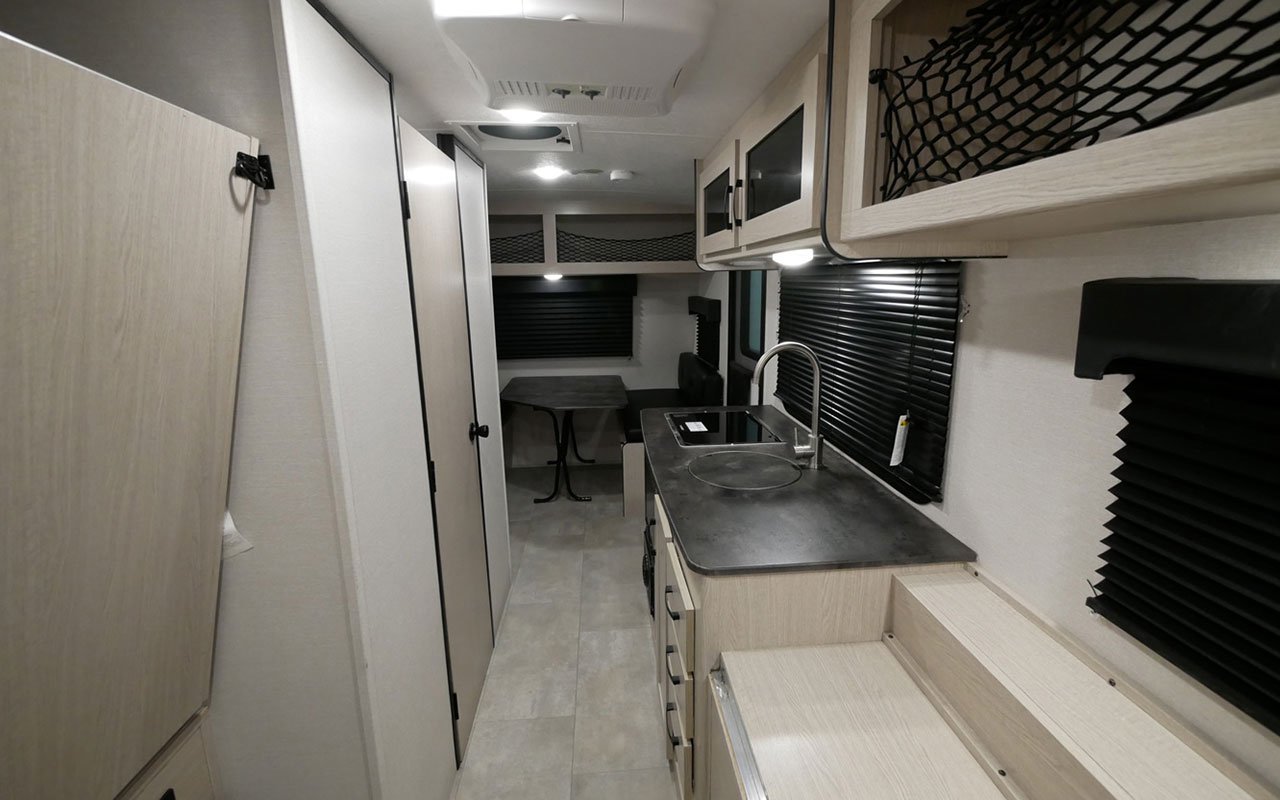
Coachmen’s Apex Nano 16R offers a 6-cubic-foot gas/electric fridge, two-burner cooktop, and microwave. Photo courtesy of Coachmen.
- Hitch weight: 330 lbs.
- Gross vehicle weight rating: 3,800 lbs.
- Unloaded vehicle weight: 2,860 lbs.
- Cargo capacity: 940 lbs.
- Exterior length: 19′ 7″
- Full exterior height: 9′ 10″
- Exterior width: 7′
- Freshwater capacity: 50 gallons
- Gray-water capacity: 35 gallons
- Black-water capacity: 35 gallons
- 6-cubic-foot gas/electric fridge
- Two-burner cooktop and microwave
- 12′ awning
- Base MSRP: $27,731
OPUS OP4: Adventure ready
There’s no other travel trailer setup like the Opus Camper’s OP4. After all, this innovative push-button, air-inflated tent camper inflates in less than two minutes and sleeps six.
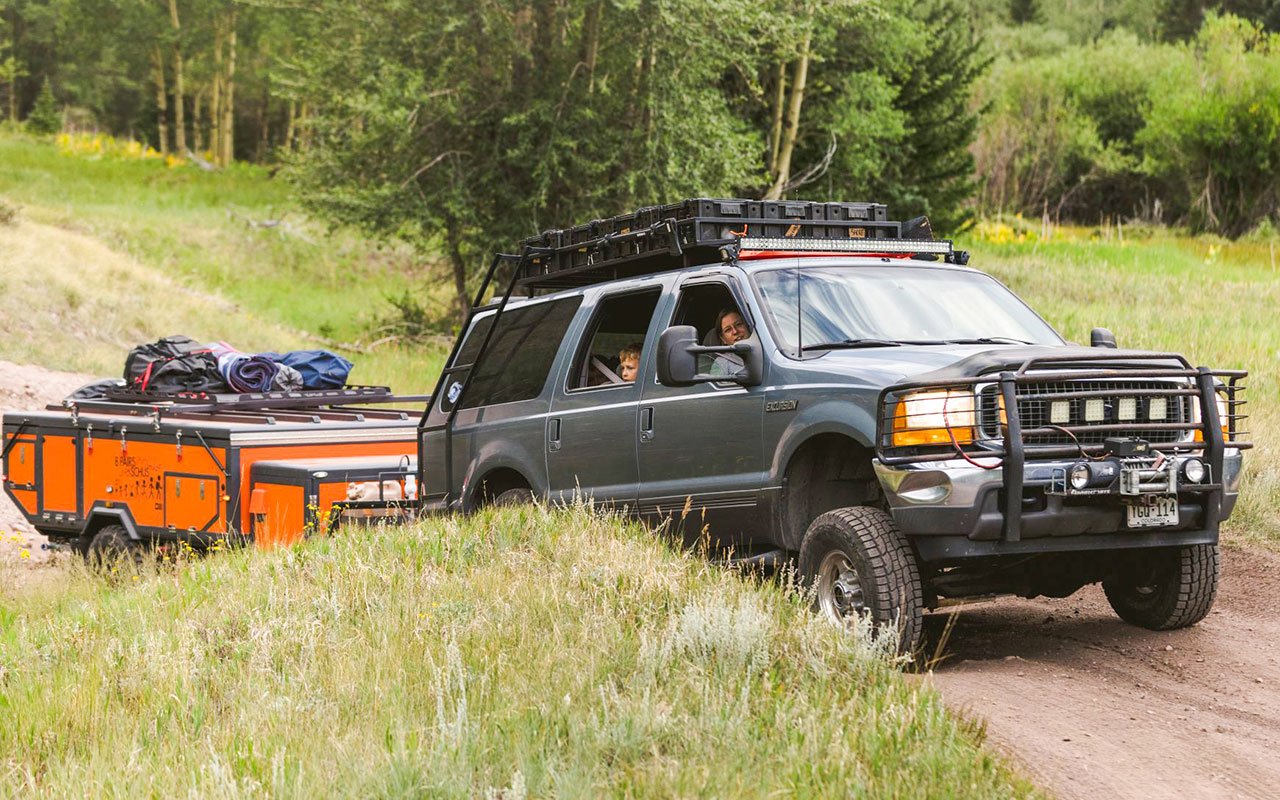
There’s no other lightweight travel trailer setup like the Opus Camper’s OP4. Photo courtesy of Opus Camper.
The OP4 has a spacious interior lounge area, high ceiling, and a ton of windows and skylights to make you feel like you’re outdoors. The external kitchen makes cooking for the family easy, and OPUS offers a long list of options, including heating, A/C, solar power, bike racks, and extension rooms to make any RV outing enjoyable.
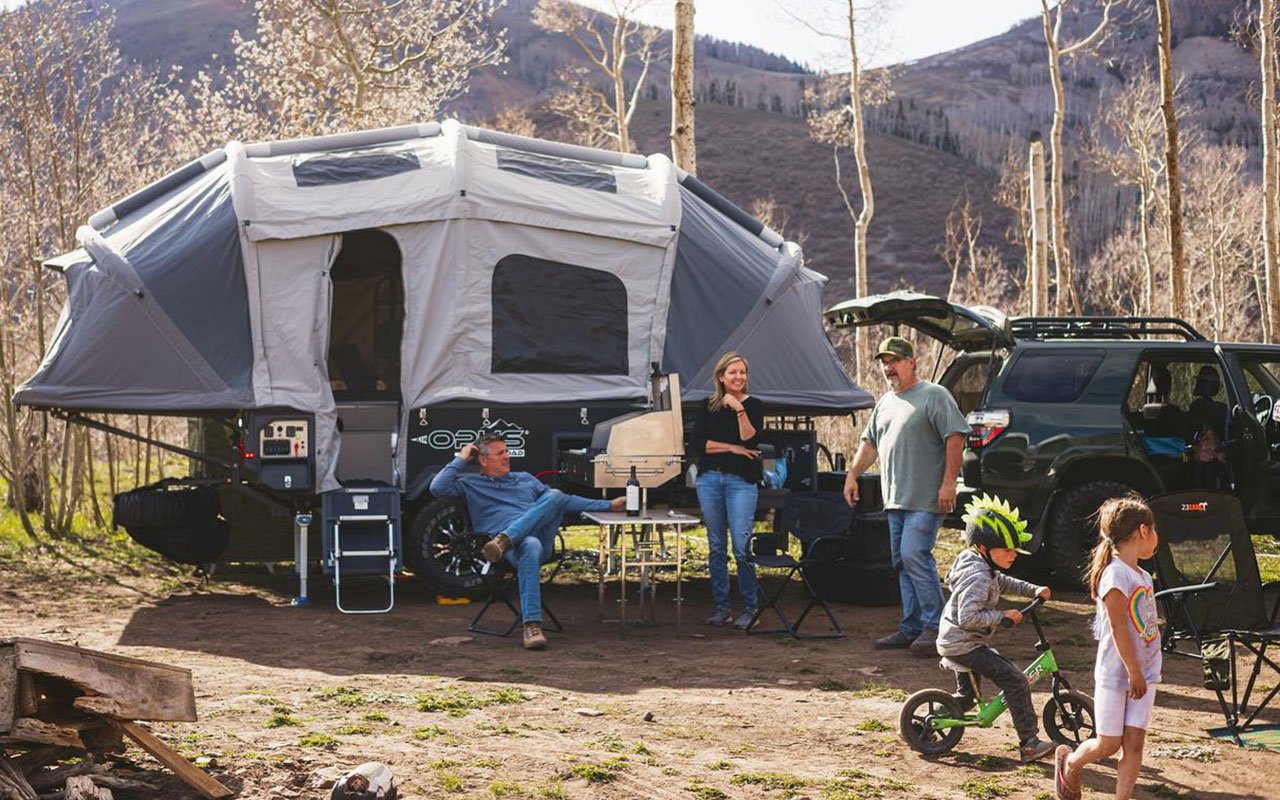
The external kitchen of the Opus OP4 makes cooking for the family easy. Photo courtesy of Opus Camper.
Features:
- Hitch weight: 400 lbs.
- Gross vehicle weight rating: 4,200 lbs.
- Unloaded vehicle weight: 3,100 lbs.
- Cargo capacity: 500 lbs.
- Exterior length: 17′ (closed)/ 21′ 4″ (open)
- Full exterior height: 5′ 4″ (closed)/ 7′ 10″ (open)
- Exterior width: 7′ 2″ (closed)/ 11′ 6″ (open)
- Freshwater capacity 40 gallons
- Cassette toilet
- Base MSRP: $27,999
Forest River Rpod RP153: Ultra lightweight
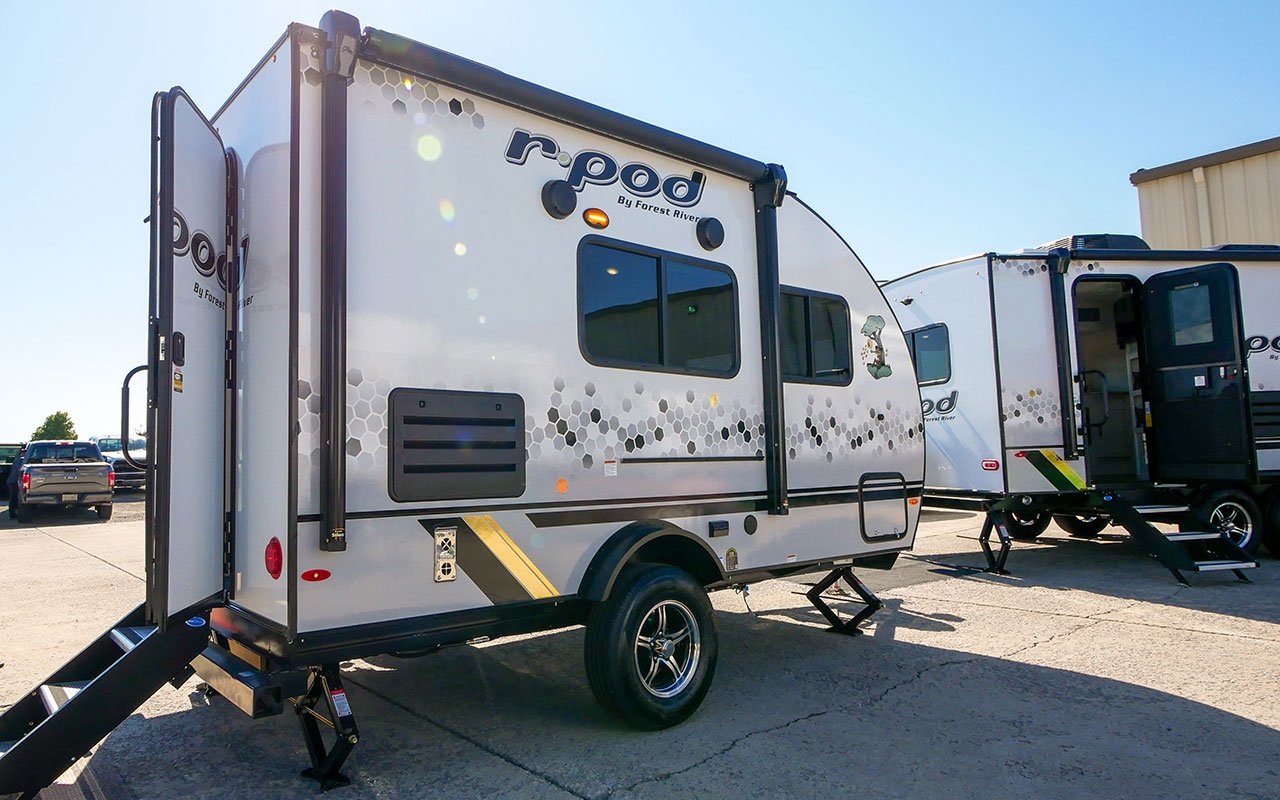
The 17-foot floorplan RPOD from Forest River is an ideal size for singles and couples. Photo courtesy of Forest River.
The RPOD is one of the best-selling ultra-lightweight travel trailers on the market. Forest River has expanded the line to seven models by adding a smaller version called the Rpod 153 . The 17-foot model has all the basic features of its bigger brethren, and its slightly smaller floorplan is ideal for singles and couples.
The rear bath is spacious, the galley very functional, and the Murphy bed in the front maximizes interior space. This is an RV camper that’s very well designed, appointed, and engineered. It’s a good match for half-ton pickups, midsize pickups, and SUVs.
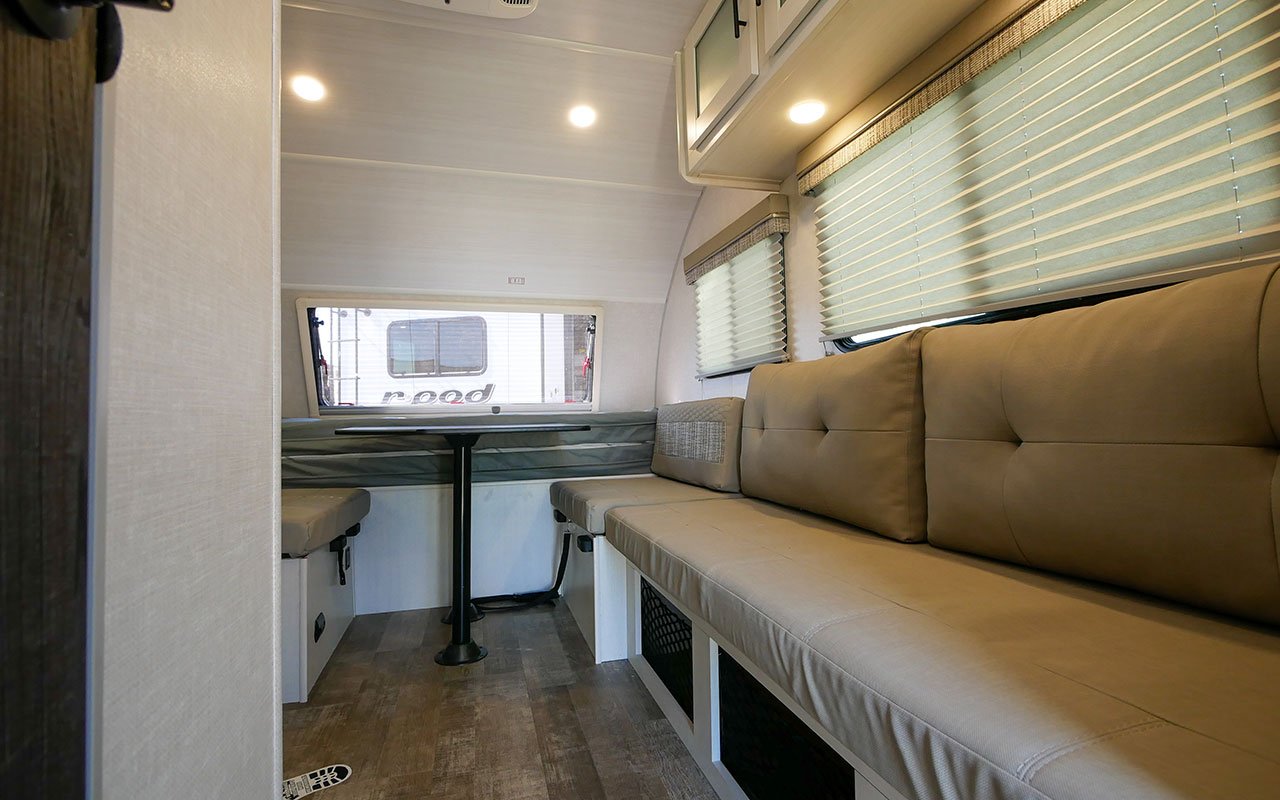
The 17-foot RPOD from Forest River is well-designed, appointed, and engineered. Photo courtesy of Forest River.
- Hitch weight: 300 lbs.
- Gross vehicle weight rating: 4,280 lbs.
- Unloaded vehicle weight: 2,880 lbs.
- Cargo capacity: 1,400 lbs.
- Exterior length: 17′ 3″
- Full exterior height: 9′ 8″
- Exterior width: 8′
- Freshwater capacity: 30 gallons
- Black-water capacity: 30 gallons
- 8′ awning
- Base MSRP: $25,500
2022 Rockwood Geo Pro 20FBS: Roomy and comfortable
Forest River’s spacious Rockwood Geo Pro 20FBS caught our attention. A walk-around bed is a real rarity in a single-axle travel trailer and a testament to the designers taking to heart what customers have been asking for in years past.
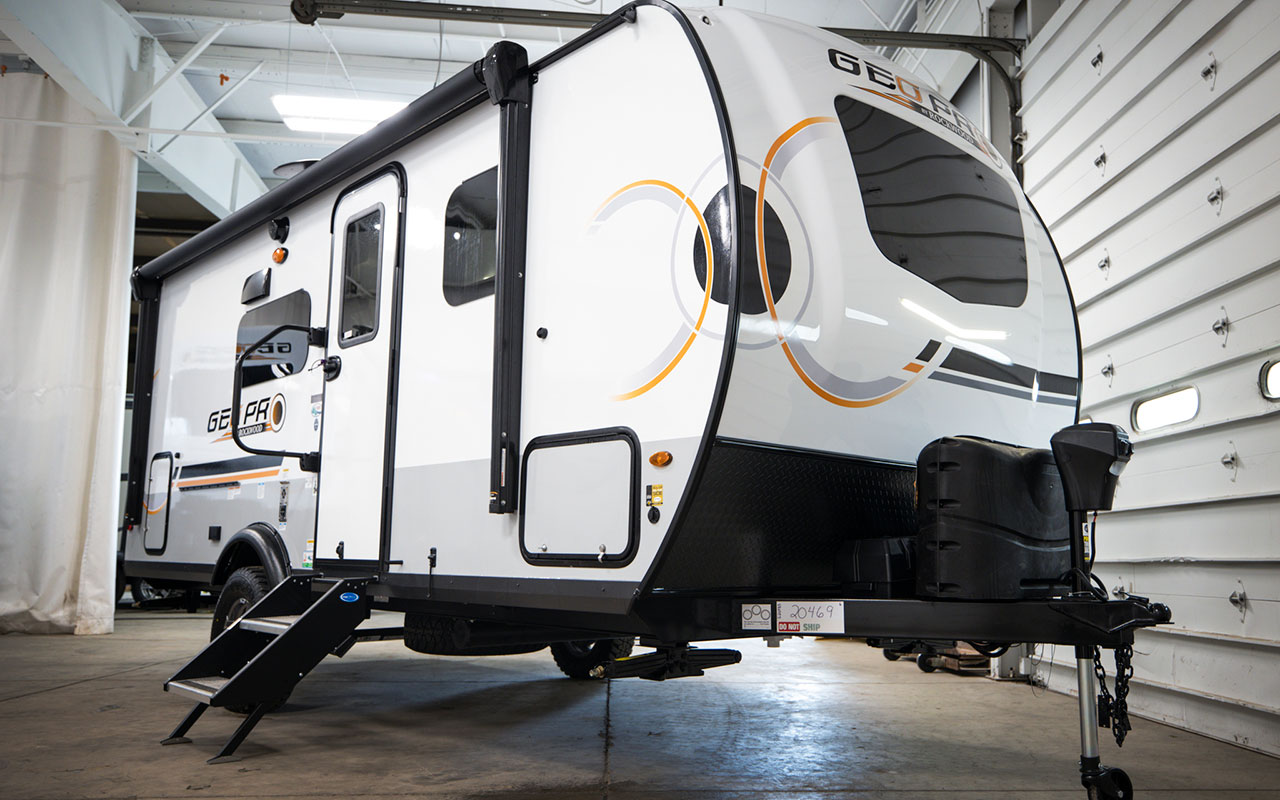
Forest River’s 2022 Rockwood Geo Pro 20FBS comes with a high-clearance axle setup and 15-inch Mud Rover Radial tires. Photo courtesy of Forest River.
The large bathroom across the rear of the RV has an oversized shower, and the 72-inch sofa in the slide-out can rotate into a comfortable hide-a-bed. The Geo Pros also come with a high-clearance axle setup and 15-inch Mud Rover Radial tires well suited for backcountry RV camping.
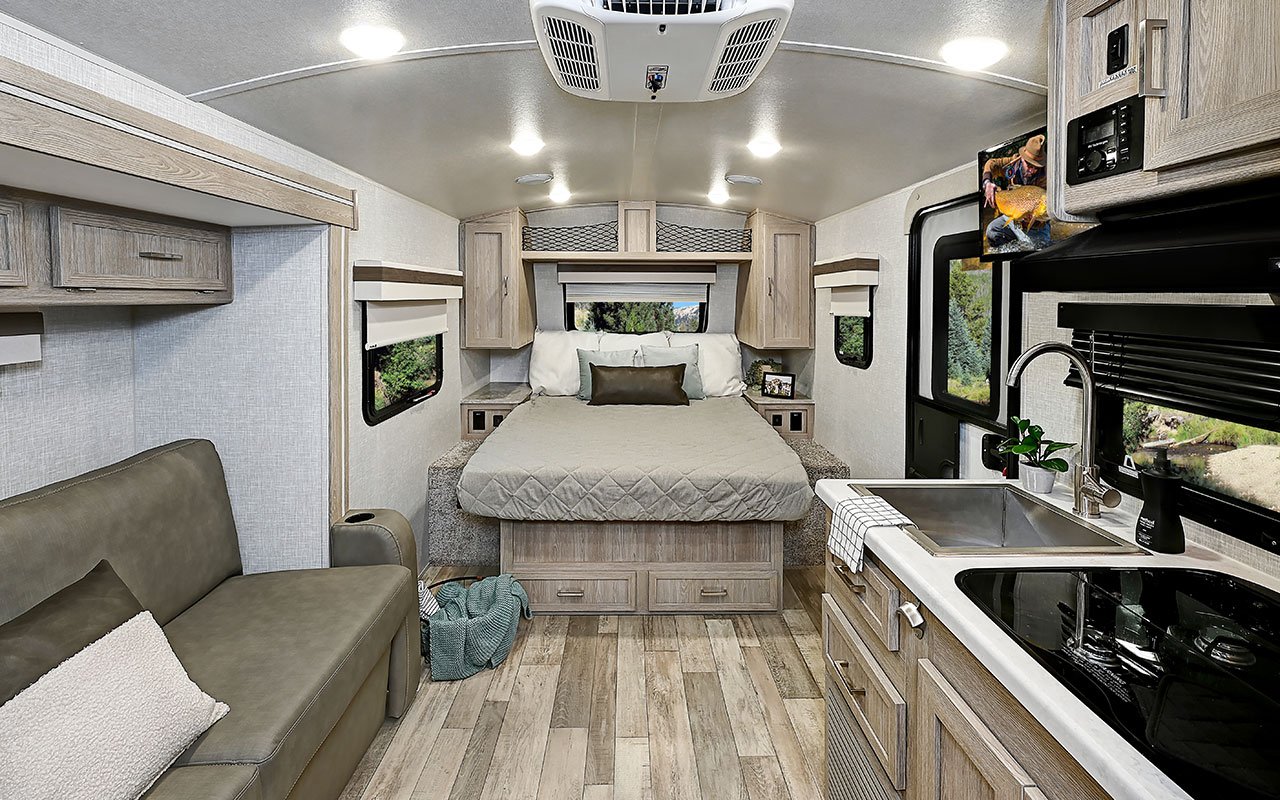
The 2022 Rockwood Geo Pro 20FBS has a walk-around bed, which is a rarity for a single-axle travel trailer. Photo courtesy of Forest River.
- Gross vehicle weight rating: 4,400 lbs.
- Unloaded vehicle weight: 3,442 lbs.
- Cargo capacity: 958 lbs.
- Exterior length: 21′ 8″
- Exterior width: 92″
- Freshwater capacity: 31 gallons
- 54″x74″ Full-size bed
- 14-foot awning
- Outside shower
- Tire pressure monitoring system
- Base MSRP: $32,675
That’s our list of the most innovative new lightweight travel trailers of 2022. These small RV models are big on affordability, convenience, and amenities.
As a bonus, the features are packaged in a small camper footprint. In most cases, you won’t need to purchase a tow vehicle for these trailers. To find out how much weight your car can pull, open your vehicle’s manual. Look for the maximum trailer towing capacity and you’ll find the answer.
Why lightweight travel trailers are in demand
If you’re thinking about buying one of these lightweight travel trailers, you’re in good company. Demand for big and small RV models is soaring.
For example, according to the latest issue of RV RoadSigns , the quarterly sales forecast published by the RV Industry Association (RVIA), RV manufacturers are still scrambling to meet consumer demand that started in 2020. This year, more than 600,000 new RVs will be sold. These figures are all-time high that will exceed the record-breaking RV sales of 2021.
“The remarkable production from the RV manufacturers and suppliers is nothing like we have ever seen before, and our new forecast shows the record-breaking streak will continue,” said RVIA President and CEO Craig Kirby.
Editor’s note: RV manufacturer materials costs are constantly increasing. The current base costs for the small, light travel trailers on our list may have changed since the time of this writing (Q4 2021).
Connect with other RVers
One of the best parts about RVing is engaging with the community of traveling enthusiasts. iRV2 forums allow folks to chat with other RVers online, and get other perspectives on everything RVing, including products, destinations, RV mods, and much more.
Related articles:
10 best lightweight travel trailers for 2023.
- 8 Best Small Pull Behind Campers For 2022
- A Look At The New 2022 Keystone Campers
You May Also Like:
Is a long distance rv purchase worth it to save money, when is the best time to buy a camper, the best luxury class c motorhomes for 2022, what type of rv is best for full-time living, 5 awesome benefits of owning a travel trailer camper, oliver travel trailers—luxury with a twist , 5 ridiculously tiny rvs from around the globe, an rv show all year round: a stress-free experience.

RV and automotive journalist Bruce W. Smith has held numerous editorial titles at automotive and boating magazines, and authored more than 1,000 articles, from tech to trailering. He considers his home state of Oregon a paradise for RVing and outdoor adventure.
6 thoughts on “ 10 Best Lightweight Travel Trailers Of 2022 ”
we kinda like our Roo 183…when folded out it is breezy and spacious…just sayin’
Hello, it isn’t only the lightweight important, an aerodynamical design is also important when I travel an electric car. For a long distance it’s good to reach 400 miles or more. It has to include WC with shower, cooking-place, refrigerator and a seat-corner for 4 persons.
Missed 3 other molded fiberglass super light weight and strong hold their value for years and years. Escape Trailer – Canadian, Scamp – Minnesota & Casita -Texas.
Many of “stick and staple” TT are very lightweight construction-wise and kinda ticky tacky and fall apart.
What are the best buys for trailers in the 25 to 30ft range.
Have in mind what features you like and know your GVWR (Gross Vehicle Weight Rating). I was told by a camper salesman to use 1000 lbs below your max as your guide to try to avoid going over. I type in rvtrader.com and enter in my my length wanted. Minimum 25′ and maximum 30′. I often set the “Sorted By” at oldest or lowest price. You can say you want a slide or no slide. See what comes up!!
Keystone Sprindale Mini 1800BH. Queen bed, 2 twin bunks, wifi stereo, solar, 12′ awing with lights, no slide out to break. Logical layout. Under $20k. 💕
Leave a Reply Cancel reply
Your email address will not be published. Required fields are marked *
Save my name, email, and website in this browser for the next time I comment.
Welcome! Please follow these guidelines:
- Be kind and respectful.
- Keep comments relevant to the article.
- Avoid insults, threats, profanity, and offensive remarks.
- Refrain from discussing gun rights, politics, or religion.
- Do not post misleading information, personal details, or spam.
We may hide or remove comments at our discretion.
I have read and accepted the Comment Guidelines and Privacy Policy *
Recent Posts

Browse By Category

- Find a Location
What Is the Best Couples Travel Trailer Under 30 Feet?

- Length: 26’9”
- Dry Weight: 5,578 pounds
- Cargo Capacity: 2,027 pounds
- Interior Height: 78”
Favorite Feature: Hidden Shelves
The Campsite Reserve 23CC features an L-shaped kitchen, a U-shaped booth dinette, a large rear bathroom, and a king-size bed. Even though it’s less than 27 feet long, it has everything you need for a comfortable weekend camping trip, including a tankless water heater, a backup camera, huge windows, and a water filtration system.
My favorite feature is the hidden shelving behind the television. Just pull out the entertainment center, and there’s plenty of storage for pantry items, kitchen gadgets, dishes, and more. The outside kitchen extends the cooking space, allowing you to enjoy grilling without hauling another piece of equipment.
East to West Silver Lake 2500RD

- Length: 29’10”
- Dry Weight: 6,098 pounds
- Cargo Capacity: 3,347 pounds
- Interior Height: 81”
Favorite Feature: Ample Interior Living Space
At just under 30 feet long, the Silver Lake 2500RD is one of the largest travel trailers on our list. Because of its size and one large slide-out, you’ll have plenty of room to entertain guests, enjoy a Friday night movie, or host the grandkids.
There’s a U-shaped booth dinette, jackknife sofa, and L-shaped kitchen in the main living area. In the front is a king bed and double wardrobes, as well as underneath and overhead storage. You won’t have any problems finding places for clothes, dishes, camping gear, and other necessities in this travel trailer. And because of its large cargo carrying capacity, you don’t have to worry about packing too many items.
Forest River Salem 22ERAS
- Length: 28’2”
- Dry Weight: 6,196 pounds
- Cargo Capacity: 1,489 pounds
- Interior Height: 80”
Favorite Feature: Huge Rear Kitchen
If you’re looking for a large kitchen in a small travel trailer, the Salem 22ERAS has it. My favorite feature is the massive L-shaped rear kitchen, which includes bar seating and ample counterspace. The double sink is also a nice amenity when cooking and cleaning up.
In addition, there is an oversized refrigerator, a full-height pantry, theater seating, and hidden shelves behind the entertainment center. The walk-through bathroom separates the main living space from the front bedroom, providing privacy if one person enjoys waking up early or if you invite over guests for a weekend campfire.
Keystone Cougar Half-Ton 25FKD

- Length: 29’11”
- Dry Weight: 7,130 pounds
- Cargo Capacity: 1,670 pounds
- Interior Height: 84” (at center); 78” (at edges)
Favorite Feature: Two Slide-Outs
With the two slide-outs, you’ll enjoy a spacious interior in the rear bedroom and front living area. The Cougar Half-Ton 25FKD includes a queen bed with a wardrobe and dresser for plenty of storage. Like a few of the other couple’s travel trailers under 30 feet, it also features additional storage behind the entertainment center.
The L-shaped front kitchen offers plenty of room for meal prep, and the booth dinette and tri-fold sleeper sofa provide two separate lounge spaces. If you’re hosting the grandkids for the weekend, they’ll enjoy privacy and space in this front living room. These features make this Cougar camper one of the best couple’s travel trailers.
East to West Alta 1900MMK

- Length: 25’
- Dry Weight: 5,463 pounds
- Cargo Capacity: 2,147 pounds
Favorite Feature: Murphy Bed
The Alta 1900MMK is the only travel trailer on our list with a Murphy bed. What I love about this floorplan is its day-to-night versatility. Enjoy two sofas for lounging during the day while the bed is tucked away. At night, it’s easy to bring down the queen Murphy bed and savor a comfortable night’s sleep.
This couple’s trailer also features a removable table for a simple dining space and a large countertop for meal prep. You won’t have any problem finding room for your coffee maker , Instant Pot, crockpot, air fryer, or other kitchen gadgets.
Rockwood Signature 8263MBR

- Dry Weight: 7,809 pounds
- Cargo Capacity: 2,056 pounds
- Interior Height: 86”
Favorite Feature: Large Rear Bathroom
While some travel trailers under 30 feet skimp on bathroom space, the Rockwood Signature 8263MBR prioritizes this part of the camper. It features a double vanity, a large shower with a seat, and space for two people to move about freely. This rear bathroom is a great selling point when searching for the best travel trailer for a couple.
I also love the spacious U-shaped kitchen with ample countertops that include bar seating. Because of this designated eating area, there’s no need for an additional dinette, keeping this travel trailer under 30 feet long. The slide-out in the living area also increases the interior space.
Keystone Bullet Crossfire 2530RDS

- Length: 29’8”
- Dry Weight: 5,670 pounds
- Cargo Capacity: 1,930 pounds
- Interior Height: 82” (at center)
Favorite Feature: Queen Bed
The Bullet Crossfire 2530RD is very similar to the East to West Silver Lake mentioned above. It has a large U-shaped rear dinette that comfortably seats two to four people and a tri-fold sofa for additional guest sleeping space.
But what I like most about this floorplan is the queen bed. Many new RVers underappreciate the value of a queen bed, as it creates more space to walk around the front bedroom. You’ll feel less cramped when you get ready in the morning and enjoy easy access to the side wardrobes and overhead storage compartments.
Forest River Wildwood 22RBS

- Length: 26’11”
- Dry Weight: 5,928 pounds
- Cargo Capacity: 1,837 pounds
Favorite Feature: Chaise Lounge
If you’re looking for a unique feature, you’ve found it in the Wildwood 22RBS . The chaise lounge in the central living area is the perfect place to hang out with friends, cozy up with a book, or watch the big game. While this couple’s travel trailer is under 30 feet, it doesn’t feel cramped.
There’s also a removable table, an entertainment center with a fireplace, an oversized fridge, and a walk-in pantry. The rear bathroom and front bedroom are pretty standard for couple’s travel trailers this size, but the main living space is truly unique.
Keystone Coleman Lantern 25REX

- Dry Weight: 6,270 pounds
- Cargo Capacity: 1,496 pounds
- Interior Height: 82”
Favorite Feature: Spacious Rear Entertainment Area
The Coleman Lantern 25REX offers a huge rear living area that’s perfect when you invite friends and family over. It’s also great for couples who enjoy movie nights or watching ball games. The entertainment center sits along the rear wall directly across from the theater seating.
Because of this spacious design, the kitchen doesn’t have as much counterspace as the others on this list. But you still have all the appliances and amenities you need for an enjoyable weekend camping trip. Plus, if you have a dog, this open area provides more room for you and your furry friend.
Jayco Jay Flight SLX 210QB

- Length: 25’8”
- Dry Weight: 4,195 pounds
- Cargo Capacity: 1,305 pounds
Favorite Feature: Lightweight and Compact
The Jay Flight SLX 210QB is one of the few couple’s travel trailers under 30 feet with no slide-outs. is the. While this means a smaller interior space, it also means no slide malfunctions or problems. It also means a more lightweight camper. If you’re looking for a camper under 5,000 pounds , this is an excellent choice.
Despite the small space, I love how Jayco has included h a dinette and a sofa. By removing the wall separating the bedroom from the living space, Jayco creates a more open feel with this travel trailer’s floorplan.
The kitchen is very small, with only a tiny countertop beside the sink, but if you prefer to cook on your Blackstone or a campfire, you won’t mind the smaller space. And even though this travel trailer is less than 26 feet long, you still get a full bathroom.
What Is the Best Sized Travel Trailer for 2 People?
If you want a lightweight travel trailer for couples, you’ll likely want something 25-30 feet long. Campers of this length provide options for folks who want to tow with SUVs , smaller trucks, or heavy-duty pickups.
However, if your tow vehicle can handle the added weight, a travel trailer with a slide-out or two will offer more interior space. Even for a couple, this extra space makes your trailer feel more like a home.
What Is the Best Truck to Pull a 30-foot Travel Trailer?
When choosing a camper, you always want to stay comfortably within your vehicle’s towing capacity .
The gross vehicle weight rating (GVWR) is the total weight an RV can safely handle based on its axles and tire ratings. If the GVWR exceeds your vehicle’s towing capacity, you need to upgrade the vehicle or choose a lighter camper.
Having said that, many travel trailers under 30 feet weigh less than 8,000 pounds, and some weigh less than 6,000 pounds. The towing capacity of a light-duty truck like a Ford F150 or RAM 1500 maxes out around 10,000 pounds, on average. Some models offer more towing capacity, and others offer less. Your towing capacity will vary depending on the year, make, model, trim, and aftermarket upgrades for your specific truck.
Learn more about choosing a vehicle to tow your camper in this article!
Traveling couples don’t need as much space as a family of six. But you still want ample room to move about freely without bumping into each other. And if you want to entertain guests, you need extra space. These travel trailers may be under 30 feet long, but they don’t lack the amenities or appeal!
Here are a few more resources you can use to compare these couple’s travel trailers to other options:
- Small Campers for Couples
- Half-Ton Towable RVs for Couples
- Class B Motorhomes for Couples
Besides length, what features are you looking for in a couple’s travel trailer? Let us know in the comments below!
Leave Your Comment Cancel Reply
Save my name, email, and website in this browser for the next time I comment.
Shop By RV Type

Your Adventure Awaits
Copyright © 2023 cwi, llc all rights reserved.
- RV Glossary |
- Privacy Policy |
- California Privacy Rights |
- Do Not Sell or Share My Personal Information |
- Targeted Advertising Opt Out |
- Terms of Use
Lighter in weight and secured with a hitch to the frame of your tow vehicle.
Full-sized campers, requiring the “5th wheel” U-shaped hitch to tow.
Can be a travel trailer or fifth wheel. Designed with a rear garage and opening for your “toys.”
- Heartland Difference & Innovations
- Factory Tours
- RV Lifestyle
The promise of adventure drives every RV journey. Nobody knows this better than us.
- Owner's Manual
- MyHeartlandRV App
- Owners Club & Forum
- FAQ's and RV Glossary
- How to Videos
- Towing Guide
- Apparel Store
Heartland Owners Club & Forum
The Heartland Owners Club is made up of RVers from all walks of life, all on different paths on their RV journey. The club holds regular rallies and events across North America and allows you to tap into a vast amount of information curated by experienced RVers.
- FIND A DEALER
*Manufacturer's Suggested Retail Price (also referred to as "MSRP", "Base Price" or the "Starting At" price) excludes destination/delivery charges, taxes, title, license and registration fees, dealer fees and total of options fees. Check with your local dealer for pricing.
Specifications
Exterior features.
- Super King Kong sized storage with pass-thru storage (N/A M180BH)
- Automotive grade painted aerodynamic front cap (N/A West Coast Models)
- Flip down exterior steps
- Glow in the dark graphics
- Power Awning with LED lighting
- Dual 20# LP tanks w/auto change over
- Underbed storage
- Cable ready hookup
- Bumper w/hose storage
- Dual Ducted A/C with curved ceiling for maximum height
- Gas/electric DSI water heater
- 12 volt FM radio with HDMI pass through
- 55 amp 12 volt power converter
- Forced air heated and enclosed underbelly
- Black tank flush
- 13,500 BTU air conditioner
- 50 Amp A/C prep in model M312 and larger
- Backup camera prep
INTERIOR FEATURES
- All New Master Chef kitchen with new Infinity edge countertops and stainless steel under mount sink
- Soft Glow backlit fascia (N/A M180BH)
- Newly designed entertainment center with hidden storage (most models)
- EZ Sweep Slideout Floors
- Tinted safety windows
- Hidden Hinges on cabinetry and Steel ball bearing drawer guides
- Finished and insulated pass-through storage, Slam baggage doors with magnetic latches (N/A M180BH)
- Friction hinge entry door
- Overstuffed residential furniture
CONSTRUCTION STANDARD FEATURES
- Painted front cap with LED accent lights
- Aluminum construction
- 2˝ Laminated sidewalls with Azdel
- Designer interior doors
Tires & Axles Standard Features
- Wide Traxx axle system
- Leaf spring suspension
- E-Z lube hubs
- Aluminum rims
KITCHEN STANDARD FEATURES
- Full height residential backsplash
- Deep bowl kitchen sink
- High Rise kitchen faucet
- Large double door refrigerator
Bedroom Standard Features
- Residential headboard
- Night shades
- Quick Store bed base (most models)
BATH STANDARD FEATURES
- Skylight in shower
- Power vent in bathroom
- Foot flush toilet
- Medicine cabinet
- Shower / Tub surround
STANDARD SAFETY FEATURES
- Fire extinguisher
**Manufacturer's Suggested Retail Price (also referred to as "MSRP", "Base Price" or the "Starting At" price) excludes destination/delivery charges, taxes, title, license and registration fees, dealer fees and total of options fees. Check with your local dealer for pricing.
Connect with a Product Specialist
Thinking about buying a new RV and have questions? We are here to help! Whether you have general questions about RVing or specific questions about our products, we have the answers or we'll do our best to find them for you.
Additional Notes
By submitting this form you are authorizing staff from Heartland RVs to contact you by e-mail and/or phone and to receive future communications from Heartland RVs.
Please make sure all fields are filled out and that you have clicked the authorization checkbox above.

IMAGES
COMMENTS
A 26-foot travel trailer generally has a dry weight of between 4,500 and 6,000 pounds and a fully loaded weight of between 5,000 and 6,500 pounds. Depending on the make and model of the camper and the amount of gear loaded into the trailer. If you're looking for a more detailed answer, though, keep reading. As we provide the dry weight, hitch ...
From the examples we could see that a 26 feet long travel trailer on an average weighs around 3800 lbs to 4150 lbs. A 28 feet long travel trailer weighs in the range of 4300 lbs - 4900 lbs. A travel trailer between the length of 32 feet to 38 feet weighs 7200 lbs - 8500 lbs. This should be enough to paint a fair idea of how a length of ...
Slide-Outs: 1. The Dutchmen Aspen Trail 2260RBS is another popular 26-foot floorplan, with an overall length of 26 feet 11 inches and a dry weight of 5,577 pounds. Geared more towards couples, the Aspen Trail 2260RBS provides maximum comfort for two, by offering a whole host of features that any couple would love.
How Much Do Average Travel Trailers Weigh? ... to the amount of weight that's put on the trailer ball itself—usually about 10 percent of the trailer's dry weight. For example, if you're towing a 26-foot trailer, you can expect the dry hitch weight to be between 500 and 550 pounds. Towing Capacity Breakdown . Label:
Another disadvantage of a longer travel trailer is the total weight. Once you get up to 30 or more feet and 7 to 8,000 pounds you will need a 3/4 ton or 1-ton truck to tow it. ... 2023 April 26, 2023. Imagine opening up your RV just to de-winterize it, but what you see are mice! Yuck!!
How Much Do Travel Trailers Weigh? [20 Campers Compared] Based on our sampling of 20 popular models we estimate the typical travel trailer weight to be 4,384 pounds dry weight and 6,109 pound GVWR (Gross Vehicle Weight Rating). Dry weight means how much the travel trailer weighs without cargo, and all tanks (water, propane, etc.) completely empty.
However, if you want a massive 26′ trailer, don't stress your mini-SUV by pushing the limits of your tow capacity. In general, a truck or other vehicle that advertises it can tow 7,200 pounds (3,250 kilos) is adequate for towing most trailers under 24 feet. ... Travel trailer is dry weight of 6440. We dont carry water in tank. Just hubby ...
Some larger travel trailers only weigh about 4,500 pounds, but the largest are around 9,000 pounds. 5th wheel camper trailers weigh even more. When fully loaded with cargo, supplies and fluids, the gross vehicle weight rating of a travel trailer can vary from 6,300 to 10,500 pounds. The average cargo capacity of a bumper pull travel trailer is ...
26.8' 5,215: 191.43 *Weights listed as dry weight are empty from the trailer manufacturer ... Our travel trailer dry weight is 3,700 pounds, add 258 pounds for a full tank of water, 500 pounds of accessories (batteries, awnings, propane, etc) 500 pounds of gear (bbq, chairs, generator, gas, power cable, etc.) and another 250 pounds for food ...
The average weight of a travel trailer is between 1,200 to 8,700 pounds and up. You'll need a heavy-duty pickup truck like a Ford F-150 or a Nissan Titan XD to haul that much weight. An SUV is also a suitable towing vehicle. In today's article, we'll tell you everything you need to know about travel trailer weight.
The average weight of your travel trailer will vary depending on the type of trailer you have and how long it is. Larger and longer campers tend to be heavier, while teardrop and pop-up campers are on the lighter end of the scale. Most campers have an average dry (unloaded) weight of 2,550 to 6,600 pounds, and an average GVWR of 3,200 to 8,400 ...
Starting at $42,855. The 2022 Jay Feather's lightweight, rock-solid fiberglass construction features two distinct interior design concepts to choose from with new fixtures and flooring throughout. Whether you're looking for a smaller camper with lots of sleeping space or luxurious amenities in an easy-to-tow trailer, there's a Jay Feather ...
The 26DBUD is the perfect family travel trailer, with double bunks at one end and a queen bedroom at the other. You also get a fireplace (heater), full kitchen with glass-fronted cabinetry and large pantry, a U-dinette, and the customizable Versa-Lounge with Stow N Go Storage. ... UVW (Unloaded Vehicle Weight)*- is the typical weight of the ...
Before the travel trailer is ready to travel on the road, this is the basic structural weight. The typical dry weight of a travel trailer ranges from approximately 1,000 to 9,000 pounds, but as a rough guide, the average camper container's dry weight is around 5,200 pounds. Towed units, as contrasted to self-driving modules, will be lighter ...
Travel Trailer Find complete specs, manufacturers brochures and info for Travel Trailer RVs from 2008 to present. ... With high-end luxury models as well as lite-weight teardrop models to choose from, prices range from $9,000 to $76,000. Airstream RVs. Bambi. Available Years: 2024, 2023, 2022, 2021, 2020 ... 26. Coleman Rubicon. Available Years ...
1,545 Lbs (Unloaded Vehicle Weight) - 13 Feet - 2019 10RK Hummingbird Trailer. 2,860 Lbs (Batteries and LPs Included) - 16 Feet - 2018 Sport 16RB Trailer. 2,980 Lbs (Unloaded Vehicle Weight) - 19 Feet 10 Inches - 2019 17RK Hummingbird Trailer. 3321 Lbs - (Shipped Weight) - 21 Feet 5 Inches - Keystone 175 LHS Single Axle Trailer.
Average Weight: 3,000 - 8,000 lbs. Description: Large flatbed trailers are versatile and used for transporting heavy and oversized cargo. The weight of these trailers depends on their size and load capacity, with larger flatbeds being heavier. Dump Trailer Weight. Average Weight: 2,500 - 8,000 lbs.
The board must be at least 3-1/2 feet long for this trick to work. 3. Place The Bathroom Scale At One End And A Brick At The Other. Place the bathroom scale roughly 2 feet in either direction from the trailer tongue, and a block or brick about 1 foot from the trailer tongue in the opposite direction of the scale.
These easy-to-tow 10 lightweight travel trailers for 2024 pile on the amenities without scrimping on comfort, quality and value. ... Travel trailers with a gross vehicle weight rating ... Winnebago unveiled the entry-level M-Series line of 26-foot compact lightweight travel trailers in late September to rave reviews. The 2326RK, the largest of ...
14. Small Travel Trailer Small Travel Trailer. A small travel trailer can weigh anywhere between 1200 and 3900 pounds when empty, given that it isn't longer than 22 feet. On average, trailers in this size range weigh about 2800 pounds when empty. Unlike A-frames and pop-up campers, these trailers don't tend to have a lot of capacity for ...
Which this Lance 26-foot travel trailer floor plan does a great job of, as this small camper with bunks offers rear bunk beds, ... Added Weight: Slide-outs add considerable weight to a travel trailer, often around 800 pounds, which decreases fuel efficiency and can require a larger tow vehicle.
There are several, most likely hundreds of different Jayco travel trailers that measure to be 26' long so the answer to your question is going to be dependent on the year and floorplan of the trailer. There is not a standard dry weight for all 26' long Jayco travel trailers. For example, a 2019 Jayco Jay Flight 21QB is around 26' long and has a ...
Top 10 Picks For Lightweight Travel Trailers (Under 5,000 Pounds GVWR) 2022 TAXA TigerMoth Overland: The Ultimate Overlanding Vehicle. 2022 Travel Lite RV Rove Lite: Lightweight And Easy To Tow. 2022 Little Guy Micro Max: Fits In Standard Garages.
Length: 29'10" Dry Weight: 6,098 pounds Cargo Capacity: 3,347 pounds Interior Height: 81" Favorite Feature: Ample Interior Living Space At just under 30 feet long, the Silver Lake 2500RD is one of the largest travel trailers on our list. Because of its size and one large slide-out, you'll have plenty of room to entertain guests, enjoy a Friday night movie, or host the grandkids.
Travel Trailers. Lighter in weight and secured with a hitch to the frame of your tow vehicle. Fifth Wheels. Full-sized campers, requiring the "5th wheel" U-shaped hitch to tow. Toy Haulers. Can be a travel trailer or fifth wheel. Designed with a rear garage and opening for your "toys." Help Me Choose My RV. Shopping. Back. Shopping
The Airstream Flying Cloud 26RB Travel Trailer is a purposefully designed trailer with intentional features to help you maximize your travel experiences. Prepared for families of all sizes and built for comfort to any destination, Flying Cloud is a feature-packed travel trailer that can go the distance and is a canvas waiting to be painted with ...